





















This month, Business Network is looking to the stars as we showcase the region as a growing centre for space sector R&D and manufacturing. Government figures suggest something like 200 East Midlands academics teach within the sector, while 20,000 students are on relevant courses – from physics and astronomy to maths, mechanical engineering and computer science.
That's a huge resource, and it's no surprise that many of the start-ups coming out of our universities have been looking into the opportunities that space presents.
Right now, there are a wealth of relatively new SMEs involved in everything from monitoring global air quality from space to planning cheap and effective mobile communications for the developing world, to designing small nuclear reactors that, in just a few years, could be powering a base on the moon or propelling a rocket to the Red Planet.
Just think about that for a second. A small nuclear power plant made in the East Midlands could soon provide the energy for a habitat on the moon. How's that for export potential?
Work designing that micro-reactor is currently taking place at Rolls-Royce in Derby and Leicester, building on the decades of experience the engineering giant has in building reactors for our nuclear-powered submarines.
The demands are similar – making a safe, efficient source of energy that is reliable in the most extreme conditions. But the practicalities between designing something to be used underwater and something that can work in space are worlds apart.
You can read all about it, and the scope of the challenge, in our Big Interview with Katie Jarman, assistant chief engineer for space. It's fair to say that she's excited about the project, and with good reason.
We also look at the developments going on in Space Park Leicester, the £100m workspace that builds on the 60-or-so-years that Leicester University has played in the space race, notably helping design parts for satellites. It's a significant heritage.
Leicester is at the heart of much of the work going on in the UK space sector and Space Park Leicester houses laboratories, workshops and calibration facilities which are allowing researchers to expand work in machine learning and Artificial Intelligence and work on building new types of affordable satellites.
It's a facility we should all be proud of.
Tom Pegden, Editor, Business Network

Editor Tom Pegden
T: 07816 347 451 E: marketing@emc-dnl.co.uk
Contributor Jasmine Thompson
All Submissions
E: magazine@emc-dnl.co.uk
Chamber Membership
E: membership@emc-dnl.co.uk
Follow the Chamber
W: www.emc-dnl.co.uk
Twitter: @EMChamberNews
and promotional opportunities within this publication to Chamber members and prospects.
Whenever we process data for these purposes, we always ensure we treat your Personal Data rights in high regard. If you wish to, you can visit www.kempspublishing.co.uk to view our full Privacy Notice and to learn more
Publishers Kemps Publishing Ltd
8, The Courtyard, 707 Warwick Road, Solihull, B91 3DA
T: 0121 765 4144
w: www.kempspublishing.co.uk
Managing Editor Laura Blake T: 0121 765 4144 E: laura.blake@kempspublishing.co.uk
Designer Lloyd Hollingworth
Advertising T: 0121 765 4144
E: jon.jones@kempspublishing.co.uk
Printers Warners (Midlands) plc
every care has been taken to ensure that the information it contains is accurate, neither the Chamber nor the publisher can accept any responsibility for any omission or inaccuracies that might arise. Views expressed in the magazine are not necessarily those of the Chamber. This publication (or any part thereof) must not be reproduced, transmitted
MAY 2024
NEWS UPDATE
4MEMBER NEWS
Observatory improvement work continues
28APPOINTMENTS
Tax firm appoints managing partner
THE BIG INTERVIEW
31 Katie Jarman, assistant chief engineer for space at Rolls-Royce
36 STRATEGIC PARTNERS AND PATRONS
Residents worried about flood risk
38CHAMBER NEWS
Highlights of this year’s East Midlands Manufacturing and Trade Conference
EVENTS
52 Transplant Games coming to Nottingham
SUSTAINABLE
56 Funding helps research into green transport
INTERNATIONAL TRADE
58 BCC report backs export and investment
POLITICS
60 Lifeline for threatened train factory
FEATURES
62HOTELS, CONFERENCING & EVENTS
Creating a sustainable event
68 Hotel or conference centre –which is best?
72FOCUS
A comprehensive round-up of the region’s role in the UK space sector
78GROWING YOUR BUSINESS
Hospitality industry must be innovative
82 Taking your business to the next level
DIGITAL & TECHNOLOGY
84 Crucial AI application for aerospace
BUSINESS SUPPORT
86LEGAL
Law Society unveils awards shortlist
88FINANCE
Funding package boost for healthcare firm
92SKILLS
Website collaboration earns award win
94PROPERTY
Agents relocate headquarters to Pride Park
96MOTORING
Nick Jones drives the new Dacia Duster
THE LAST WORD
98 Chamber president Stuart Dawkins on why space travel will always inspire


The co-founder of people consultancy Talk Staff has stepped down as its chief executive to become a non-executive director and spend more time on his charity work.
Gary Parsons, one of the key driving forces behind the company’s growth, said he wanted to put more time into keynote speaking and his work to break the stigma of mental health and wellbeing in leadership.
Managing director David Orange and operations director Richard Stokes will remain in their positions.
The business was initially launched as a recruitment agency by Gary and David in 2009, and within a year began morphing into a broader people consultancy, expanding its services supporting businesses.
In 2022 Talk Staff – which has offices in Belper, Nottingham and Derby – doubled in size following the acquisition of organisational consultancy Designed4Success.
In a statement it said: “For Gary, stepping down as CEO is far from stepping back. It’s about stepping differently – into roles that promise not just personal growth but the chance to contribute on a larger scale. His passion for breaking the stigma of leadership mental health and wellbeing will see him take to stages across the UK to share his wealth of experience, insights, and lessons learned with a broader audience.
“His commitment to the topic underscores a deep-seated belief that business founders and their directors should be heard, especially when leading companies through difficult and exciting growth periods that benefit their employees and the broader economy.
“In 2021, after living with Bell’s Palsy since the age of 18, Gary broke his silence and revealed the impact that this has on his health –physically and mentally.
“He navigated this challenge, all while founding, growing and expanding the extremely successful Talk Staff in a highly competitive environment.”



Work is continuing on improvements to Sherwood Observatory.
The plans for the site will create a world-class facility that will rival those elsewhere in the UK. The observatory, in Coxmoor Road, Sutton-in-Ashfield, sits alongside a Victorian subterranean reservoir which will be sympathetically transformed into an education and exhibition space.
The original features of the reservoir, such as the intricate brick arches, will be kept to preserve the history of the building.
The construction project is part of Mansfield and Sutton Astronomical Society and Ashfield District Council’s development to create a Science Discovery Centre and planetarium at the observatory. The project is one of 16 being funded by Ashfield District
Council’s £62.6m Towns Deal.
Council regeneration, growth, and planning lead Cllr Matthew Relf said: “It is incredible to see the steel work for both the planetarium and the Science Discovery Centre in place.
“We are all getting really excited now that we can see the final footprint of the building. This project is one that will truly benefit the entire district, attracting visitors from across the county and beyond.
“When combined with the council’s other projects you can see our vision for the future of Ashfield – a place with a thriving visitor economy, and a great place to work, live, and learn.”
Council leader Cllr Jason Zadrozny said: “The speed of the progress on site at Sherwood Observatory is fantastic.
“This project is exciting and
One of the UK’s biggest food-on-the-go suppliers has completed the acquisition of a sandwich manufacturer.
Samworth Brothers first bought a minority stake in The Real Wrap Company in 2023, and has now acquired the remaining shares in the business.
The Real Wrap Company was founded in 2012 and has sites in Avonmouth and Aylesbury, supplying the education, healthcare, travel and business sectors.
Melton Mowbray-headquartered Samworth Brothers can trace its roots back to the 1800s and is behind brands including Ginsters pasties, Soreen malt loaf and Walker and Son Pork Pies.
Samworth Brothers group chief executive Hugo Mahoney said: "Food To Go has been a tremendous success story for Samworth Brothers in recent years, and we believe the category is well-positioned for growth.
“The Real Wrap Company is a dynamic, innovative young company that shares our values and focus on quality foods.
“Real Wrap has great future potential, and the capability and scale of Samworth Brothers will help support further development for The Real Wrap Company business.”
‘We are all getting really excited now that we can see the final footprint of the building’
innovative and will make a difference to the children living in Ashfield.
“They will get to experience a world-class educational centre right here on their doorstep, the power of this cannot be understated.
“One of Ashfield District Council’s aims is to improve skills and employability and having a centre like this here will help inspire the next generation of engineers and scientists.”
The planetarium is being built


next to the Science and Discovery centre, that sits on top of and within the reservoir, and will immerse visitors in space with a wraparound experience. Mansfield and Sutton Astronomical Society, which owns the observatory, runs outreach programmes with schools, visits for adult and children’s groups, public open events and night schools, and the new building will allow them to expand that work.
Planetarium project manager Steve Wallace said: “Recognising that we can inspire the next generation of employees and entrepreneurs, we would love more businesses to get involved.
“The project team have developed a pledge list for those who share our vision, so please get in touch and add your name to this fantastic project.”




Rolls-Royce is launching the next stage of its plans to design and build a micro-nuclear reactor to provide energy for a future moon base and potentially help power a rocket to Mars one day.
The Derby engineering giant – which has decades of experience designing, building and maintaining reactors to power the UK’s nuclear-powered submarine fleet – has won funding from Phase 2 of the UK Space Agency’s International Bilateral Fund.
The £1.18m of support means the Derby-based business will be able to build on its current partnerships within the UK space sector and with other countries working on space programmes.
It will be used to back collaborations that can help identify and advance the best ways to build a fission nuclear system that can work in space – benefitting both UK and US space nuclear development programmes for future missions.
Rolls-Royce is working with US nuclear engineering specialist BWXT Advanced Technologies – which builds the systems that power the American Navy’s submarine and aircraft carrier fleet –on the next phase of development.
An agreement between the two companies means they will be able to share their design and manufacturing strengths to develop new nuclear applications for space.
It follows an Atlantic Declaration commitment made by Rishi Sunak and Joe Biden last June, pledging that both countries will study “opportunities for co-operation on space nuclear power and propulsion.”
BWXT has been making nuclear components for more than 70 years, complementing Rolls-Royce’s similar years of experience in the UK.
Steve Carlier, president for Rolls-Royce Submarines – the subsidiary overseeing the UK work – said: “We are delighted to win the award for the second phase of the International Bilateral Fund and to be continuing our collaboration with the UK Space Agency and our international project partner BWXT.
"The Teaming Agreement between Rolls-Royce and BWXT brings together more than 130 years of safe and secure nuclear delivery on both sides of the Atlantic.
“This new agreement builds on our complementary core competencies and market knowledge from our respective countries.
“This enables us to build upon our existing relationship and explore potential strategic relationships and business arrangements to further develop nuclear technologies and products for Space.”
‘This new agreement builds on our complementary core competencies and market knowledge’
BWXT president Joe Miller said both companies shared a commitment to delivering nuclear energy systems to not just explore space, but also “support global security imperatives and generate clean energy”.
NASA wants to have the first woman, first person of colour back on its surface in 2026 and have astronauts based on the lunar South Pole by the 2030s.
Nuclear power has the potential to dramatically increase the duration of future space missions and their scientific value by providing efficient energy for communications and life-support.
Professor Anu Ojha, director of championing space at the UK Space Agency, said: “Innovative technologies such as this one could pave the way for continuous human presence on the moon, while enhancing the wider UK space sector, creating jobs and generating further investment.”
• Read our Big Interview with Rolls-Royce nuclear innovation manager Katie Jarman on page 31.

Behaviour change marketing agency MacMartin has relocated to the grounds of Ednaston Park Business Centre between Derby and Ashbourne.
The company, which was based at Needwood House in Burtonupon-Trent, took the decision to move to be part of the professional business community – and because of the picturesque grounds.
‘Their team perfectly complement our diverse, growing business community’
The business, run by sisters Anna Hutton and Claire MacDonald, started in 2017 and now has a small team of creative experts involved in delivering campaigns for clients such as the Staffordshire Police Fire and Crime Commissioner and the YMCA.
Gina Connett, facilities manager at Ednaston Park Business Centre, said: “We are delighted to welcome MacMartin to Ednaston Park Business Centre.
“Their team perfectly complement our diverse, growing business community here. We look forward to watching MacMartin
prosper within the beautifully unique surroundings that Ednaston Park has to offer.”
Set in 18-acres of landscaped gardens, Ednaston Park was built in the 19th century. Until 2016 it housed the St Mary’s Nursing Home and was bought by Clowes Developments in September 2017.
Since then, the developer has invested in the property to turn it into modern office accommodation, combining contemporary styling with many of the building’s original period features.
Ednaston Park now has 32 office suites as well as meeting rooms, a break-out area and landscaped gardens.
In 2022, Clowes demolished the old nunnery living quarters at the back of the main building to create a further three units known as Ednaston Mews, which are fully occupied.
Next to the business centre is the newly refurbished Ednaston Barns which has three units with a private landscaped courtyard, parking with EV charging points, floor-to-ceiling ground floor windows, patio doors off the open plan kitchen, spacious private entrance, glass staircase, a security alarm system and key fob access to each unit.

National financial planning business Wren Sterling has completed its first acquisition of 2024 with a deal for TW Financial Planning.
Based in Newcastle-under-Lyme, TW Financial Planning has three financial planners, who look after around £265m on behalf of its 750 clients. The TW Financial office will join Wren Sterling’s national office network, boosting its physical presence in the Midlands.
It means Wren Sterling now operates from 13 offices covering 11 locations across the UK with plans for future deals to grow its network.
Chief executive James Twining said: “This deal ticks a lot of boxes for Wren Sterling.
“TW Financial Planning is a self-sustaining business borne out of close working relationships with professional introducers and has grown through client referrals and a strong local reputation.
“Our investment in technology and our central resources, including our Investment Committee, will do some of the heavy lifting that comes with running an advice business and allow the team to focus on client work, which is what they do best.”


Midlands accounting and advisory firm PKF Smith Cooper has acquired West Midlands insolvency boutique BLB Advisory – with BLB’s director and owner Brett Barton and seven team members also joining the firm.
The acquisition sees PKF Smith Cooper’s business recovery and restructuring (BRR) team gain new members as an additional three offices in the West Midlands.
Brett Barton has almost 30 years’ experience in helping businesses, specifically SMEs and owner managed firms, find solutions to their financial difficulties.
During his career, Brett has developed substantial knowledge of the West Midlands, working with business owners across the region in a wide range of sectors, with specialist experience in
manufacturing, third sector, transport and haulage, retail and wholesale, and hospitality.
His new role at PKF Smith Cooper will see him continue to deliver his current services in Coventry, Hereford and Worcester, in addition to supporting the firm’s BRR partners – head Dean Nelson along with Michael Roome and Nick Lee. They have ambitious expansion plans for the Midlands and UK.
Dean Nelson said: “We are thrilled to welcome Brett and his team to PKF Smith Cooper as we embark on this new era for our business recovery services.
“From initial conversations with Brett, it was clear he was aligned with our recovery first approach, and that his team shared our passion for helping business owners in distress to secure the best
possible outcome for the future.
“Acquiring BLB Advisory Limited has strengthened our renowned team, increasing the breadth of our expertise, as well as our capacity to respond to the high demand for specialist support required from businesses struggling in the current climate.”
Brett Barton said: “I am excited to be joining the team at PKF Smith Cooper and to expand their offering in the West Midlands.
“There are many synergies between our businesses, and I believe that, within the PKF Smith Cooper brand, I will be able to provide advice and guidance to businesses across the region that is unparalleled.”
PKF Smith Cooper is the home of PKF in the Midlands and covers Derby, Nottingham, Birmingham, and Ashbourne.
Aresin flooring company which uses recycled plastic in its installations has opened its new premises in north Leicestershire – in a move which will futureproof the firm for years to come.
Abacus Flooring Solutions has tripled the size of its unit by moving from its current site in Coalville to new 3,000 sq ft premises in Belton Road, Loughborough.
‘The feeling of pride we all hold is immeasurable’
The business has invested £50,000 renovating the premises and bought its first forklift, which will be driven by project manager Beth Rogers who recently gained top marks in her driving exams.
The six-week renovation project has seen the team create a unit within a unit, adding a canteen, cloakroom, new kitchen and toilets and racking.
Following its launch by managing director Nick Megson in 2020, Abacus Flooring Solutions grew to a £1m-plus turnover
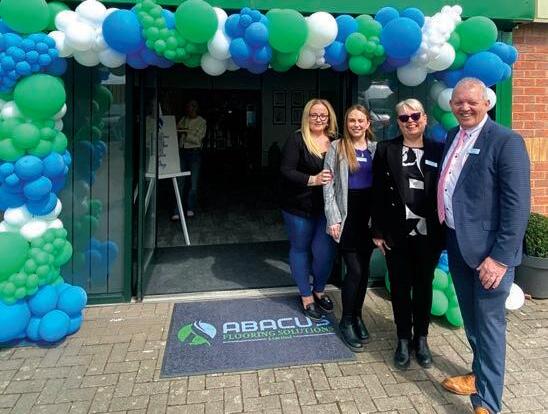
business in 2023 and hopes to break the £2m barrier by the end of this year. The company’s success is largely down to an innovation developed by Nick called Abaplas –a resin flooring system that uses 100% recycled waste plastic as a bulking material instead of the traditionally used silica sand, which is damaging to human health and the environment
The firm’s expansion will also see the launch of a new umbrella company called Abacus Materials, which will consolidate the trading and handling of all recycled plastics and resin flooring systems.
Nick said: “Opening our new premises today was truly overwhelming.
“The support we have received –especially from Charnwood
Borough Council has been brilliant and although we have been working 12-hour days to get the premises ready for our grand opening party, we are delighted with the end result. The feeling of pride we all hold is immeasurable."
To mark the occasion, the team held a grand opening party last month, which was attended by 100 guests. Representatives included members from East Midlands Chamber, Loughborough University's Innovation Centre, as well as Loughborough MP Jane Hunt, The Mayor of Charnwood and customers, suppliers and charities supported by the firm.
Nick added: “After winning multiple awards, mostly as a result of the Abaplas invention, we are now making great strides in the global market as well as here in the UK.
“People have quickly caught on to the fact that Abaplas is hugely sustainable; it cuts the carbon emissions produced by the heavy mining of silica sand as well as preventing vast quantities of waste plastic ending up in landfill or the world’s oceans. Sports stadiums have been a huge customer for us this year, and we expect this to continue.”


Plans to restore Derby’s Guildhall Theatre and enhance Derby Theatre have taken a big step forward as part of a major investment.
Derby City Council’s cabinet has agreed to split £20m of Levelling Up Funding between the two theatres under plans the council hopes will generate an additional £2.7m per year for the local economy.
The £10m allocated to the Guildhall Theatre will contribute to restoring the Grade II listed building to its former glory so that it can once again welcome audiences.
Those plans will include a new front-of-house experience with a better foyer, as well as a new ground floor cafe and box office opening onto the Market Place.
The auditorium will be remodelled to increase the seating capacity to around 280.
Back-of-house facilities will be renovated to make the venue more accessible. Other improvements include refurbished dressing rooms
and a new service lift.
A new courtyard will also be included, next to Derby’s historic Market Hall, which is due to reopen in the spring of 2025 following major renovations.
‘We’re on a mission to put culture at the heart of our city’
Cllr Nadine Peatfield is deputy council leader and city centre, regeneration, culture and tourism lead.
She said: “By bringing the Guildhall Theatre back into use, we can not only restore one of our historic buildings but create more space for community-led arts groups to perform right in Derby’s cultural heart.
“We’re on a mission to put culture at the heart of our city, bringing pride to our high streets, and attracting further investment into the city. Change is coming and what is planned for Derby’s Market Place is truly exciting.”

Derby Theatre’s £10m allocation will enable the theatre and the University of Derby to complete phase one of its New Horizons project, delivering a new accessible studio theatre and a Learning and Research Hub.
The new hub will allow the theatre and university to develop undergraduate and postgraduate support in a professional theatre.
Sarah Brigham, artistic director and chief executive of Derby Theatre, said: “These are exciting times for Derby Theatre as we continue to trailblaze new ways of training the next generation of professionals and creating high quality theatre for our communities.
“We are known for working directly with people from all backgrounds to release their
creativity and this first phase of expansion on our current site will allow us to do even more of that.
“I'm excited that as we approach our 50th birthday we are adding a new auditorium to the site and our longer term plans will see a refreshed front of house and backstage facilities.”
The Guildhall restoration works are currently planned to begin on site in summer 2025 and be completed in late 2027.
The Guildhall already needed £10m of repairs to prevent the building falling into disrepair. In total the extensive restoration is expected to cost £24.55m, which will be funded by a combination of the £10m from the Levelling Up Funding and £14.55m from the council’s capital budget.
The next phase of a multi-millionpound project to regenerate Chesterfield town centre is set to get underway this summer.
Chesterfield Borough Council’s ‘Revitalising the Heart of Chesterfield’ project – which has already seen work to refurbish the Stephenson Memorial Hall, as well as improvements to Packers Row –will transform the look, feel and flow of key public spaces.
It is expected that work to revamp the town’s historic market place, which includes New Square and Market Square, will start in summer.
Key improvements will include:
•Market Square – the historic market will be revitalised – with a new layout to make it easier to walk around, new stalls with modern facilities for traders, and vibrant new canopies in heritage colours. The plans will also ensure the historic Town Pump is made into a unique feature in this space.
•New Square – the plans will create an attractive and flexible space that will complement the


main market and speciality markets, but can also be used to host festivals, events, cultural celebrations, and community gatherings – bringing the town centre to life.
•Rykneld Square – this area will be transformed to create a more welcoming, green space from which to enjoy the much-loved Crooked Spire, and better connect this landmark to the town centre.
•Spire Walk – the council will work in partnership with the Church of St Mary and All Saints to create a more welcoming and attractive space in which to enjoy the iconic Crooked Spire, this includes imaginative new lighting that will enhance the appearance of the spire at night and link into Rykneld Square.
•Corporation Street - improved paving and lighting will revamp this key gateway to the town
centre and provide a welcoming environment for visitors to the refurbished theatre and museum. This will provide an attractive and welcoming new gateway to the refurbished Stephenson Memorial Hall.
Lighting, more greenery and new seating will feature across the regeneration sites creating a “more attractive, welcoming and safe town centre for everyone to enjoy”.
The project will be completed in phases and is due for completion by 2025.
Cllr Kate Sarvent, cabinet member for town centres and visitor economy, said: “We’re immensely proud of our town and these widespread improvements will create a revitalised and vibrant town centre that builds on our strong history and heritage, supporting it to thrive for generations to come.
“A lot of work has been happening behind the scenes to get to this stage, including ongoing conversations with our market traders, businesses and residents, and we’re excited to look ahead to a start on site in the summer.”



Derbyshire County Cricket Club has welcomed three new non-executive directors to the board.
Tom Poynton, Jeff Moore and Rachel Morris have each started three-year terms, replacing Colin Tunnicliffe, Hari Punchihewa and Jason Fage respectively.
Jeff Moore's background includes roles as chair, chief executive and chief financial officer in sectors such as property, venture capital, brewing, aerospace and professional sport.
He joined the East Midlands Development Agency in 1999 as CFO, becoming its CEO in 2004, working with Government to deliver initiatives worth around £200m a year across the East Midlands until he retired in 2012.
He is currently chair of two venture capital fund advisory committees, which have investments of around £70m, and is an ex-chair of Nottinghamshire County Cricket Club and Notts County Football Club.
Rachel Morris is the chief executive of SV2 – Supporting Victims of Sexual Violence Ltd, and founder of the fundraising group Friends of Derby 500 Club.
She has held senior strategic roles across the city including at Derby Cathedral, the Diocese of Derby, YMCA Derbyshire, DHA, The Derby Law Centre and Relate, and has undertaken several voluntary roles and chaired multi-agency forums to improve the lives of the disadvantaged, vulnerable and marginalised.
She is also a trustee of the Derby County Community Trust.
Tom Poynton was a Derbyshire player for almost a decade and a member of the 2012 County Championship Division Two title-winning side.



Leicester City recorded a pretax loss of almost £90m during the year they were relegated from the Premiership –slightly better than the £92.5m reported the previous year.
Management said investment in the first team – a strategy which had kept City in the top flight for the eight prior seasons along with decent runs in Europe – was, for the first time, not matched by onpitch results.
Turnover for the year ending 30 June 2023 was down to £177.3m, from £214.6m in 2022, although commercial revenues increased. Gate receipts were up £1.4m, sponsorship revenue was up £1.3m and commercial turnover was up £1m.
The club said the overall drop in turnover was primarily due to lower Premier League merit payments –based on where the club finished in the league – and broadcast
‘The club’s financial results have reflected necessary levels of investment in the men’s playing squad’
revenues, as well as failing to make it into European competition for the first time in three seasons.
City made a net profit on player trading of £74.8m that season –mainly due to the transfers of Wesley Fofana to Chelsea and James Maddison to Tottenham –compared to £9.2m in 2022.
However, that increase was offset by a significantly lower-thanbudgeted league position and the costly departure of Brendan Rodgers and his coaching team.
City said it had continued to invest in players, staff and facilities for the LCFC Women team, which saw them secure a third successive
season of top-flight football.
The club said: “Over recent years, the club’s financial results have reflected necessary levels of investment in the men’s playing squad that allowed LCFC to compete with the most established clubs in the Premier League.
“The underlying security to pursue those ambitions has been, and continues to be, provided by the club’s parent company King Power International under the leadership of chairman Khun Aiyawatt Srivaddhanaprabha.
“His and his family’s support for the club remains as strong as it has ever been.
“Indeed, the 2022/23 accounting period records Khun Aiyawatt’s conversion of £194m of loans and related interest owed to KPI into equity, relieving the club of significant outstanding debt to its parent company.”
Nottingham Forest owner Evangelos Marinakis welcomed Rishi Sunak to the City Ground to launch a county-wide community health initiative.
Forest, in collaboration with E.ON, announced A New Vision For Sport in front of guests including Ben Bradley MP, Midlands Engine chairman Sir John Peace and Veronica Pickering, Lord Lieutenant of Nottinghamshire.
The project includes a commitment to ensuring that every adult and every child in Nottinghamshire has the time and space to exercise for their health and wellbeing.
Rishi Sunak commended the efforts of Nottingham Forest and the wider business and sporting community in helping improve health outcomes in the region.
Mr Marinakis also invited the PM onto the City Ground pitch to enjoy a kickabout with first team players and Year 4 schoolchildren from Carnarvon Primary School in Bingham.
A New Vision For Sport, supported with early seed funding from club partners E.ON, is aimed at transforming the health and wellbeing of Nottinghamshire residents and transforming the sporting landscape across the county, uniting the region’s sporting clubs under a singular vision.
Mr Sunak said: “I think Nottingham Forest and E.ON’s initiative to get everyone in Nottinghamshire, regardless of their age, out playing sport for an hour a week is a fantastic campaign and it’s a real example of

the good that a club really grounded in its community can do. Nottinghamshire will be a happier and healthier place because of this initiative.
“Indeed, bringing together all the sports clubs in Nottinghamshire to not just promote sport but to provide a pathway into professional sport for children who have got the talent and dedication is also a great idea – and one that may just quicken Nottingham Forest’s return to being a European footballing powerhouse once again.
“This initiative has my absolute, full support.”



Poppy PR is celebrating after being appointed to help a major UK supplier of pneumatic tube systems into its next growth chapter.
Nottinghamshire-based Aerocom (UK) has engaged the Castle Donington public relations firm after a trial campaign to promote an innovative fire suppression device proved successful.
Having built its reputation through the supply and installation of advanced pneumatic tube systems, Aerocom (UK) has entered other markets, including fire suppression and automated guided vehicles (AGVs).
Tom Hughes, managing director of Aerocom (UK), initially signed the Poppy PR team up to raise awareness of the Fire Stixx Advanced PRO, which can automatically extinguish electrical and lithium battery fires in seconds.
The team at Poppy said the national campaign generated dozens of enquiries.
Tom said: “I’d seen the difference that good PR can make for other brands, and I knew that I wanted to work with another local business on this project.
"When I saw that Poppy PR was based in Castle Donington, close to where I live and not far from where Aerocom (UK) Ltd is located in Beeston, it felt like the perfect match.
“Although I’ve only been working with Poppy PR for a short while, I’m already getting lots of enquiries from new clients who have seen our story online, including from fire chiefs and housing associations.
“It’s already opened doors for my business that were previously closed due to a lack of PR presence. In terms of fire suppression alone, this campaign has really helped to shine a spotlight on this potentially life-saving device.”
Poppy PR, which won the best creative and media agency category at the Business Masters Awards in October, is run by Tina Clough and business partner Phil Stubbs.


Dr Olivia McCabe-Robinson (pictured) owns MediSpa Glossop, which offers non-surgical treatments, antiaging, skincare, Botox and fillers. She explains her concerns about how the industry needs to ramp up regulation to protect patients.
I’ve spent many years training to become a medical doctor, and then a surgeon, and I’m proud to have worked in the NHS. With this experience and qualifications, it is increasingly concerning to me that the aesthetics industry is widely unregulated.
A practitioner could take a one-day course, pass it, and inject faces the next. Now, this isn’t meant to shame or scare anyone, but with my doctor hat on, there is a plethora of reasons why I believe the industry needs to tighten up.
When you’re having aesthetic treatments, you want to be reassured that the practitioner is aware of potential side effects and can immediately respond in the very rare chance that you have a reaction. The lack of regulation also covers clinic hygiene, location, insurance and products used.
For example, I purchase all my products from a pharmacy. That way, I know it’s been regulated and should anything happen, everything is absolutely traceable. Even though I don’t have to, I also pay for a company called Save Face to inspect me, my clinic and my treatments to ensure my standards remain as high as you would expect when someone is carrying out treatments, which obviously can be comprehensive. That’s on top of me being registered with the General Medical Council.
Patients deserve to know precisely what substances are being injected or applied to their bodies. This not only empowers patients to make informed decisions, but also holds practitioners accountable for the substances they introduce.
I all too often see offers where patients can get “Botox” in three areas for £99. Let me tell you, this is highly unlikely to be actual Botox - I definitely can’t buy the real deal from a pharmacy for £99. Sadly, some practitioners may also buy products on the black market.
The aesthetics industry operates at the intersection of health and beauty, making it imperative to ensure that practitioners are appropriately qualified and

adhere to the highest standards of professionalism. Many may think of “trout pouts” or Botox when they think of aesthetics and these are of course popular. However, treatments can also be so much more and life changing. I’ve seen fellow medical aestheticians treat patients who had unsuccessful surgeries for a nose break and left with a profile that has taken away all confidence; aesthetics has changed their lives. Or where people have a recessed chin which has meant they have avoided mirrors well into adulthood. Aesthetic treatments can balance a profile and restore a person’s zest for life. With such life-changing results from complex treatments to be had, a science and evidence-led approach to aesthetics really is key.
Unlike medical procedures conducted in hospitals, many aesthetic treatments are carried out in private clinics, beauty salons, or even in non-clinical settings. This disparity in environments underscores the need for consistent regulation to guarantee the safety and well-being of those seeking aesthetic enhancements.
Robust regulation is also essential to address the ethical considerations surrounding client consent.
Aesthetic procedures, even those considered minimally invasive, may carry risk. Practitioners must fully inform patients about potential complications, realistic outcomes, and alternative options. This not only helps protects the well-being of the client, but also fosters a culture of trust between practitioners and those seeking aesthetic enhancements.
I hope this has provided some context for my argument for greater regulation. Successful aesthetics treatments can be life changing for patients and that honestly is the most rewarding part of my job. The industry is booming; hence why I felt now was the right time to leave my NHS career to pursue it full time (it also provides a better worklife balance for me having four young boys!).
This rapid growth necessitates a comprehensive regulatory framework to protect patients and the reputation of the industry.


A Leicestershire charity that offers support to people affected by domestic violence, rape, and sexual assault is calling on local businesses to join it as corporate ambassadors and help deliver the vital services it offers.
Freeva helps people in Leicester, Leicestershire and Rutland who are living through domestic abuse with recovery and counselling. It helps them break the cycles of abuse by working with perpetrators to change their behaviour.
The charity relies on donations and funding, and is appealing for businesses to help. In return for support, Freeva offer ambassadors promotional opportunities, fundraising campaign partnerships, and ambassador certification.
Chief executive Suki Kaur said: “Domestic abuse doesn’t just impact the victims, it impacts entire communities.
“As much as we try, we simply don’t have the resources to help every person in need, which is why we urgently need corporate ambassadors to help us reach more victims and deliver potentially life-saving support.”
Visit www.freeva.org.uk or call 0116 255 0004.
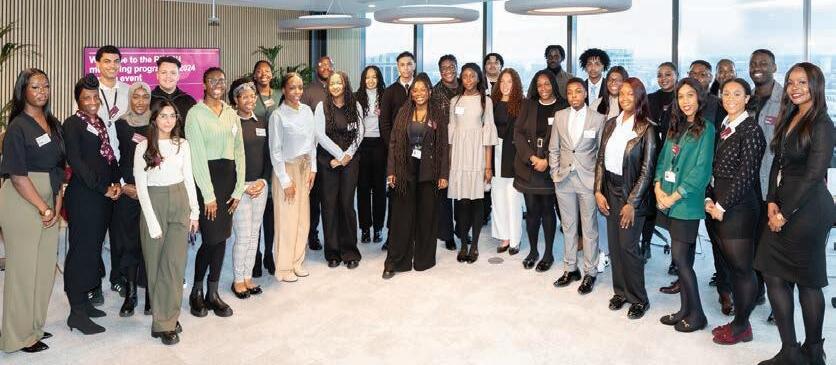
Some of lawyers who took part in the mentoring programme
Aspiring black lawyers have been offered the chance to kickstart their legal careers after signing up to a Browne Jacobson mentoring scheme.
The law firm has officially launched its REACH (Race, Equality and Cultural Heritage) mentoring programme following a two-year pilot that provided support to 25 individuals – 16 of whom secured employment within the business.
REACH has been set up to address a disproportionate underrepresentation of black lawyers working in UK law firms.
Each of the 20 students, aged 16 and over, will enrol on a six-month programme where they will be paired with a mentor from Browne Jacobson or one of its partners.
The scheme also includes a twoweek work experience placement in one of Browne Jacobson’s seven offices.
Browne Jacobson partner and REACH programme sponsor Bridget Tatham said: “The legal profession should be accessible to everyone regardless of their race, gender or background.
‘The legal profession should be accessible to everyone’
“However, the reality is there are still many barriers that prevent individuals from under-represented communities, particularly those of African and Caribbean heritage, from pursuing a career in law.
“We know this is a problem that needs to be addressed, and as a business we are committed to building an inclusive and diverse pipeline of talent, where black lawyers are not only provided with a
Management at a drug and alcohol recovery centre have launched a campaign to raise thousands of pounds to refit the property after a fire last month.
The Carpenter’s Arms in Six Hills property on the A46 between Loughborough and Melton Mowbray suffered the fire on 30 March. It caused extensive damage to the kitchen as well as smoke damage to the dining room, gym, a new reception area and first-floor offices.
None of the staff or people staying at the residential centre were hurt and Leicestershire Fire and Rescue firefighters quickly brought it under control.
Assessing the full structural damage is going to take some time but a gofundme campaign to put right the damage had raised £7,000 in a matter of weeks
Carpenter’s Arms chief executive Richard Spence said: “While we are all deeply upset by the damage to the building, we are truly humbled by the outpouring of support from our local community who turned up to lend their support at the weekend.
“Thankfully, we have been able to put in place all temporary measures to save the site from shutting down and to house residents on site whilst we build back.
“Our immediate priority is to ensure that those elements of the programme that play such a key part in drug and alcohol recovery are back up and running as soon as possible.”
To donate, search for Carpenter’s Arms at gofundme.com.

level playing field but are equipped with tools and interventions to place them on an equitable and just footing with their peers.
“But we know there is a huge amount of work still to do.
“By officially launching the programme and collaborating with clients that are market leaders in their sectors, the aim is to scale up to further increase the positive impact we can achieve.”
Solicitors Regulatory Authority (SRA) figures show that in 2015, the proportion of Black, Asian and UK minority ethnic lawyers working in law firms was 14%. This figure increased to 19% in 2023, but just 3% of all lawyers were Black the same year.
Since it was piloted in March 2022, REACH has increased the proportion of black trainees at Browne Jacobson from zero in 2016 to 31% in 2023 and 29% in 2024.

A company that supplies flooring products has been sold in a deal advised by PKF Smith Cooper.
Nottingham-based T&R Floor Covering Distributors has been sold to TradeChoice Carpet & Flooring, which has branches around the UK.
T&R is a family-run business with more than 35 years’ history in the carpet and flooring industry. It prides itself on its wide selection of products and boasts a twoday turnaround or quicker for delivery.
TradeChoice is a member of the Carpetright group and has 13 branches across England, Wales and Scotland.
The acquisition is part of its ongoing growth plans within the Midlands and will give it better transport and storage options.


Management at Kilworth House Hotel, a Grade II listed Italianate country house hotel set in 38 acres of south Leicestershire countryside, are gearing up for a very busy summer season.
The house – which today includes its own outdoor theatre –was built as a family home in the late 1880s for the then High Sheriff of Leicestershire.
In the 1960s it was turned into flats and in 1999 Celia and Richard Mackay bought the property and painstakingly restored it –transforming it into the hotel and grounds guests see today.
Sales manager Sarah Johnston said Kilworth House Theatre, which has been running since 2007, had been the idea of Celia Mackay, who retired from the business in 2020. Her dream was to present professional, West End quality musicals but with tickets at a fraction of London prices – and free parking.
All the productions are created and produced exclusively for Kilworth, with the creative team,
company and orchestra drawn from the West End.
This year’s main production, Singin in the Rain, opens on 18 June and runs to 28 July with a total of 52 performances including 16 matinee shows. Tickets are priced between £45 and £55.
This summer will also see the annual “Live at Kilworth” programme of one nights shows, starting 7 August and running to 25 August, and featuring a “carefully chosen and eclectic” programme of British tribute acts – including returning favourites and eight acts making their debut.
Sarah said: “Kilworth House Theatre doesn’t only offer the best of London’s theatreland in the heart of rural south Leicestershire, it’s also situated within a beautiful, wooded glade close to the lake in Kilworth’s beautiful grounds. This is where magical memories are made.
“Recently renamed the Celia Mackay Theatre after its founder, it has long been nationally recognised as one of the foremost open-air theatres in the UK, both for the standard of its productions
and the high quality of its facilities.
“The architecture of the theatre is stunning, with two soaring saillike canopies protecting both the auditorium and the stage form the elements – so that the show goes on, whatever the weather.
“The majority of our cast are all West End actors, and many return to West End shows after performing at Kilworth Theatre during the summer months”
The auditorium has 547 seats, and the tiering ensures every seat offers a good view of the stage.
‘Guests are able to dine prior to the show in our Grade II listed Victorian orangery or even bring their own picnic’

complete with bar, kitchen and cloakrooms.
Sarah said: “You can book the Staging Post exclusively for your guests and enjoy pre show dining, interval drinks, where the Staging Post remains exclusively yours for your guests to enjoy and then opens up after the performance for the opportunity to meet the cast and other fellow theatregoers.

She said: “There is a special aura about open air theatre on a warm summer's evening and there can be no better way to experience professional productions of a standard rarely seen outside the West End, than amid the magnificent surroundings of Kilworth House Theatre.
“Guests are able to dine prior to the show in our Grade II listed Victorian orangery or even bring their own picnic to enjoy on the grounds. The full experience includes pre-theatre dining, seeing the show and then returning to the hotel for an overnight stay.”


She said the hospitality and corporate offering includes a rustic log cabin – The Staging Post – a large wooden building, nestled in a picturesque woodland next to the theatre.
It can welcome groups of between 30 and 60 and comes
“Whether you're planning an exclusive business gathering, a team-building retreat, or a welldeserved staff appreciation event, our rustic log cabin and its unique hospitality experience promise to captivate your guests and leave them talking about it for years to come.”
The actual hotel has 44 bedrooms and space to accommodate weddings for up to 130 people, conferences for up to 80, and private dining for up to 40 guests.
As well as that, the orangery serves lunch, afternoon tea and dinner along with “Theatre in the Orangery” events, jazz lunches and dinners, and murder mystery events for up to 120.







The owners of a country house hotel which reopened in December 2022 say their efforts have saved the building from falling into disrepair and helped preserve it as an important historical landmark.
The team at Kidd hospitality spent five months refurbishing Woodborough Hall, just outside Nottingham, prior to its reopening.
Director Jenny Dickie said: “We wanted to breathe life back in the hall and to share it with our customers.
“We are proud to have already


achieved a five star Tripadvisor rating and gained multiple positive food reviews in the press and online.”
The improvements, supported by Richard Hill at Bonsers Restoration, included upgrades to the plumbing, heating and gas supplies, fire and security work as well as roof, guttering and chimney repairs.
They also included restoration of the stone entrance as well as the woodwork in a more recently added orangery.
The contractors used in the refurbishment were all local and design and fit-out of the property –which included an upgraded kitchen and a new bar – was led by the in-house team.
The second phase of the refurbishment saw the five guest bedrooms restored to a modern standard.
Today the hotel hosts family occasions, parties, celebrations and
The site of Woodborough Hall dates back to William the Conqueror and its latest chapter follows a fascinating near-1,000-year history which has seen it owned by wealthy landowners, explorers – and even the government, who bought it in 1937 to house high ranking officers of the Air Force and then the Army. As a result, there is a fine example of an Anderson shelter in the gardens.
There is also an intriguing suggestion a secret meeting was held at the hall when the concept for the British Secret Service was discussed. Mansfield Cummings, the founder of the secret service (known as the original C), was the nephew of Mansfield Parkyns, an explorer



weddings as well as corporate events. Lunch in the restaurant is served seven days a week and evening dinners are served on Fridays and Saturdays. Visitors are also welcome to simply drop in for a drink and to relax in the gardens.
‘We’ve been delighted with the response from our customers so far regarding the refurbishment’
The owners are now looking forward to welcoming guests to what they hope will be a strong 2024 summer season and said the hall combines “classic country charm with exquisite cuisine”.
Jenny said: “We’ve been delighted with the response from our customers so far regarding the




refurbishment, the food and drink offering, the professional service and the general atmosphere.
“A critical part of this has been the terrific teams both front of house and in the kitchen under the direction of head chef Tom Paxton.
“Tom prides himself on using locally-sourced ingredients to present food with a modern twist.
A top blogger and food writers who visited recently described the fillet steak as probably the best she had had in the UK.”
“Moving into is our second year of trading, we’ve been very pleased at how the business is building up.
“We are a great venue for business meetings and smaller conferences where people want a more independent-type venue. It’s also the perfect venue in tranquil surroundings for client meetings and networking.”



Unique service: Davies Turner provides the only direct rail import/export FAK consol services in the UK market, offering considerable transit time savings compared to ocean freight and substantial cost savings of up to 70% in comparison to air freight biweekly service approx. 20-25 days transit time.
Nominated for the BIFA Rail Freight Operator of the Year Award 2023.

WE CAN ARRANGE AIRFREIGHT TOO IF YOU NEED A FASTER DESPATCH





Council housing is back in Amber Valley in a move that reverses two decades of policy.
For the first time since 2003, Amber Valley Borough Council has become a stock holding council –and the first affordable homes are now ready for local residents to move into.
The first four new properties in Bayley Close, Kirk Langley, were handed to the council this spring from developer Cameron Homes.
It is the first phase of a longterm council housing initiative across Amber Valley.
Council leader Cllr Chris EmmasWilliams said it was a big step forward in terms of meeting the needs of local people.
He said: “For a long time, I have felt strongly about the need to supply decent council housing for people in our area. The first four homes are now being handed over from the developer with three more to follow at their site.”
The handover of the seven homes at the development off Moor Lane, in Kirk Langley, is part of a Section 106 agreement – a

legal agreement between a planning authority and a developer attached to planning permissions.
All properties will have driveways and gardens, and some homes will include solar panels to help reduce energy costs.
More than 2,000 households are currently on the waiting list for affordable housing in the borough. A further 21 homes are being acquired in Belper.
Cllr Emmas-Williams said: “We are very aware that it is a drop in the ocean in terms of fulfilling the

Loughborough-based consultancy 1284 has been shortlisted for specialist PR consultancy of the year at the industry-leading CIPR Excellence Awards 2024.
It has made it into the category’s final eight for its work communicating innovation, productivity gains, and regional economic growth across the region.
The Excellence Awards recognise the work of practitioners worldwide and are led by the Chartered Institute of Public Relations (CIPR). The winners will be announced during a special event at The Royal Lancaster, London, in June.
Finalists range from private sector SMEs to global agencies, inhouse teams to public sector organisations. Shortlisted professionals represent organisations including BAE Systems, Paddy Power, University of Oxford, and Nestle.
housing need in the area, but we must start somewhere.
“It is so important for communities to be able to stay together if they wish to and stop the heart-breaking situation where grown-up children of long-standing residents have to leave the area they grew up in because they can’t afford to live in the district.”
Funding of £8.96m has been allocated for housing in Amber Valley and will be used over the next three years.
In March 2024 the Chamber welcomed 23 new members:
• Bell Transport & Logistics
• Bridge the Gap
• County Turf Sports
• The Dairy Creative Agency
• DGM Agility
• Direct Help & Advice Ltd & Derby Law Centre
• Dr Olivia Medispa
• Dronfield Heritage Trust
• Duke Distribution
• Elite Building Services East Midlands
• Hinckley and District Chamber of Trade
• Answers to Business T/A Insight Consultancy
• ITwize Technology UK
• Jeffryes Consulting
• Mac Beauty
• Minakshee Patel Consultancy
• Minuteman Press Chesterfield
• Parkway Volkswagen
• Sewjackie
• TGIS Aviation
• Tintisha Technologies
• Trust Payments
• Whittington Moor Printing Works
A businesswoman has reached the national finals of a prestigious awards recognising the positive impact that small businesses have on the nation’s economy.
Rachel Hayward (pictured) is the founder of Ask the Chameleon and specialises in producing funding and commercial procurement applications and business award submissions.
Since the business launched in 2015, it has secured a total of £117m in contracts, with potentially a £100m in contract values in the pipeline, as well as high profile awards for clients.
award and being part of an impressive line-up of business people for the national award is a huge honour.

Rachel was named East Midlands self-employed/freelancer of the year in the 2024 awards organised by the Federation of Small Business (FSB).
She will attend the national final in Blackpool’s Winter Gardens on 9 May alongside the other regional winners from across the UK.
She said: “I am obviously delighted to have won the regional
“I wanted to enter this award to highlight the typical characteristics of the self-employed and freelancers who need to be motivated, flexible and resilient to achieve their goals and to showcase that this has been particularly important during and post pandemic when most of us were ineligible for support that other businesses relied on for survival.
“Although SMEs are the lifeblood of the economy, most do not have the capacity to bid for tenders to secure their own growth or do not feel they would be judged able to deliver public sector tenders.
“By working in collaboration with my SME clients and providing services such as a monthly tender alert, I am able to unlock opportunities and level the playing field for them.”


A survey conducted by Transport Focus in 34 Local Bus Partnership areas asked passengers their thoughts on wait times, bus drivers, value for money and overall satisfaction. Nottingham ranked as the best city, and the third best area, with an overall approval rating of 87%.
The greater Nottingham area came top in terms of satisfaction with wait times, while Nottinghamshire was the top county. The results follow significant work in recent years to upgrade the real time information network – taking the uncertainty out of wait times – as well as designating 16 miles of bus lanes in Nottingham city and upgrading junctions for bus priority.
Nottingham’s bus operators also ranked highly as did bus drivers, with trentbarton said to have the best bus drivers in the country and Nottingham City Transport ranking in highly at eighth place out of 55.
Councillor Angela Kandola, Nottingham City Council’s portfolio holder for transport said: “In Nottingham we’ve long been proud of our fantastic bus network, but it’s hard when travelling within a city to get an idea of what transport is like nationally.
“The Transport Focus survey shows that we really do have some of the best bus services in the country and that the excellent working relationship between the city and the operators leads to high approval for passengers.
“Although the Government’s Local Bus Partnerships are a new initiative nationally, in Nottingham we have a long history of operators and the council working together to improve services.
“The council’s majority ownership of Nottingham City Transport and great working relationships with trentbarton and Ct4N have meant we can deliver pioneering city-wide schemes like Robin Hood, bus priority corridors and Nottingham contactless.”




Zero-emission electric buses will replace diesel vehicles on all Kinchbus town routes in Loughborough after a successful joint bid with Leicestershire County Council.
Kinchbus is getting 21 emissionfree electric buses and will use them to provide 100% clean and green public transport on six routes in the town.
The council, Kinchbus and Arriva have secured £8.1m of Government funding to buy the buses and install the charging infrastructure to power them.
Electric buses were successfully trialled last year and Kinchbus aims to have the new buses in service by 2025, by which time more than half
‘This is a significant investment in buses within the East Midlands’
of its fleet will be zero-emission.
Almost all the remaining diesel vehicles will serve skylink Derby and are already as certified lowcarbon.
Chargers for the new vehicles’ batteries will be installed at the Kinchbus depot in Swingbridge Road, Loughborough.
Managing director Tom Morgan said: “This is a significant investment in buses within the East Midlands and specifically in
Leicestershire, reiterating our commitment to high quality, customer-focused and sustainable public transport within the community we serve.
“It will accelerate our decarbonisation strategy, with buses at the heart of it, and result in cleaner air for everyone.
“We have consistently invested in cleaner buses for many years and this big next step forward with zero-emission vehicles gives our drivers and engineers the opportunity to work with the exciting technologies of the future.
“This will futureproof their skills and put them in the driving seat –and in the workshop – of the green transport revolution”
Bus drivers and colleagues at trentbarton have chosen Lincs and Notts Air Ambulance as their charity of the year for 2024 and 2025.
The airborne lifesaving charity is celebrating its 30th anniversary in 2024 and came top in a staff vote for the charity that staff at the bus company wanted to fundraise for.
The Lincs & Notts Air Ambulance responded to 1,771 missions in 2023, its busiest year on record.
Its pilots, doctors and paramedics fly critically ill and injured patients to hospitals and can provide treatments including blood transfusions, anaesthetics and life-saving drugs.
In Nottinghamshire the charity, which receives no funding from the NHS or the Government, also operates a critical care car to bring doctors and paramedics to the scene of incidents.
Scarlet McCourt, trentbarton’s marketing and communications manager, said: “It's great to be

raising these vital funds for Lincs and Notts Air Ambulance once again, having originally worked together in 2015 as charity partners.
“We're so happy to see them receiving so many votes this time round from both our customers and team and we can't wait to get going.”
Money will be raised for the charity through staff events and trentbarton’s Namesake programme where people can donate to have a bus named after a loved one. Upcoming events include a silent auction and a raffle. The last trentbarton charity of the year was Alzheimer’s Research UK, which was presented with £6,000.


A city-wide search is under way in Derby to find a suitable home for Great British Railways (GBR).
The GBR transition team needs to find a HQ for the new national rail body which can also act as a hub for the wider rail industry.


East Midlands Railway (EMR) has started a £60m programme to refurbish its fleet of trains.
The improvements will see its Class 360 fleet upgraded with new 2+2 seating throughout in a mixture of airline style and bay seats, as well as luggage racks, charging points and new passenger information systems.
The trains run on EMR Connect and Luton Airport Express services between Corby and St Pancras, and stop at Kettering, Wellingborough, Bedford, Luton and Luton Airport Parkway.
The refurbishment also takes in Class 170 trains which are used on regional services across the East Midlands including Matlock to Derby and Nottingham, Nottingham to Worksop via Mansfield, Newark Castle to Crewe via Nottingham, Derby and StokeOn-Trent, Peterborough to Doncaster via Lincoln, Nottingham to Skegness via Grantham,
Cleethorpes to Leicester via Lincoln and Nottingham, and Cleethorpes to Barton on Humber.
Those trains have come to EMR from different operators and will be upgraded to provide a more consistent customer experience across the fleet.
‘The
refurbishment will redefine the travel experience across every corner of our network’
There will also be improvements to the Class 158 fleet which mainly operates on the Liverpool to Norwich route via Nottingham, Manchester and Sheffield.
Work is being done in partnership with Angel Trains, Siemens, Porterbrook, and Eversholt.
Together with the introduction of the new Aurora Intercity trains, it will mean all of EMR’s services will
have either new or refurbished trains.
EMR managing director Will Rogers said: “This multi-millionpound investment into our Connect and Regional fleets is fantastic news for our customers and the regions we serve.
“The refurbishment will redefine the travel experience across every corner of our network. It is also great news for the country's rail industry, with all the work being carried out by UK companies.
“Combined with the up-andcoming introduction of our Intercity Aurora fleet – it will mean every train we operate will either be new or refurbished.”
Leicester Mayor Sir Peter Soulsby is chair of Transport for the East Midlands.
He said: “The refurbishment of EMR's regional and commuter services has been a TfEM priority for some time, so we are delighted that this investment is now going ahead.”
Derby – which sits at the heart of the UK rail network and has a long tradition of rail engineering – was picked as the home of new government rail operator last spring after fighting off competition from Birmingham, Crewe, Doncaster, Newcastle and York.
The Government wants GBR to oversee improvements to the rail system following decades of disjointed management.
The GBR transition team has been working with Derby City Council and other local partners to find a base for the operation.
Earlier this year the Government published its draft Rail Reform Bill – the legislation needed to create GBR. When passed, it will bring together responsibility for railway lines and trains in a single organisation, with the aim of making services easier to use and more efficient.
The transition team has temporary accommodation in the city to help it build links with its local partners and prepare for GBR’s launch.
Paul Harwood, director of partners and places at GBRTT, said: “Good ideas can come from anywhere, but innovation happens when people work together to put good ideas into practice.
“We’re looking for a space that will ensure Great British Railways HQ is a catalyst for that vibrant, customer-first culture that will fan out from Derby.”

East Midlands Railway (EMR) and its partners have won three prizes at the Community Rail Network's Community Rail Awards.
EMR's Routes of Remembrance –which saw a poem written for an event help with The Veteran’s Charity – won silver in the community engagement project category.
The poem was put together by Community Rail Partnership
members and station volunteers during a workshop run by creative writer Via McNab.
It is now on display at both Derby and Nottingham stations alongside other Remembrance artwork, and has been showcased in posters across the EMR network. Longton Station Adopters won lead bronze in the “Its Your Station Category” thanks to the hard work of the volunteers in looking after
the Staffs station.
Finally, Beds & Herts Community Rail Partnership won third place in this year's photo category.
Kaye Robinson, community engagement manager at East Midlands Railway, said: “These achievements are a testament to the dedication of our partners, volunteers, and station adopters who work tirelessly to enhance the railway experience for everyone.”

Businesses in the Harborough district of south Leicestershire are being encouraged to apply for grant funding through the Harborough Rural Grant Scheme 2024/25.
The capital grants are available for rural businesses to help them diversify, innovate and grow.
Eligible applicants can apply for between £5,000 and £20,000 to support their business, and the council is keen to support projects that will help local businesses and the wider economy and community.
The scheme spans across four themes:
• Farm Business Diversification –Supports farm businesses to diversify their business activities outside of agricultural activities. Such projects should improve business resilience, development, and revenue
• Innovate and Grow –Support micro and small enterprises in rural areas looking to deliver innovative projects. Funding will support projects that change the way businesses do something, to improve efficiencies and to generate more income.
Projects will need to demonstrate how they are helping to overcome a rural issue or barrier they face in order to grow
• Green Technology –Support businesses to invest in energy efficient and low carbon technologies. This means businesses can invest in green technology that will improve their carbon footprint.
Businesses could also use this funding to develop their own green technology which can be used to improve the carbon footprint of their business and/or other businesses
• Rural Tourism –Capital grants to develop local tourism attractions, facilities, or infrastructure to enhance the rural visitor economy and increase opportunities to attract visitors to our rural areas.
Applicants must be based in rural areas in the Harborough district which can be identified in the grant policy. Before applying, businesses must review the full policy which includes the eligibility criteria.



Entrepreneur and philanthropist Dr Nik Kotecha OBE DL (pictured) is chairman and founder of investment company RandalSun Capital and the Randal Charitable Foundation.
With high inflation, interest rates at their highest for 15 years and the impact of the cost-of-living crisis for communities across the UK being reported on a daily basis, it’s almost impossible not to be aware of the cumulative effects for many communities.
UK energy prices remain incredibly challenging for both transport and heating, food costs have jumped in the past 18 months, peaking at a monthly rise of a staggering 19.1% in March 2023; and while marginally falling now (around 13.6% in August 2023), the cost of a family shop remains so much higher than just a year ago –forcing many to make nigh-on impossible choices.
We’re all aware of the many contributing factors here, some of global, not just national, consequence which have led us to this point – Covid, geopolitics and Brexit, to name a few.
And wages are growing in some sectors – and the Office for National Statistics reported (June to August 2023) annual growth in regular pay at 7.8% – one of the highest annual growth rates since 2001.
But even so, those wage rises don’t seem to be keeping pace with costs for most, and the lag in wage rises versus living costs means more people than ever are using foodbanks.
The Trussell Trust reported in March 2023 that close to three million emergency food parcels had been distributed by their network in the last 12 months, the most they have every distributed.
It’s a stark picture of the UK, isn’t it – despite having one of the world’s largest economies. An economy which is under stress and
has been on “recession alert” with falling house prices and falls in manufacturing outputs, as reported in The Guardian last month.
On 24 October, the Joseph Rowntree Foundation published the fourth in their Destitution in the UK report series – and revealed that “approximately 3.8 million people experienced destitution in 2022, including around one million children”.
These are shocking figures, and the read gets harder still when you learn that the numbers of children experiencing destitution has almost tripled since 2017 – an increase of 186%.
‘With just a little time we can all make a little difference’
As you’d expect from a respected voice such as the Joseph Rowntree Foundation, they are quite precise in their definition of destitution: it is those who “have not been able to meet their most basic physical needs to stay warm, dry, clean, and fed”.
This research was conducted during 2022 and I don’t think you need to be a qualified researcher or economist to surmise that this picture will now be darker still.
So – what can business do? How can we contribute? What tools do we have at our disposal – and is it up to us to get involved?
On the latter point, my view is firmly “yes” – we surely must get involved. We have a range of ways in which we can contribute, and that’s true, whether yours is a business that is large or small.
• Partnering with local charities, supporting those in greatest need within your community, can

bring significant benefits. Time –and your expertise – could be one of the most valuable contributions they receive. It’s not always about money
• If you’ve ESG goals as an organisation, is it possible to consider orientating these to respond, even more, to local needs?
• Can you procure more, locally –or work with social enterprisebased business who deliver and track social, environmental and community impact, as well as providing the goods or services you might need?
• And back to our children. Can you connect with a local school and offer inspirational insights on exciting careers in your sector, or partner with them over time?
Children who may be destitute today – and there’s more than a million of them – are after all, our workforce of tomorrow.
In a few short years, they will be the apprentice workforce you need, the innovators and ideas generators in your business, your key decision makers and problem solvers, as well as our future leaders.
Your voice now, to encourage, won’t take away the family hardship they may be facing, but it could provide hope and grow determination, engage and inspire. With just a little time we can all make a little difference. Getting better connected with our communities, and standing together across our business communities, I believe the collective difference we can make could be remarkable. And – given all of the above, if not now, then when?



Rohit Parmar-Mistry (pictured), cofounder of Pattrn Data, explores how economic fluctuations challenge and offer opportunities for SMEs. The current climate demands quick adaptation and foresight into market trends. With rising costs and unpredictable revenue, focusing on solid customer relationships is crucial. Pattrn Data’s analytics unlock this potential by enhancing connections with loyal customers.

Understanding economic uncertainty
Economic fluctuations present significant challenges and opportunities for small and medium enterprises (SMEs). With increasing operational costs and unpredictable revenue streams, the emphasis on nurturing proven customer relationships is more crucial than ever.


Pattrn Data's advanced analytics tools offer SMEs a strategic advantage by deepening engagements with their most loyal customers, ensuring resilience in volatile markets.
The power of customer data
Pattrn Data transforms raw customer data into valuable insights. By analysing behaviour patterns and preferences, SMEs can customise their services and products to meet specific customer needs, thereby increasing satisfaction and loyalty. This focused approach not only improves the efficacy of marketing campaigns but also enhances return on investment during economically unstable periods.
Strategic engagement through analytics
Utilising advanced analytics, SMEs can identify and cultivate their most valuable customer segments. Pattrn Data's tools aid in understanding what drives customer loyalty and how to leverage these insights to enhance overall
business operations. Strategic engagement with core customer groups builds a robust base that supports sustained growth, even amid challenging economic conditions.
Proactive adaptation with predictive insights
Beyond current trends, Pattrn Data’s predictive analytics empower businesses to anticipate and prepare for future market shifts. This foresight allows SMEs to dynamically adjust their strategies based on data-driven predictions, from modifying service offerings to optimising supply chains. Predictive insights help businesses stay ahead, ensuring they thrive in a constantly evolving economic landscape.
Discover how Pattrn Data can transform your customer engagement. Visit pattrndata.io for more insights and solutions.


Kayleigh Newby (pictured) has been promoted to head of marketing at East Midlands Chamber.

Kayleigh has 14 years’ experience in the sector as well as a background in other areas of business and is now responsible for leading on all marketing activity for the Chamber.
Her marketing career began in pharmaceuticals and since then she has worked in the retail, farming and engineering sectors.
For the last five years Kayleigh has worked at the Chamber on a range of funded projects, in particular the D2N2 Growth Hub. She started at the Chamber as marketing and events manager before moving onto marketing manager, helping to lead the marketing team delivering the UKSPF funded Accelerator project. She holds a marketing degree and is CIM and ILM qualified.
She said: “I’m looking forward to working closely with the events team to help promote the Chamber’s flagship events and working to ensure that Chamber members are kept updated with all the services available to them through their membership.”

Damon Brain has stepped into the new position of chief executive of Duncan & Toplis, one of the biggest accountancy and business advisers in the East Midlands.
He has succeeded Adrian Reynolds, who has stepped down after serving as managing director of the firm for the past 12 years.
As CEO, Damon – a 27-year veteran of the company – will oversee a growth strategy which includes expanding the company’s capabilities and its market presence across the wider Midlands region.
Damon started at Duncan & Toplis as a trainee, becoming a partner in 2004. Over the course of his career, he has advised thousands of businesses across the Midlands and beyond on critical business issues including expansion, financing and strategic transactions.
He has also played an active role on the company’s management and operations boards.

Audit, tax and consulting firm
RSM UK has promoted Sheetal Sanghvi to managing partner for the East Midlands, taking in the role of office managing partner in Leicester.
The move follows Sheetal’s appointment as office managing partner in Nottingham last April, and will enable greater consistency across the East Midlands region.
Sheetal has replaced Kevin Harris in Leicester who has headed up the office there for six years and who remains a partner within the East Midlands leadership team.
Sheetal is an RSM ‘lifer’ and has been with the firm for over 18 years after joining as an audit assistant in 2005 and progressing through the ranks to become partner.
She is also head of innovation reliefs in the central region and has

extensive experience in research and development and patent box claims.
She is also RSM’s EmbRACE Network lead in the central region, which is an initiative to champion race equality, and won the

Rowleys chartered accountants has announced two partner promotions, with Lisa Parkes and Matt Hutchinson joining the firm’s leadership team.
Lisa has been with the firm for 19 years and is an audit signatory who works with a range of clients from owner-managed businesses to larger corporates. She also heads up the firm’s charity and not-forprofit sector team, an important growth area for the firm.
Matt joined Rowleys in 2014 and works with a range of businesses, many in the ‘mid-market’ space.
He also heads up the firm’s pensions team and is a specialist in auditing defined benefit pension schemes. He is also an audit signatory.
Managing partner Tom Copson said: “The promotion of Lisa and Matt to partner is testament to their continued hard work and dedication to the firm. At an exciting time in the firm’s growth, it is great to add Matt and Lisa to our group of partners.
“They both go above and beyond to provide a great experience for our people and our clients and are committed to the future development of the firm.”
outstanding senior leader of the year award at the Multicultural Business & Community Champion Awards 2023.
RSM has 200 employees in the East Midlands.
Sheetal said: “I'm thrilled to be taking on the managing partner role in Leicester and leading the wider East Midlands business.
“Our team’s growth across the region has laid a strong foundation, and I hope to propel us further forward through collaborating with the leadership team and our talented group of staff.
“A key part of the role is acting as an ambassador for our business in the East Midlands and I am committed to fostering growth and excellence within the team, enabling us to extend our market presence and achieve exceptional results for our valued clients.”

Derby wealth management company Rhodes Wealth Management has appointed Hayley Burton (pictured) as its managing director.
Hayley joins the business following a period of strong performance, with the company recently achieving £500m of funds under management.
She will be responsible for shaping the strategic direction of the business, driving growth, and fostering a collaborative and positive work environment.
Hayley has more than 20 years’ experience in financial services, with a track record of growing wealth management businesses with a customer-centric focus.
She was previously managing director of Kingswood Group and divisional manager at Santander Wealth Management.
Chief executive Adam Rhodes said: “I am confident that Hayley’s strategic approach, energy and people-focus will prepare us for the next phase of growth and support our talented team here at Rhodes.”

Aformer Government business champion and ex-head of Leicestershire Chamber of Commerce has been appointed as chair of the Loughborough Town Deal Board.
Martin Traynor OBE was until recently a Small Business Crown Representative for the Cabinet office, which saw him helping to improve relations between Government and businesses.
He was also chief executive of the Leicestershire Chamber for 14 years prior to it becoming part of East Midlands Chamber and has held several senior board roles. He also has a background in hospitality.
As the new chair of the Town Deal board he will be responsible for working with 11 projects delivering more than £40m of investment into the area, boosting skills, regenerating the town and
‘I
am determined to support the remaining Town Deal projects’
supporting the visitor economy.
Martin has been on the board since its inception and replaces Dr Nik Kotecha OBE DL.
He said: “I am honoured to be appointed as the chair of Loughborough Town Deal Board.
“The Town Deal has already delivered almost £15m of investment into the area and several projects have been completed including the creation of the Careers and Enterprise Hub, improvements to the canal side, a significant town centre regeneration scheme and support for the visitor economy.
“There is much more on the way, and I am determined to support
Blu Hardy has been promoted to marketing manager at Hardy Signs in Burton-on-Trent.
The business was founded by her father Nik Hardy in 1993, and makes and supplies bespoke traditional and digital signs. Blu's promotion represents a continuation of the family's legacy.
Under her father’s leadership, the company has grown from humble beginnings into a respected name in the industry.
With a background in film production and screenwriting, Blu has played a big part in shaping the firm’s brand identity and marketing strategy.
Her keen eye for visual media and an innovative approach to digital marketing have helped elevate the company’s profile and drive growth in an increasingly competitive market.
She said: “I’m incredibly grateful for the opportunity.
“It’s been a stellar year for Hardy Signs, as we celebrated our 30th anniversary last summer with themed social media campaigns and events to mark the occasion.
“With a deep understanding of the company’s values, I am committed to upholding our reputation to ensure we remain at the forefront of the industry.”

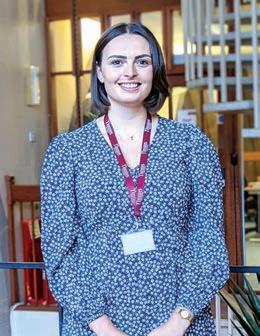
Timms Solicitors, which has offices in Derby, Burton, Swadlincote and Ashby, has expanded its care team.
Childcare solicitor Jessica Silvers joins the team with extensive experience in care proceedings –representing children, parents and other family members. Her work also includes adoption matters, advising guardians and matters involving deprivation of liberty.
She is a former recipient of the Derby and District Law Society junior lawyer of the year title in recognition of her work in the profession and pro bono work undertaken where she represented a parent in an adoption matter.
She is a member of the Law Society’s Children and Family Law Panels, enabling her to take on guardian instructions in family law proceedings, and is also a qualified legal representative with extensive advocacy experience on behalf of vulnerable clients in court.
Timms managing partner Fiona Moffat said: “We are delighted that Jessica has joined the growing care team in the family law department. Not only does she bring a wealth of experience in key areas of the work we do here, but her natural empathy and professional approach will be a great asset to the whole team.”
the remaining Town Deal projects through to their completion. They will leave a significant legacy for Loughborough.”
Local businessman Charles Bentley has also joined the Town Deal board. Charles is managing director of Loughborough-based Charles Bentley, which provides a wide range of products for the home and garden.
Town Deal projects already completed include the creation of SportPark Pavilion 4 at Loughborough University, which is part of the Healthy and Innovative Loughborough project. Several elements of the Living Loughborough project are also up and running including the expansion of free wi-fi in the town centre, an augmented reality heritage trail and free business support for local businesses.
The University of Leicester has strengthened its links with the NHS with the appointment of Professor Philip Baker (pictured) as chair of Health Innovation East Midlands.

Prof Baker will see a modest reduction in his time spent at the university, where he is Pro Vice-Chancellor for Research and Enterprise, as he embarks on the part-time role with the regional innovation arm of the NHS.
It is one of 15 innovation networks (HINs)across England which operate as the innovation arm of the health service.
HINs work with partners, including universities, to identify and spread health and care innovation – such as technologies, apps, systems, pathways and medicines –that have the potential to save money and transform services for patients.
The move will strengthen the opportunities for the university’s researchers and innovators to help the NHS tackle some of the challenges it faces.




says designing micro-reactors that will one day power bases on the moon is like “living in a sci-fi film”. Tom Pegden asked her what it’s like to have the “best job in the world” working on the next chapter of our journey into space.


Five decades after the last person set foot on the moon, NASA’s Artemis III mission hopes to be back on its surface in just over two years’ time.
The plan for two astronauts – including the first woman and first person of colour – to spend a week exploring the lunar South Pole is part of the build-up to sending the first crewed mission to Mars. All being well, that could happen as early as the 2030s.
Among the technical challenges – managing extremes of heat and cold, creating safe crew habitats, even dealing with the lunar dust a spacecraft stirs up when landing – among the most complex will be providing fuel, air, water and energy.


NASA is working closely with the private sector – not least Elon Musk’s SpaceX business –to get the next chapter in space exploration off the ground.




‘This is not just a vanity science project but the next stage in human development. We’re aiming for a micro-reactor on the moon’

One PwC report said the lunar economy will be worth £144bn by 2040, and the UK is playing a part in the plans.
Goonhilly Earth Station, in Cornwall, has been involved in tracking Artemis missions, while Thales Alenia Space will work on an ESA refuelling module for the Lunar Gateway space station moon orbiter. Another example of British involvement is Surrey Satellite Technology’s Lunar Pathfinder spacecraft, which will offer communications and navigation services on the lunar surface.
‘The public perception is swinging in nuclear’s favour because of the benefit it can have to climate change’
Here in the East Midlands Rolls-Royce’s submarines division is using its decades of specialism in nuclear power plants to design and build a small-scale nuclear reactor capable which will one day be capable of propelling rockets, powering satellites or – more immediately –providing energy for that first moon base. Most of the Rolls-Royce work is happening in Derby, with an operation at Space Park Leicester.
The appeal of micro-nuclear reactors is that they will be relatively small and lightweight compared to other sources of power, and provide continuous energy regardless of location, sunlight or harsh environmental conditions.
Right now, the mission is to design the first prototype and get it working down here on




earth – and Katie Jarman, the assistant chief engineer for space at Rolls-Royce, is helping lead those plans.
Her enthusiasm for the project and excitement at the prospect of helping people live on the moon is undeniable, and she is in no doubt that the technology will work.
She told Business Network: “Yes, absolutely. I think it has to. I think that the time is right now for this push.
“The public perception is swinging in nuclear’s favour because of the benefit it can have to climate change. We’ve got massive advances in fuel and material technologies that we can use to make them even more financially viable, and we’ve got the real business case to do this.
“NASA has started its Artemis programme which is the first time the US has endeavoured to put people on the moon since the 1970s.
“Space is becoming, very quickly, the next domain of economic growth – in terms of people using space tugs to ferry things around, in terms of manufacturing in lunar space, or growing organs which you can’t do on earth because the gravity is too much as the tissues are trying to develop.
“There are all sorts of things commercially that you could do that will need lots of power and if the power is there then the sky’s the limit.
“This is not just a vanity science project but the next stage in human development. We’re aiming for a micro-reactor on the moon in line with the Artemis timescales, so the end of the decade, early 2030s, which is incredibly ambitious but exciting.
“If we’re not ambitious we’re not going to be able to do it. The time is now. We need to really

A rocket carrying the Orion spacecraft launches on NASA’s Artemis I flight test, November 2022 (Copywright NASA)

push for this to succeed in the next 10 years.”
Katie has been at Rolls-Royce for a decade, adapting her background as a physicist into a career in engineering, and previously worked on the pressurised water reactors for nuclear submarines.
She said: “It was great. I really, really loved that job because you got to see the full lifecycle of the machines – from design, manufacturing, analysis, safety and then supporting them throughout their life. And when things don’t necessarily go to plan you learn a whole bunch of stuff which you can immediately embed in the designs you’re doing at the time.
“So, you get a huge amount of experience really quickly.
“Rolls-Royce has been supporting the Royal Navy’s fleet for a really long time but now is particularly exciting because we have the AUKUS nuclear submarine deal with Australia and the US expanding our capability and remit substantially.
“We’ve got design programmes and manufacturing programmes at slightly different stages which mean that as an engineer you are right at the heart of it all and able to learn so much really quickly – which is why I’ve been able to jump across to space nuclear power and propulsion.
“It’s a different design and different challenges, and kind of like living in a sci-fi film at the moment, but that experience is really useful. I can see what I’ve already learned that will be important to space nuclear power in three- or four-years’ time and we need to pre-empt all of those challenges.”


A space micro-reactor will be completely different technology to that used in submarines, she said.
Subs are based on pressurised water reactors which won’t work in space for various reasons –not least the vast temperature changes which mean water would either freeze or boil, and because they are simply too heavy.
Having said that, the extreme, hazardous environments in subs, the fact that they have to operate for years on end with little maintenance, and the fact that the power systems are keeping crews alive and safe, are all incredibly useful starting points when it comes to planning power sources for the moon.
Rolls-Royce has been co-funding a lot of the work with the UK Space Agency, just last month announcing a further £1.18m of support which will help the UK business work closer with US nuclear engineering specialist BWXT Advanced Technologies – whose systems power the American Navy’s submarine and aircraft carrier fleet – on the next phase of development.
‘There’s no reason why we couldn’t have a massive leverage of nuclear technologies to decarbonise all sorts of places on earth’
It follows £2.9m of funding awarded to RollsRoyce from the UK Space Agency in 2023, to deliver an initial demonstration of a UK lunar modular nuclear reactor.
Alongside the space programme there is a terrestrial programme under way in Derby too, focussing on a slightly higher power reactor which could be used in remote communities,
Rolls-Royce plans to have a micro-reactor ready to send to the Moon by the early 2030s
Basically speaking, nuclear fuel is used to create heat which powers a gas turbine to create electricity – imagine the nuclear fuel acting like a kettle filament, but using nuclear fission, rather than electricity, to create heat.
Rolls-Royce says a micro-reactor uses an inherently safe and robust fuel form – within its core, each particle of uranium is surrounded by multiple protective layers, allowing it to withstand extreme conditions.
Essentially, the fuel is contained in a graphite block drilled with lots of channels that gas flows through and is heated.
‘40kw would be about enough to power a family home – or a human base on the moon’
Innovative heat exchanger technology allows the reactor to be as efficient and lightweight as possible, which is vital if it is to be used in space.
The hot gases flow around the system into the turbine which spins and converts the power to electricity.
On earth it’s cooled down by water or air and in space it uses radiators before recirculating.
(Radiators are an established form of thermal management in space – important when the temperature of the moon’s surface can go from minus-100C to 200C in the
course of a lunar night/day.)
In space, water would either freeze or boil, while no atmosphere means you can’t use air and convection to take heat away.
Radiators have various designs and some use heat pipes to dissipate energy through a liquid which then evaporates.
Then the gas condenses in another part of the system, helping expel the energy.
Rolls-Royce hopes a micro-reactor will be able to provide about 40kw of power, in line with NASA requirements, and its more compact size makes it a transportable source of power.
40kw would be about enough to power a family home – or a human base on the moon – and the technology will also have the potential to be scaled up.
On the moon it could provide power and heat output as required. Initially one reactor per base would be enough, but in future years a number of reactors could be installed on each moon site – possibly powering a microgrid to share energy.
Katie says they hope to have a non-nuclear demonstration – using electricity rather than nuclear fuel to create heat – by around 2027-28.
NASA says fission has the potential to provide virtually unlimited energy density, opening the door for crewed missions to Mars and deep space science.
The fuel itself might last up to 10 years and from a safety point of view Rolls-Royce’s decades of experience with nuclear submarines, and the tough environments they operate in, will help ensure risks are minimal.





industry or for disaster relief, with inevitable overlap between the two.
Katie said: “I think one of the best things the space programme can do for the earth-based programme is almost about believing that nuclear power can be put in places that you might not think of as reasonable.
“One of the problems we’ve got at the moment on earth is that we absolutely need nuclear power to solve some of the big energy crises and solve the climate emergency. We are going to struggle to meet our legally binding net zero commitments as a country if we don’t have a significant amount of nuclear activity.
“It’s great that that’s being recognised but there’s still a bit of scepticism, I think, over nuclear projects. So, if we can put it on the moon – when we can put it on the moon – we can put it anywhere. There’s no reason why we couldn’t have a massive leverage of nuclear technologies to de-carbonise all sorts of places on earth.
“I think it shows that we can deliver to time, cost and quality, even really, really hard, ambitious nuclear projects.”
Katie said they are now in a position where they pretty much know what’s what in terms of the technologies needed, and over the next 18 months will take that to the next phase, while continuing the tests and hardware development they have been working on with the UK Space Agency.
In space, she says, nuclear would be much more energy-efficient than, say, solar, particularly in more higher-powered applications and as well as moon bases could, for instance, be used to power smaller, more capable satellites which could eventually help do away with some of the clutter in orbit around the earth.
Likewise, nuclear could replace the huge solar installations that would be used on space stations, which are unsustainable if we are to start really pushing into space commercially.
And in space travel to Mars, Rolls-Royce micro-reactors could one day be used to generate electricity to power a rocket thruster.
She said: “We’ve put quite a lot of thought into this and what we want to do is basically leverage as much of the investment and technology form our surface micro-reactor into being able to develop a full electric propulsion system.
“There are a lot of similarities between them. You can use the same testing, the same prototyping, and a lot of the facilities are exactly the same. We’d like to do that as soon after doing surface power as possible.
“All of this is going to be an international, collaborative endeavour. We don’t want to do this by ourselves – we know the Americans are pursuing fission surface power.
“The UK’s ambitions are to be involved in those Artemis journeys as a main signatory to the Artemis Accords. Exactly what ends up happening,whatthearchitectureisandwhatthe relationships are, will dictate a lot of the cost.
‘We’re bringing people into the industry and using that nuclear experience to do something that no-one else has done before that is just so exciting’
“It’s hugely exciting. I feel like I’ve genuinely got the best job in the world and we’ve got an amazing team. We have all these really interesting engineering discussions with people who have been in the nuclear industry and the submarines industry for a really long time.
“We’ve also got a whole bunch of new people who really wanted to come in and work on space, who we are training up in nuclear skills –so we’re bringing people into the industry and using that nuclear experience to do something that no-one else has done before that is just so exciting.
“We’ve got a lot of support from the UK Space Agency, and because the UK has got such a good nuclear heritage and we’ve been doing the full life-cycle support for nuclear submarines for such a long time at Rolls-Royce, it means we’ve got the supply chain and the people around the country who know what they’re doing.
“We’re in a really, really good position and it’s an area where we can genuinely and usefully punch above our weight in terms of the world stage.”

New data reveals that residents living in Loughborough, Lincoln, Derby and Burton Upon Trent are particularly worried about their homes flooding.
Research conducted by Howden Insurance looked at nationwide monthly Google keyword volumes for flood-related terms to determine which areas were most concerned about flooding following the recent heavy rainfall.
The study took in the number of searches on 16 flood-related terms across 12 months.
With February confirmed as the wettest on record, management at Howden said more people than ever were starting to worry about water damage to their property.
The company said the research suggested there are an average of 179 searches a month for floodrelated terms per 100,000 residents.
Its study found that residents of Loughborough were the most likely to Google information and tips on
An East Midlands business that provides round-the-clock IT services to SMEs has brought in a new senior leader to help make its customer service even better.
Dan Portus (pictured) has joined Sandiacre-based Air IT as its chief experience officer, bringing with him extensive experience in driving customer-focussed initiatives at organisations including FCDO Services, the Civil Service, and Tesco. Dan has spearheaded projects focused on enhancing customer satisfaction and building customer loyalty.

Dan said: “I’m committed to enhancing the customer journey by identifying everyday improvements that truly impact our customers. With a focus on both human and digital aspects, I’m excited to lead Air IT's customer experience during this exciting phase of growth, setting a clear vision for seamless service delivery.”
Air IT chief operating officer James Healey said: “Dan’s appointment as our chief experience officer underscores our unwavering commitment to prioritising the needs and satisfaction of our customers. His proven track record in leading customer-focused initiatives aligns perfectly with our vision of delivering exceptional experiences to our clients.”


flooding – with 661 Google searches per 100,000 residents.
Howden said the top flood-related term searched by residents was “flood warning”.
Lincoln residents were revealed as the second most concerned about flooding, with 509 monthly searches related to flooding and
flood warnings per 100,000 residents.
The most searched term in Lincoln was ‘flood warning’.
The third most flood-concerned citizens were said to be in Derby –a city which suffered significant flooding over the last year.
The study said people living in
Burton were the fourth most likely to search flooding terms. The Trent is one of the key rivers known for breaking its banks and damaging homes, streets and fields around Burton.
A spokesperson for Howden Insurance said: “With many UK residents feeling the increased rainfall in February, some will be looking for the best way to protect their homes, such as adding flood barriers to doorways or using air brick covers to prevent water entering the home through ventilation.
“Residents in Loughborough have already experienced many devastating floods so it is natural that they would be searching for ways to improve the flood defences on their homes the most.
“Those living in Glasgow would appear to be least concerned about flooding, however it is always advisable wherever you live in the UK, to know about the flood risks in your local area.”


Loughborough College students were given a rare opportunity to spend time with professionals at FC Barcelona and their Barça Innovation Hub entity.
The student representatives from across the undergraduate sports department spent two days taking in lectures and masterclasses from club professionals on topics ranging from business intelligence, innovation, TV rights and sponsorships, and analytics.
As part of the visit they discovered how life off the pitch can make a huge difference in the world of sport, and the inner workings of a professional athletics organisation.
Alongside the Innovation Hub programme, students were given the chance to tour the Camp Nou stadium, visiting the museum and FCB Joan Gamper Sports City, where they were given access to the men’s and women’s first team’s training camps.
Johnny Hie, college higher education course leader for sports science with management, said:
“The lectures and classes were amazing, and we were all so well looked after by the Barcelona team.
“The entire experience was immersive and fascinating. It was a brilliant experience, which was both motivational and educational for our higher education students.
“On our final day, we toured the Olympic Park and main stadium, including the iconic swimming pool, with views over the entire city. The students got to experience the best Barcelona has to offer, and everyone had their fill of tapas.”
The Barça Innovation Hub was launched in 2017 to work with brands, colleges, athletes and other groups to promote a culture of excellence and collaboration in areas such as technology and media, advanced performance, education, and the future of sport science.

ISA rules changed on 6 April when the new tax year began. Future Life Wealth Management’s independent financial planner Emma Baumbac (pictured) provides the lowdown of what’s in store.

Individual savings accounts – or ISAs – are a hugely popular and tax-efficient way to save and invest money. But changes are now afoot from the start of the new tax year – and I want to ensure that you’re fully briefed. Here are a few of the key headlines…
Under the old rules, you could only contribute to one ISA of a specific type, such as a cash ISA or stocks and shares ISA, in a single tax year. But under the new system, savers will be free to split their ISA allowance across multiple ISAs of the same type. As a result, you’ll have more flexibility to tailor your savings strategy to your specific needs and priorities and shop around for the best rates.
If your ISA has laid dormant and unused for one tax year, savers would have to go through the effort and inconvenience of getting in touch with their provider and opening a new ISA or completing a new declaration. This rule is now being removed, so even if you haven’t contributed to an existing ISA, it will remain open and you can carry on contributing in a subsequent tax year without having to fill in any forms.
The age at which a person can open an adult ISA is changing from 16 to 18. This brings it in line with adult stocks and shares ISAs. However, this means that while 16 to 17-year-olds can carry on saving in a Junior ISA, they’ll get a much lower annual tax-free allowance of just £9,000, compared with £20,000 for adult ISAs.
Long-Term Asset Funds (LTAFs) and other investment products with extended lock-in periods are now permissible within Innovative Finance ISAs.


This opens up new options for investors who are looking for alternative investment opportunities with tax benefits.
Ultimately, the changes to the ISA rules will give you much greater flexibility and choice over what you do with your money.
For example, having the freedom to put money in multiple ISAs of the same type means you can optimise your savings strategy to take advantage of the best interest rates.
And if, for some reason, you haven’t contributed to an ISA in a particular tax year, you can resume where you left off without having to submit unnecessary applications.
ISA rules aren’t set in stone, so making sure you’re up-to-date with any changes that affect you and your financial decisions is crucial.
That’s particularly important in light of the chancellor’s recent announcement that a new ISA product could be introduced in the near future – the so-called ‘British ISA’.
As Jeremy Hunt confirmed in the Budget, a consultation is to be launched on creating a £5,000 British ISA tax allowance, which would enable savers to benefit from the growth of the “most promising” domestic businesses and support them with the capital to help them expand.
But of course, keeping up with every twist and turn in the financial services market is a hugely difficult task.
That’s why it’s so beneficial to speak to a professional financial adviser, who can give you personalised, expert guidance that reflects your specific needs, circumstances and priorities.
With a specialist pointing you in the right direction, you can feel empowered to make informed decisions, make the most of your ISAs and achieve your financial and lifestyle goals.

visit to Ghana
A young business leader and Generation Next ambassador joined 18 volunteers on an annual humanitarian trip to Ghana.
Blu Hardy, marketing manager at Hardy Signs, in Burton-on-Trent, joined the year trip with sponsorship backing from businesses including Hardy Signs, Ginho Group, Select Car Leasing, Crown Highways, Cosy Direct, Sanjib 8 and Jessica Ruth SPMU.
Promoting the high standards embodied by Hardy Signs, Blu signed up with Burton Albion Community Trust and African Adventures for the 10-day trip which saw her contribute to initiatives to improve local Ghanaian communities and empower young people in the West African country through education, healthcare and better infrastructure.
The team of teachers, students and local business people helped build a playground for one of African Adventures' partner schools, Tegi EP – which is now proudly branded with the black and yellow Burton Albion Football Club colours. It has been added to a well, canteen and football posts from the trust’s previous visits.
Blu said: “This experience has been truly life-changing, and I’m immensely grateful for my sponsors who made the journey possible. I’ve met friends for life and I couldn't have shared this with better people.”
THE CHAMBER IS HONOURED BY THE SUPPORT OF ITS STRATEGIC PARTNERS AND PATRONS


Business Network rounds up the highlights of the Chamber’s East Midlands Manufacturing and Trade Conference, which was held at Loughborough University on 26 March
East Midlands Chamber’s annual Manufacturing and Trade Conference brought together keynote speakers from organisations across the region.
The conference at Loughborough University unpicked the four “I’s” outlined in East Midlands Chamber’s Manifesto for Growth 2024 – Investment, Innovation, Infrastructure and International Trade – and included networking opportunities, exhibits, workshops and panel discussions.
East Midlands Chamber head of special projects Richard Blackmore said: “In a year of political and economic change, the Manufacturing and Trade conference was a chance for businesses to explore the opportunities in the East Midlands and maximise growth potential, while also looking at the challenges faced by these changes.
“The key focus of the conference this year was breaking down the asks in the Manifesto for Growth 2024 that we presented to Westminster in March, going into each of the asks and looking at the interaction between what those asks are and what the manufacturing and trade industries need.”
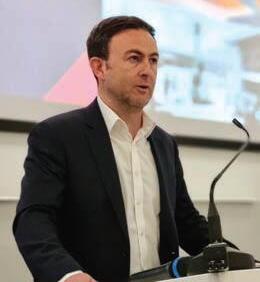
‘A chance for businesses to explore the opportunities in the East Midlands’
Highlighting the opportunities in what is still a tough UK market, SME manufacturing expert Steve Morris said: “We’re the eighth largest country in the world in manufacturing output and then we’re 24th on the index in robots.
“The difference between the two is a lack of productivity because we’re not embedding robotics and automation into manufacturing production process.
“East Midlands Chamber has done a phenomenal job bringing
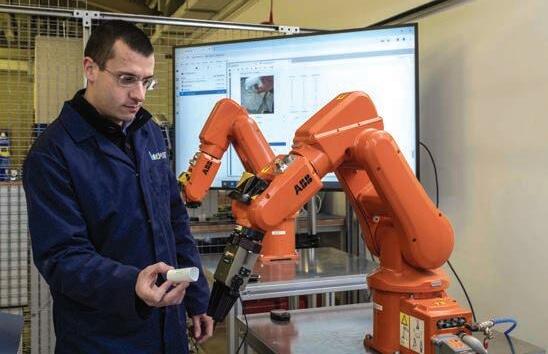

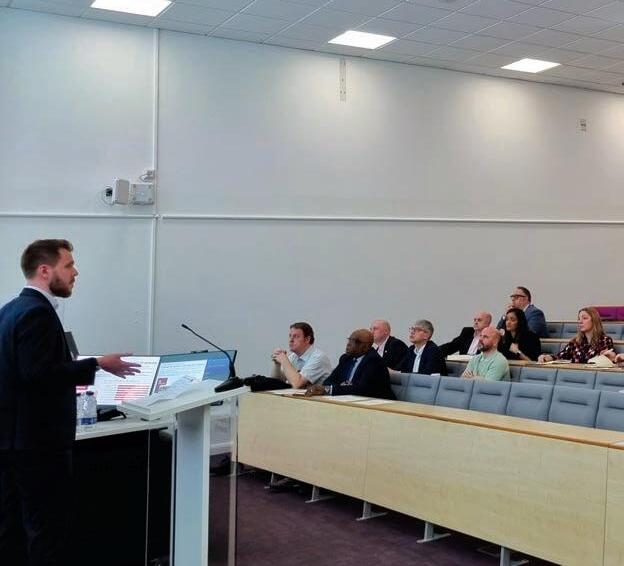
• Stuart Dawkins, president of East Midlands Chamber
• Ioan Reed-Aspley, head of corporate affairs at East Midlands Airport
• Jonathan Rawcliffe, inward investment lead at East Midlands Freeport
• Chris Corkan, Midlands and East of England region director at Make UK
• Professor Nick Jennings, vice chancellor & president of Loughborough University
• Ian Harrison, head of export development at the Department for Business & Trade
• Professor Jan Godsell, dean of Loughborough Business School
• Professor Shahin Rahimifard, professor of industrial engineering at Loughborough University
• Steve Morris, director of SME engagement at the Manufacturing Technology Centre
the ecosystem of manufacturing in the region together.
“We’re all in it together and we’ve all got a part to play and the more that we can join up the dots of all the different ecosystems and partners in the region, optimise the assets we’ve got, we’ll get to number seven very quickly.”
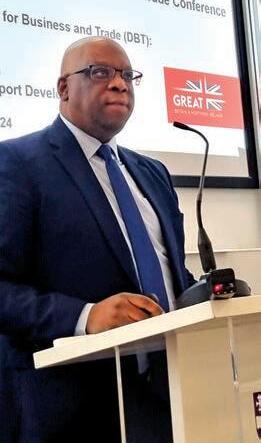
Partners who supported the event were Loughborough University, East Midlands Airport, East Midlands Freeport, Geldards and the Manufacturing Technology Centre.
Professor Nick Jennings, vicechancellor and president of Loughborough University, said: “Here in the East Midlands, we are perfectly placed to maximise the opportunities we have available to us.
“We are in the geographical part of the UK. We have world renowned universities and reserve centres of excellence that provide a talent pipeline for the region and beyond.
“And we have a broad spectrum of industry specialisms, from advanced manufacturing and low carbon energy to space and life sciences.
“We're doing a lot, and with additional investment, we can do a lot more.”
The conference included a panel discussion chaired by Professor Jan
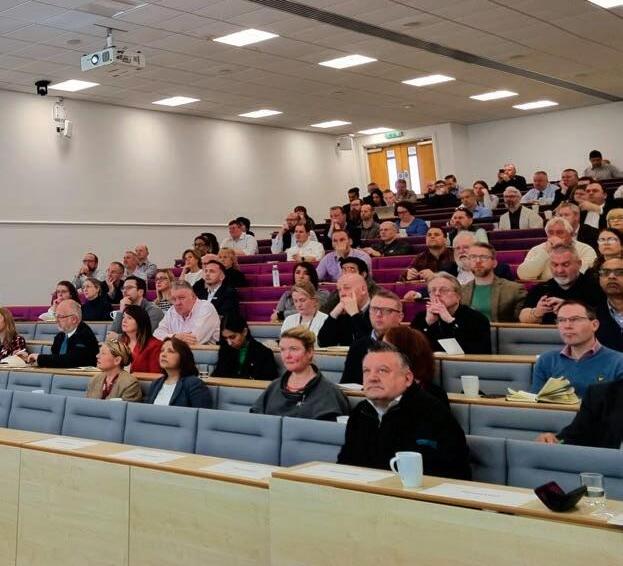
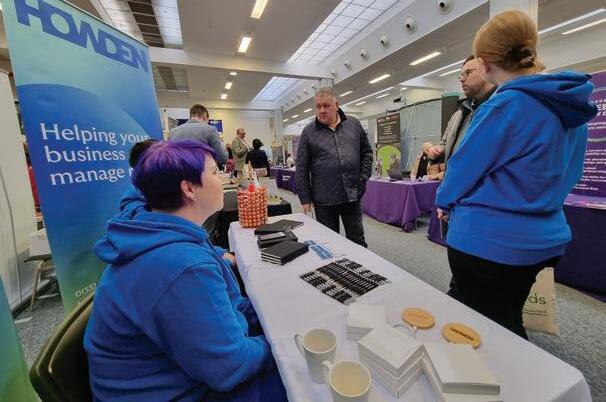
Godsell, dean of Loughborough Business School, which was made up of entrepreneur Sandra Wiggins, of Sandra Wiggins Consulting; Gurpreet Ghataore, robotics and automation technology manager at the Manufacturing and Technology Centre in Coventry – and according to one list one of the top 50 influential women in manufacturing automation – Rachel Quinn, executive director of the East Midlands Institute of Technology, and Martin Horsman, vice-chair of the Chamber-backed Derbyshire Manufacturing Network. They spoke about the importance of manufacturers making the most of their workforce as a key asset – including providing strong career pathways – alongside calling for a long-term UK industrial strategy. They also urged the owners of small and microbusinesses just setting out to be tenacious, persistent and not to be afraid of calling on their peers for support and advice.
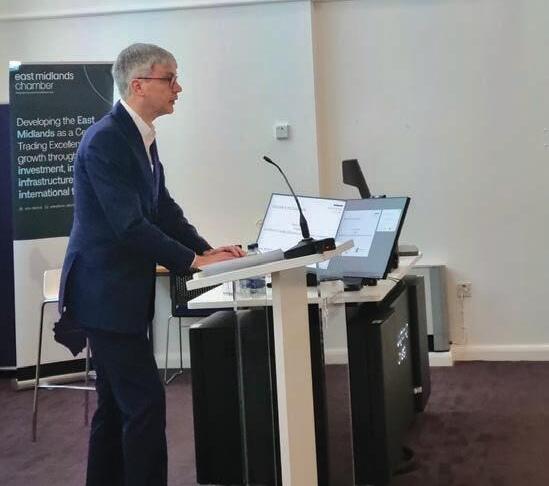
Chamber president Stuart Dawkins (pictured) addressed the 2024 Manufacturing and Trade Conference on why manufacturing is still such a key pillar in the East Midlands economy:
Our local East Midlands economy has always been underpinned by making things. I see that regularly in my role at the Chamber, in my role as a Governor at De Montfort University, and elsewhere.
You will hear lots of references to the Chamber’s Manifesto for Growth, which we launched earlier in March in Parliament.
This sets out what Chamber members want from whichever party wins the General Election due within the next 10 months.
Among the policy proposals, there is also a handy table of economic data about our region.
This shows that the proportion of jobs in the East Midlands in manufacturing is over 11%, compared with a figure of under 8% for Great Britain as a whole.
The East Midlands can honestly say that not only did we start the Industrial Revolution, but we also continue to punch above our weight in making things.
It’s not always been easy, I know, to make and sell things of late. We hear that from our many Chamber members in the sector and see it in official statistics.
1. Ioan Reed-Aspley, head of corporate affairs at East Midlands Airport
2. Chris Corkan of Make UK addresses delegates at the trade conference
3. One of the stands at the 2024 Manufacturing and Trade Conference at Loughborough University
4. One of Loughborough University’s smart robotics, dissembling and remanufacturing medical devices
5. Ian Harrison, head of export development at the Department for Business & Trade
The list of influences is well known. They include the predictable own-goal which is Brexit, a pandemic, a war in Europe, a banking system which sometimes seems not really to understand manufacturing, and a political environment which has too often lacked the stability that business desires.
And yet, and yet … here we all are! Representing a region that has manufacturing and trade at its heart.
And on to trade – we are a maritime nation although, to be honest, we in the East Midlands are not a maritime people. And yet we have exported and imported along with the best of them.
We have the second largest cargo airport in the UK together with the nation’s only non-coastal freeport right at the heart of our three counties.
They are, of course, located adjacent to thriving logistics hubs and the developing hub for new energy technologies around West Burton.
In my time as Chamber President I have repeatedly referred to the unique opportunity this provides for our three counties of Derbyshire, Leicestershire and Nottinghamshire.
The vision of a powerful technology, manufacturing and trade cluster at the heart of our three counties sitting in the heart of our country could be transformational.
I do hope that the imminent creation of a combined mayoral authority that includes Derbyshire and Nottinghamshire, but not Leicestershire, does not inadvertently result in that vision being harder to achieve.




East Midlands Chamber has welcomed news that more than 1,000 jobs are set to be created by Rolls Royce in Derby to support its work in the AUKUS nuclear submarine programme.
First announced in September 2021, AUKUS is a trilateral security and defence partnership between Australia, the UK, and the US that will see the countries nations work together on a range of capabilities, including a conventionally armed, nuclear-powered submarine capability for Australia.
Rolls-Royce Submarines will build the nuclear reactor while British firm BAE Systems will partner with ASC Pty Ltd to build the actual subs – and now it has been confirmed that Australia is going ahead with its investment in the plans.
That contract will be added to existing UK investment to help meet the needs of the Royal Navy.

‘It’s tremendous to see this opportunity create many highly skilled jobs’

City Council giving the green light for Rolls-Royce to redevelop the Raynesway site. The new jobs being created will include manufacturing and engineering roles.
The submarine builder deal follows months of negotiations and is being hailed as a monumental success for British industry.
This Australia investment, alongside funding from the UK Ministry of Defence, will enable the Rolls-Royce Derby site to double in size, with a further 1,170 highlyskilled jobs created.
Rolls-Royce Submarines president Steve Carlier said: “Last year we were proud to welcome
the Hon Richard Marles MP, Australia’s Deputy Prime Minister and Minister for Defence and UK Defence Secretary Grant Shapps to our Raynesway site and showcase some of the world-class manufacturing and engineering capabilities we have developed over the last 60 years.
“This commitment of funding to our existing expansion work shows the trust Australia places on our nuclear expertise and our ability to deliver.
“We look forward to working with the Australian Submarine Agency to support them in building their own fleet of nuclear-powered submarines.”
The jobs are part of the 7,000 additional British jobs that the UK’s and Australia’s AUKUS submarine programme will generate through their life.
At the peak, there will be more

than 21,000 people working on the SSN-AUKUS programmes in the UK – concentrated in Barrow-inFurness and Derby.
East Midlands Chamber chief executive Scott Knowles said: “The huge number of jobs that will be created at Raynesway is very positive news for Derby and the surrounding region.
“This added investment into the project underlines the solid commitment Rolls Royce have placed in the engineering and manufacturing expertise that Derby has in abundance.
“It’s tremendous to see this opportunity create many highly skilled jobs and continue to position Derby as a leading city in UK manufacturing. This will also help grow the region’s economy far beyond Derby, supporting the wider supply chain and giving those within it future stability.”
Gross Domestic Product (GDP) has grown for the second month in a row, up 0.1% in February, according to new estimates published by the Office for National Statistics.
The figures are being seen as a potential sign that the UK economy could be heading out of recession.
East Midlands Chamber chief executive Scott Knowles (pictured) said: “A second month of GDP growth gives confidence that the economy continues to turn the corner and that the exit door from the ‘technical recession’ declared earlier in the year is even closer.
previous month is encouraging.
“There’s resilience in business in the East Midlands and this was echoed in our Quarterly Economic Survey where respondents reported lifts in turnover and profit expectation for 2024 along with strong UK sales and order books.

“While these indicators give some reassurance, the underlying challenges facing businesses in the East Midlands remain.
Innovation and Investment.”
David Bharier, head of research at the British Chambers of Commerce said the figures suggest the UK economy could be stuck on a “low-growth treadmill”.
He said: “With GDP growth of 0.2% in the three months to February, and 0.1% on a monthly basis – there’s little sign of the landscape changing soon. However, it may indicate that the technical recession ended at the end of last year.
“Firms are still facing significant cost pressures from historically high inflation and interest rates, skills shortages, and even more trade barriers with EU. Businesses desperately need a long-term economic plan that drives investment and innovation.”
“To see 0.1% in growth hot on the heels of 0.3% growth in the
“The building blocks that will get the region where it needs to be were outlined in our Manifesto for Growth 2024 that we took to Westminster in March, calling for public sector backing against our business-led four I’s of Infrastructure, International Trade,
“Boosting business investment is fundamental to securing stronger economic growth. While business confidence remains buoyant, our latest Quarterly Economic Survey published yesterday showed continued tough business conditions with most SMEs not increasing their investment.
William Bain, head of trade policy at the British Chambers of Commerce, said: “It is difficult to draw concrete conclusions from a single month’s data, but there are signs of a nascent improvement in import and export volumes as global demand slowly recovers.
“The Office for Budget Responsibility’s recent analysis also indicated we should see a modest improvement in net trade this year. But data for the last three months of UK trade, overall, remains challenging.”

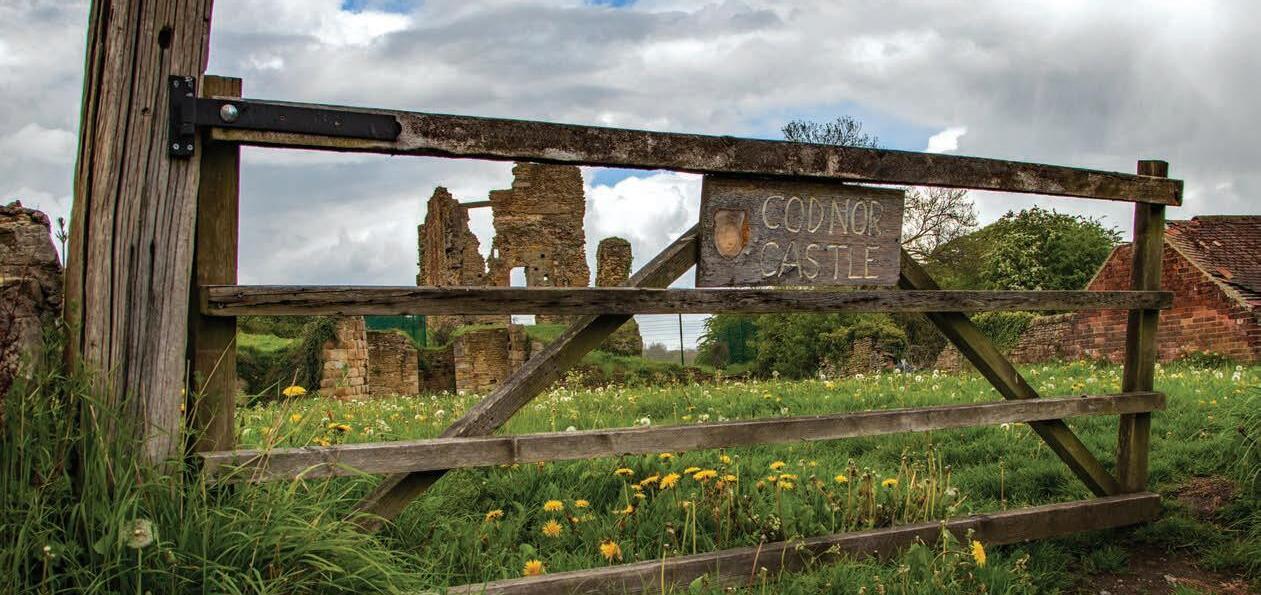
Business Peak District (BPD) is a free membership organisation for businesses in the area covered by the Peak District National Park, High Peak, Staffordshire Moorlands and Derbyshire Dales. Its principal supporter is East Midlands Chamber, however it also works closely with local councils, the Peak District National Park Authority, Visit Peak District and Derbyshire and the University of Derby. BPD has more than 700 members and its aim is to deliver its vision of a Peak District with a distinctive, high quality, rural environment and an enterprising, growing and sustainable economy, in which businesses act with a social and environmental conscience. Here we continue our regular series featuring businesses that have benefitted from the support BPD offers. To find out more e-mail members@businesspeakdistrict.com.
Wellbeing4Life was born from personal experience of burnout. Whilst I wouldn’t ever wish to feel that way again, I am grateful to that experience as the journey it took me on sparked a passion that would lead to a more resilient me and open up a whole new world of self-employment doing something that I love.
Of course, it didn’t happen overnight. I retrained and continue to learn in order to deliver a credible and evidence-based service. Wellbeing4Life will be 10 years old this year.
We’ve learned a lot about what works (and what doesn’t) during this time and have created our own unique approach. Our clients are often in sectors with increased risk of poor mental health; often the very groups of staff who are hardest to engage and struggling the most.
We enjoy this challenge and the personal reward is huge. Our experience enables us to build trust and credibility at all levels of the business, leading to real change.
We take great pride in our collaboration with Heidelberg Materials, a company that faces many industry-specific challenges that can potentially negatively impact employee mental health. These challenges include a predominantly male workforce, unsociable working hours, isolated job roles, harsh physical environments, an aging workforce, and high-pressure situations.
Thanks to the efforts of a dedicated and proactive executive team, and the creation of a new role focused solely on this issue, we have trained nearly 200 Mental Health First Aiders over the past three years. Our ongoing support, webinars, and awareness campaigns have empowered all employees to take charge of their own wellbeing.

Elain Crewe (pictured) is a mental health trainer and coach based in the Amber Valley, Derbyshire. She explains what her business Wellbeing4Life does, and how the BPD has helped it.
The final piece of the puzzle was to provide training and support to line managers.
In late 2023, Wellbeing4Life was tasked with creating and delivering an innovative new program.
While most managers welcomed the training, some expressed concerns about adding another responsibility to their workload, feeling illequipped to discuss mental health issues, or feeling that it was not part of their job.
However, when 92% of attending managers rated the course as outstanding or good, we were thrilled. They reported feeling more confident in their roles, and many shared stories of how the training had led to transformative conversations, improved relationships, and increased positivity and productivity within their teams. In fact, the course had such a positive impact that it is being submitted by Heidleberg Materials for a construction industry award. Watch this space.
Working and living in the beautiful Amber Valley boosts my wellbeing but also brings some challenges.
Working in a rural environment can get lonely and so it’s important to be proactive in connecting with others.
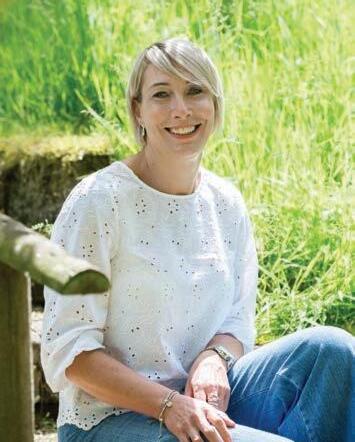
There are also a number of businesses operating across the Peak District that face particular challenges in relation to wellbeing. However, there is real opportunity to support these businesses and their teams leading to a thriving Peak District business community.
I love being part of the community in which I live and work – it helps me to feel connected and this has a positive impact on my mindset and my businesses success. Business Peak District offers the opportunity to get this connection and I am really looking forward to getting to know members better.
It’s all about relationships; taking time to get to know our clients, building trust and understanding their needs.
That’s why the next two years are about developing more of these meaningful relationships.
The reality is that most new clients start small, through which we get to know each other better and start building a meaningful partnership and a strategic approach that can truly create a positive workplace culture.
These meaningful relationships always start in the same way: a conversation. So, I would love to have a chat with anyone who is struggling personally or wants to explore options for supporting their workforce and let’s see where it leads.

East Midlands Chamber was represented at an annual Strictly Glitterball fundraiser in aid of a charity which supports disadvantaged children and communities in Sri Lanka and Nepal.
The dazzling evening was in support of the Rosie May Foundation at Kelham Hall in Newark.
This year’s dancers included Chamber membership account manager Luke Spence who, with dance partner Zoe Twells from Frank Innes, raised more than £1,500 towards the grand total of more than £37,000.
The foundation was launched by Graham and Mary Storrie as a living legacy to their daughter Rosie May, who was murdered in December 2003, aged just 10.
Over the years the Leicestershire charity has helped empower thousands of women and children, especially girls, to build positive and more resilient futures.
The family has a particular link to Sri Lanka as they were holidaying on the island a year after Rosie May died, when the 2004 Asian Tsunami struck. They were told at the time that they were lucky to be alive.
The foundation joined the Chamber last year and since then has picked up accolades at the Enterprising Women and Nottinghamshire Business Awards.
‘The night itself was incredibly high energy’
Charity chief executive Mary Storrie said it needs to raise £250,000 each year to keep going and grow.
She said they joined the Chamber to help raise exposure and create awareness of the work they do – and attract funding through new partnerships.
She said: “Strictly Rosie May is a perfect example of this approach. We offer 10 free dance lessons… the Mary Kirsten School of Dance has now donated this incredible opportunity for the last two years, teaching couples to dance in just 10 weeks who then go on to compete for the converted glitter-ball in our live show.”
Eight couples competed on the night – including colleagues from Graypaul Ferrari, Global HSE and Encore as well as couples from independent businesses and teachers – performing for an audience of 300 friends, family and colleagues.
Mary said: “The night itself was incredibly high energy. The winners Anna and Johnathan from Greypaul Ferrari raised over £8,000 towards the total – Anna described her journey as life-changing.”
The Foundation’s first initiative was the Rosie May home for girls in Sri Lanka, built for children who lost parents in the tsunami.
It also backed Project Hope in Sri Lanka, helping thousands of vulnerable families living on or below the poverty line. It helps women become financially independent so they can care for their family and not have to make the heartbreaking decision to relinquish their children to an orphanage. The charity says it has had a 100% success rate in keeping families together.
Following devastating earthquakes in Nepal the 2015, the foundation rebuilt an earthquake resilient primary school in the lower Everest region, saving children with no access to education from trafficking. It has also supported a women’s farming cooperative in rural Nepal, helping them grow cash crops to support their families and reintegrating female survivors of trafficking and domestic violence back into their communities.




In the glamorous world of entrepreneurship, where success stories dominate headlines, it’s crucial to peel back the layers and examine the harsh realities faced by those courageous individuals running small businesses on their own. Behind the scenes, away from the spotlight, lies a battlefield strewn with challenges that can make or break the dreams of many solo entrepreneurs.
Running a small business means wearing multiple hats – from CEO to janitor. Every decision, big or small, rests on your shoulders alone. The burden of responsibility can be overwhelming, as the consequences of even the slightest misstep reverberate throughout the business.
While collaboration is often hailed as a key to success, the reality for solo entrepreneurs is quite different. You navigate the business landscape alone, with no partner to share the load or bounce ideas off. The solitude can lead to isolation, impacting both decision-making and mental well-being.
Resource constraints are the Achilles’ heel of small businesses. Limited funds, manpower, and time create an environment where every resource must be stretched to its limit. This juggling act can result in burnout, affecting productivity and jeopardising the very foundation of the business.
Cash flow is the lifeblood of any business, and for solo entrepreneurs, managing it can feel like a high-stakes tightrope walk. Uneven income streams, unexpected expenses, and the constant fear of financial instability require a meticulous balancing act that can leave even the most seasoned entrepreneurs on edge.
Solo entrepreneurs are the ultimate multitaskers, often handling roles that span marketing, finance, operations, and customer service. The


need for versatility is non-negotiable, but the toll it takes on one’s energy and focus is undeniable.
Unlike larger corporations, small businesses often lack the safety nets of extensive legal, HR and financial support. A single legal hiccup or unexpected crisis can send shockwaves through the foundation of a solo-run enterprise, leaving the entrepreneur scrambling for solutions.
The relentless pursuit of success can sometimes trigger imposter syndrome – the nagging feeling that you’re not qualified or competent enough for the role you’re playing. Solo entrepreneurs must constantly grapple with self-doubt,
learning to overcome it to make bold decisions and lead their businesses forward.
In summary, the journey of running a small business on your own is not for the faint of heart. It demands resilience, adaptability, and an unyielding commitment to your vision. While the path may be laden with obstacles, it is also a testament to the indomitable spirit of those who dare to dream and persevere against all odds. To all solo entrepreneurs out there - your struggles are not in vain and your resilience is the beacon that illuminates the path to success. Executive Insight Exchange are keepers of the beacon of inspiration. They embrace change and face challenges without fear, because they can relate to the realities of solo entrepreneurship.


There are 5.5 million SME owners in the UK, each on their own bumpy journey with unexpected twists and turns - let us smooth the road ahead for you.
Regardless of your approach, one thing is certain - you’ll reach your goals more swiftly with support.
Ambitious entrepreneurs, business owners, CEOs and MDs become members of Executive Insight Exchange because they seek to connect with other like-minded executives through a trusted leadership experience that yields professional and personal growth.
This is where leaders gain fresh perspectives, achieve clarity and receive support to navigate significant decisions.
Here, you can exchange expertise and encourage one another to think critically, leading to better outcomes.
Through ongoing collaboration you can cultivate lifelong leadership excellence that enhances companies, bolsters performance and encourages sustainable growth.
Executive Insight Exchange is tailored for top executives entrusted with their company’s most crucial decisions.






Chris Hobson, the Chamber’s director of policy & insight, has announced that he is leaving the organisation to start a new life with his family in Canada, leaving the Chamber at the end of June.
Chris has been a key part of the Chamber’s senior leadership team for more than a decade playing a part in shaping the direction it has taken over the years. He recently helped draw up the Chamber’s 2024 Manifesto for Growth which hopes to play a part in influencing government policy over the coming months.
Following an internal recruitment exercise Richard Blackmore –currently head of special projects at the Chamber – has been appointed as Chris’ successor.
Chamber chief executive Scott Knowles described Chris’s departure as being a big loss for the organisation.
He said: “This June, after 11 years, the Chamber says goodbye to Chris Hobson, director of policy & insight and we wish him well on his new life in Canada with his wife Heather and family.
‘Chris has been integral to the growth and success of the Chamber, always seeking to be the voice for business’
“Chris has been integral to the growth and success of the Chamber, always seeking to be the voice for business and the architect of change for the business community over the last decade plus and he will be greatly missed by his Chamber family and our members, strategic partners and patrons.
“As well as being an important part of the Chamber’s senior leadership team, he’s been a great support to me in my role and a good mate too.
“Chris will be succeeded by Richard Blackmore as director of policy & insight. Rick’s been with the Chamber since Autumn 2023 but has been well known to many of you for years before that.
“Congratulations on the appointment Rick. We look forward to working with you on the Chamber’s policy and representation campaigns.”
Chris said: “The move obviously comes with the sadness of having to leave the East Midlands Chamber family after what has by every measure been the best decade of my working life – best in terms of personal growth, impact, the relationships developed, and above all, fun.
“I’ll really miss it and I’ll really miss all of those that I’ve been able to work with over this past decade. I’m delighted to say that my role will be taken on by Rick, someone who I hold in massive regard and whose acceptance of the job has made the move so much easier.”
While no longer a Chamber employee, Chris will continue to support delivery of the Local Skills Improvement Plan until the end of March 2025, a project which he helped establish as a trailblazer in Leicester & Leicestershire back in 2022.
East Midlands Chamber is running a publicity drive called Joining the Dots to make it easier for members to navigate through all the services it offers – with members sharing their thoughts on what the Chamber means to them. This month we hear from Pritti Allen (pictured), head of communications at housing provider emh group.
Since its establishment in 1946 to provide homes for penniless exservice personnel in the Coalville area, emh has grown to extend its reach across the East Midlands in over 45 local authority areas.
The last two decades has seen the most rapid growth – from 8,000 homes, a turnover of £19m and 245 employees – to a large and complex not-for-profit housing and care organisation with 22,000 homes, £130m turnover and 1,100 employees.
We aim to deliver up to 500 new affordable homes a year through our Homes England strategic partnership.
‘A range of opportunities to learn from each other; share good practice’
Over the past five years, 248 colleagues have undertaken an apprenticeship, including 79 currently on an apprenticeship programme.
We also support community organisations such as food banks and community centres through local partnerships and work actively with our local authority partners to help regenerate disused neglected sites by creating much needed high-quality homes.
Supporting residents with the challenges of the cost-of-living crisis is an important part of emh’s work.
Over the past two years our financial inclusion team helped residents claim a total of £4m in benefits and other support. Emh has a resident support fund to help residents with essential basic items as well as furniture and carpets when moving into a new home.
Through a community-led partnership, emh developed Europe’s largest social rent Passivhaus scheme of 68 homes in the Saffron Lane area of Leicester which won several awards.
Emh also has specialist rural team which helps rural communities address local housing need – and is also known for its

flagship extra-care schemes for the over-55s which promote independence as well as tailored support and are very popular.
Emh has been a Chamber member for around 10 years and we see ourselves as an integral part of the region’s business community. Our membership provides a range of opportunities to learn from each other; share good practice; contribute to policy discussions and develop new partnerships that could help maximise positive outcomes for the business and wider communities within the East Midlands.
Membership of the Chamber has also provided emh with an opportunity to raise awareness of the social and economic value that housing associations contribute within regions and nationally.
We found that the annual Chamber awards gave us an opportunity to support and recognise the work others do in our communities through our sponsorship of the Community Impact Award and the Celebration of Culture and Communities.
Our Chamber strategic partnership focus on EDI brings together our joint desire to promote the opportunities and benefits of EDI within the business and local communities.
Without the chamber we wouldn’t be able to collectively influence and collaborate in the way we do –which would be a great shame.


Upcoming workshops and webinars include:
15 May: Practical Guide to Leadership and Management, Chesterfield
16 May: Using ChatGPT for Your Business, Mansfield
21 May: Developing Your E-Mail Marketing Plan, Derby
23 May: Using ChatGPT for Your Business, Derby
29 May: Making the Most of Google Analytics, Nottingham
30 May: Generating and Winning New Sales, Nottingham
4 and 11 June: Accessibility Champions, Derby
5 June: Carbon Management in Business, Nottingham
11 June: Green Your Business: Save Money and Attract New Visitors, Derby
22 and 23 May: Carbon Literacy for SMEs
7 June: Food Labelling and Nutritional Information Legislation
28 June: Principles of Preservation and Shelf-Life Assessment
17 July: Carbon Reduction Planning to Science-Based Targets: Enabling the Pledge to Net Zero
To view our upcoming Accelerator workshops and to book your place, please visit: https://bit.ly/Accelerator Events
There is no limit to the number of workshops or webinars you and your colleagues may attend.
THE UK SHARED PROSPERITY FUND
The UK Shared Prosperity Fund is central to the Government’s Levelling Up agenda, providing £2.6bn of funding for local business, and people and skills by March 2025.


The Accelerator helps businesses across the East Midlands to start, sustain, grow and innovate. It is funded and tailored to the needs of each participating district by the UK Government through the UK Shared Prosperity Fund (UKSPF) and East Midlands Chamber.


Reducing your carbon footprint does not just have environmental benefits – it helps you become legislation compliant, supports your procurement and tendering process, presents competitive advantage, satisfies stakeholder needs, builds resilience, reduces costs and reputational risk and often sits at the heart of technological investment.
There is a broad range of support on offer from the Accelerator project to help you get there – from bitesized webinars to accredited training, energy audits and grant funding.
Getting staff buy-in to sustainable practice is key to any sustainability plan. The Chamber's webinar programme includes topics that address the challenges businesses face transitioning to carbon neutrality, along with identifying what the benefits are and where legislation may drive change.
Too many companies have been making 'green' claims (labelled as greenwashing) without being able to measure or verify these claims.
New legislation aims to help make sure claims, whether used in tenders, marketing or advertising, are based on clear, objective and publicly available commitments.
It is a subject tackled in the Chamber's 'Not all footprints, verifications & offsets are the same!' webinar, delivered by Julie Adams
at Auditel, a cost, procurement & carbon solutions company.
Other webinar topics include ‘Carbon reduction planning to science-based targets: Enabling the pledge to Net Zero’, as well as ‘Decoding the ISO and PAS standards on the Net Zero journey’ and ‘PAS2060 is retiring, long live the ISO!’.
Businesses seeking more in-depth learning can take part in carbon literacy and management training.
The Accelerator project's carbon literacy course (delivered online as two half-day sessions) is designed to increase awareness of the carbon costs and impact of our everyday activities and help us cut reduce emissions.
The training helps businesses acquire the knowledge and skills to lower their own carbon footprint and reduce the emissions at their place of work, typically by 5-15%.
Carbon literacy certification, which is awarded following completion of the course, provides evidence backing up your business’s sustainability goals. The next course, delivered online, runs on 22-23 May.
Carbon management training is also being offered, as a one-day inperson workshop. Delivered by NTU, the course is suitable for managers and staff members who would like to understand carbon management, measure their carbon
footprint and develop a decarbonisation plan for their firm.
The next course takes place in Nottingham on Wednesday 5 June.
An energy audit will review your business’s energy consumption patterns using gas and electricity bills (as well as fuel consumption for businesses with a large fleet of vehicles). A site visit will use equipment such as cameras, infrared temperature sensors, energy monitors and temperature data to build an energy savings opportunity report – useful to cut costs and help with grant applications.
The Accelerator's Business Energy Grant scheme offers capital grants of £10,000-£30,000 (depending on location) towards agreed energy saving measures.
Targeted at businesses with up to 49 employees, it is designed to enhance business resilience, stimulate enterprise and innovation, access new markets, and encourage green business growth. It can be used to increase productivity, purchase equipment, introduce new processes and techniques, export, and introduce new products or services.
The Chamber team can advise on alternative funding in districts where the Energy Grant scheme is not on offer.
The Old Rectory Spa, in the district of Newark & Sherwood, is a familyrun wellbeing retreat providing holistic treatments and spa experiences.
It opened in 2022 in the middle of a cost-of-living and energy crisis which not only affected customer spending, but meant the business faced a sizeable heating and electricity bills.
To help, the Accelerator project funded a full energy audit and became a key part of the business's decarbonisation and sustainability strategy.
The spa has undertaken practical
steps such as removing the use of unnecessary single-use items and looked into solar panels and individual heat pumps for the hot tubs. It is thought heat pumps could cut hot tub power by twothirds from the current £100 average per tub per month. With support from Chamber business adviser Richard Crowden, the spa has also benefitted from further interventions through the Accelerator project, including a Growth Voucher enabling the business to work with a local brand consultancy to raise awareness of the spa and grow revenue.

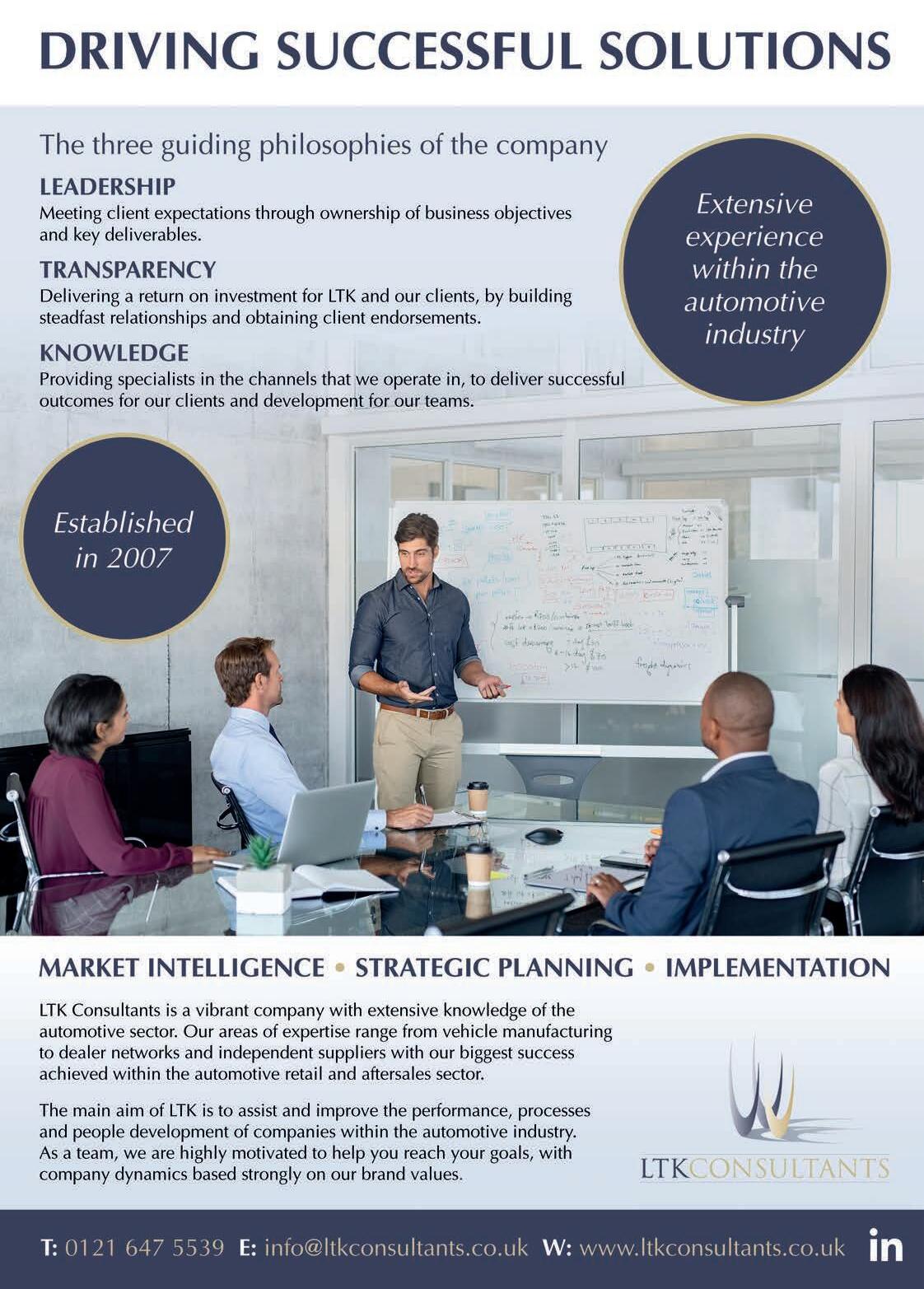

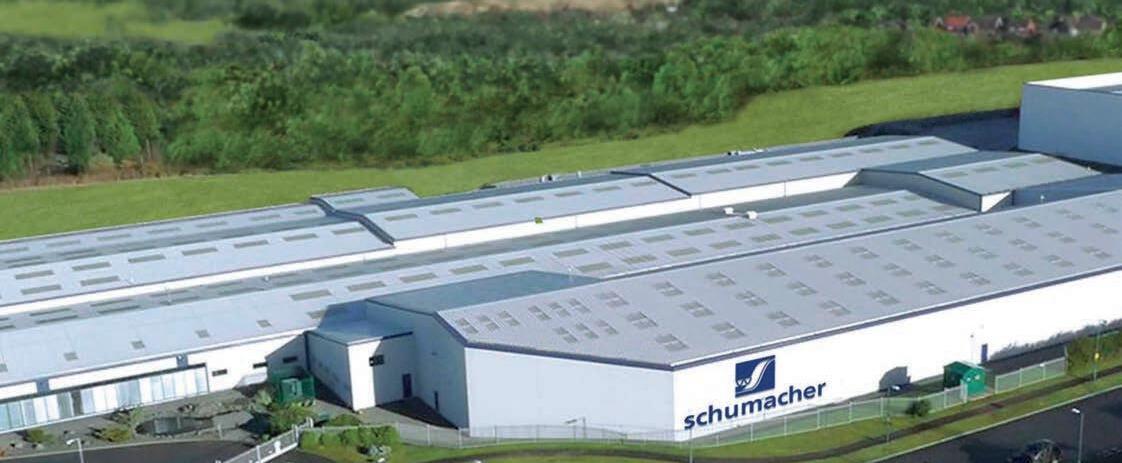

The Schumacher Packaging Group, one of Europe’s largest manufacturers of customised packaging made of corrugated and solid board (www.schumacher-packaging.com), successfully continued its dynamic growth course in 2022.
This year, the company celebrates its 75th anniversary and is investing more in sustainability: the focus is on expanding renewable energies and reducing plastics in packaging by using natural raw materials. By 2025, Schumacher Packaging plans to invest around €700m in the expansion of existing plants and the construction of new ones.
For 2023, however, the focus is on sustainability. This is because the packaging specialist is pursuing the ambitious goal of climate-neutral production by 2035 and is therefore relying on the most modern, efficient and environmentally friendly technologies. Around €45m is being invested in the construction of solar power plants, and €10-20m is earmarked for the expansion of wind energy. Currently, a solar park is under construction at the German site in Forchheim, and two more parks are being built in Poland.
The construction of five more solar power plants in Germany and Poland is planned for 2023 and 2024. The total output of all photovoltaic plants will be around 12 GW/h.
Replacing plastics sensibly
With its innovative solutions made of corrugated and solid board, Schumacher Packaging has grown continuously over the past 75 years and

has become one of the largest family-run packaging companies in Europe.
At the start of the anniversary year, company boss Björn Schumacher, who runs the company in the third generation with his brother Hendrik, explained: “Along our anniversary motto ‘Unboxing the Future of Packaging’, we are pursuing clear goals for the future. We see considerable potential to make packaging even more climate-friendly across the entire value chain. That’s why we want to further reduce the proportion of plastics in packaging across all sectors and replace it sensibly with the natural raw material paper.”

To achieve this, the family-owned company is leading the way in the industry: it provides information, works on innovations and seeks dialogue with stakeholders. The management assumes that more than one fifth of the plastic packaging currently used can be replaced by paper-based solutions. By using plastic-free, biobased barrier coatings, packaging with protective functions can be produced that can be fully recycled. Plastics can thus be completely replaced - with the greatest potential in the food industry.
Corrugated and solid board as the basis for a sustainable circular economy
Sustainability is of great importance to Schumacher Packaging’s business. “The biggest advantage of paper-based packaging is that it is
completely natural. They are not waste, can be returned to the material cycle 100 per cent or decompose in nature within a short time without leaving any residues. Currently, more than 85 per cent of corrugated and solid board packaging is recycled – this means that it is reprocessed into packaging after use. Unlike plastic-based reusable systems, no CO2 is emitted during return transport and cleaning,” said Björn Schumacher. “We exploit this potential by leading the way and constantly developing new industryspecific and sustainable products. In this way, we can offer long-term security of supply and be a reliable partner - now and in the future.”
Raw material supply and security of supply still important
Despite the difficult economic situation due to the Ukraine war and the sharp rise in energy prices, Schumacher Packaging 2022 managed to grow.
The packaging manufacturer reacted flexibly and quickly in the crisis year and was thus able to guarantee supplies to its customers. Strategic decisions contributed to this, such as the acquisition of the Kaierde cartonboard mill, the majority stake in the Italian corrugated base paper manufacturer Cartiere Modesto Cardella SpA and the acquisition of the Leipzig Land GmbH cartonboard mill.
“The consistent expansion of our production and processing capacities represents an important contribution to securing the market's supply situation in the future and is part of our strategy for the future,” said managing director Hendrik Schumacher.

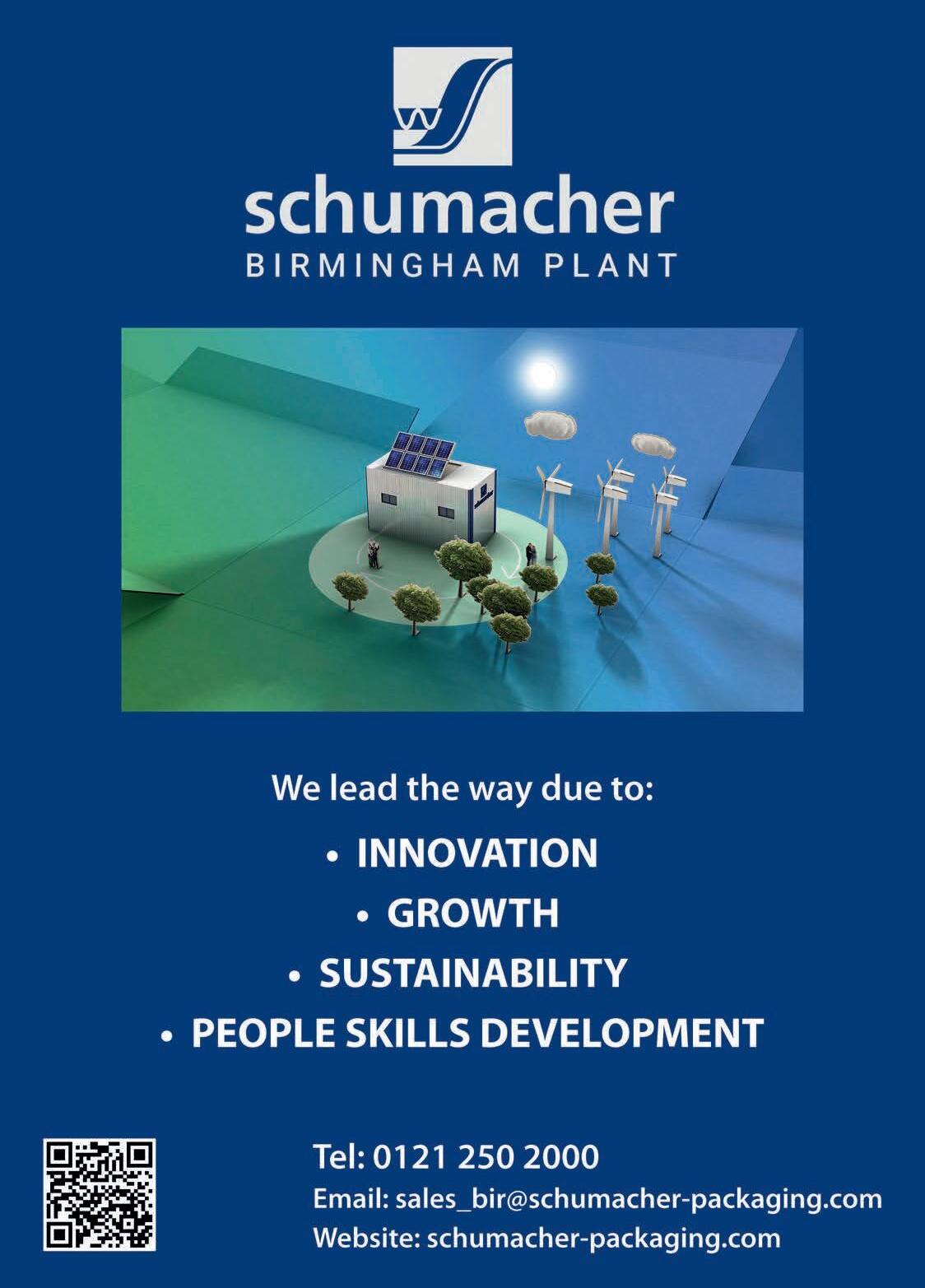

The PA Forum annual Learning & Development Conference is back for the seventh year, bringing together and celebrating the people who work in executive and business support roles across the Midlands.
The conference will include a programme filled with inspirational, aspirational, educational and motivational content where PAs, EAs, secretaries, administrative assistants, office managers and business support managers will be able to pick up new ideas and tangible action points that could benefit any business.
The event is run by Midlands events organiser, sector support body and networking specialist PA Forum with support from the Chamber.
It will take place in partnership with Lucy Brazier, chief executive of Executive Support Media, who will MC the conference and share the day with everyone who attends.
It takes place from 8am to 5pm on 5 June at Millennium Point, Birmingham. Keynote speakers and breakout sessions will include:
• “In the blink of an AI” – Artificial Intelligence with Professor Corinne Hoisington
• “Find your voice – How to truly be heard in business!” Speaking Confidently with Nick Elston
• “Learn the path of Victim to Victor” Bounce Forward with Rebecca Mander
• “Governance and Effective Decision Making” Solutions Focused with John Bullock
• “Embrace Innovation” Lego Serious Play with Afshan Baksh
• “The Power of Adaptability” with senior executive assistant Claudine Martin
• “Smarter Goal Setting” with Lindsay Taylor, of Your Excellency
For more information and to join, email daniel@pa-forum.co.uk quoting ‘Conference’ in the subject line.
Meanwhile, there are opportunities for businesses to support one of the other big events on the region’s 2024 corporate calendar – the East Midlands PA Awards.
The awards return for a second year this September, and celebrate the achievements of all the professionals across the region who offer business and executive support.
Nottinghamshire, Derbyshire and Leicestershire business people interested in finding out about the conference or the awards can contact: Daniel Skermer, founder, PA Forum
– Daniel@pa-forum.co.uk and Lesley Young, executive support manager, East Midlands Chamber Lesley.Young@emc-dnl.co.uk
Preparations are continuing for the 2024 Westfield Health British Transplant Games which take place in Nottingham from 1-4 August.
Run by the Transplant Sport charity, the games aim to raise awareness of the life-saving benefits of organ donation and celebrate the gift of life.
The inclusive event brings together teams from hospitals across the UK to compete in more than 25 sports, with people of all ages and abilities competing including children as young as five.
Almost 3,000 people are expected to join in the celebration of life in venues across the city and county, including more than 1,000 transplant recipients taking part and 2,000 supporters cheering them on over the four days.
‘I strongly encourage everyone in the local area to get involved with the Games’
The games were launched to encourage a sense of community, bringing together transplant recipients from across the country to meet other people with similar experiences and encouraging them to stay active through sport.
The Donor Family Network is also integral to the games – bringing together the families of loved ones who have donated an organ and given the extraordinary gift of life to people in critical need.
The games are possible thanks to the support of partners Westfield Health, Kidney Care UK, Anthony Nolan, NHS Blood & Transplant, Extra Motorway Services, B. Braun Medical and Icon Creative Design.
Nottingham is a major UK transplant centre, so this year’s event will be especially important and local partners who have committed to financially support the games include Nottingham Hospitals Charity, Nottingham City Council, Nottingham Venues, Nottingham Trent University, University of Nottingham and the Nottingham Organ Donation Committee.
It is estimated the event will generate £2.4 million for the city of Nottingham and highlight the range of facilities the area has to offer.
Events will take place in venues across the county including Nottingham Trent University Clifton Campus, Harvey Hadden Sports Centre, Ross Centre and Wollaton Hall – thanks to the

Attendees at last year’s British Transplant Games, which took place in Coventry
support of Nottingham Venues.
Each year, around 250 volunteers are involved and the Nottingham community is encouraged to come and support the games, with volunteering applications opening soon.
Tim Reddish CBE DL, is chairman of the 2024 British Transplant Games and a former Paralympic swimmer who was born and raised in Nottingham.
After being diagnosed with a hereditary degenerative condition that eventually caused him to lose his sight, he became a paraswimmer, and after a career as a Paralympic swimmer, became chairman of the British Paralympic Association and an avid supporter of the games.
He said: “The British Transplant Games are an exceptional event that I have been a supporter of for many years, and it is fantastic to be able to host them in my home city of Nottingham this year. I strongly encourage everyone in the local area to get involved with the Games, be it through competing, supporting, or volunteering, and witness first-hand the amazing impact of organ donation.”
The Chamber launched the East Midlands Manufacturing Network in March 2022.
There are six networks running across the East Midlands in Derby, Derbyshire, Leicester, Leicestershire, Nottingham and Nottinghamshire, each network meets every eight weeks throughout the year.
The network already covers the whole of the East Midlands, with branches in the cities of Nottingham, Derby and Leicester as well as the counties of Nottinghamshire and Derbyshire.

Between them they have 400 members, including companies such as Derby medical product manufacturer Pennine Healthcare, Castle Donington moulding and woodworking specialist Gordon Ellis and Co and Derby drill and cutting tool maker MA Ford Europe.
A new branch was recently created covering the county of Leicestershire and based in Loughborough – an important historical centre for manufacturing as well as further and higher education.
Membership is free and open to manufacturers of any size. It also entitles members to complimentary membership of Make UK.
The criteria for joining the network are:
• You are a senior manager or leader
• Your business is based in the Derbyshire, Leicestershire or Nottinghamshire
• Your business makes something.
For details visit: https://emmn.co.uk

Entries have opened for the East Midlands Chamber Business Awards 2024 which will showcase the achievement and resilience of businesses across the three cities and three counties.
Following a challenging trading environment over the last year, organisations and individuals are invited to put themselves forward for recognition of their achievements.
Businesses from across Derbyshire, Leicestershire and Nottinghamshire can apply for the 13 category awards, including Excellence in Innovation, Outstanding Growth and Business Improvement Through Technology.
Finalists will be revealed in an announcement at the President’s Summer Celebration event on 21 August, followed by a virtual judging process.
‘The Chamber Business Awards recognise the remarkable achievements of the region’s business community’
TV presenter Emma Jesson will be hosting the awards which take place later in the year. Entries for the awards need to be submitted by 19 July.
A Business of the Year is chosen from the winners in each county and selected firms will go through to the regional and national British Chambers of Commerce Awards.
East Midlands Chamber chief executive Scott Knowles said: “The business community across the East Midlands has had to grapple with several years of high costs, a slowly recovering economy and a climate of political uncertainty, yet the region’s resilience, creativity and innovation continually shines through.
“The Chamber Business Awards recognise the remarkable achievements of the region’s business community, its strength in challenging times and the innovation that the East Midlands is so proud of.
“I’d like to extend my thanks to Emma Jesson for hosting this year and to all the sponsors that help make the Business Awards such an outstanding event each year.”
• Business Improvement Through Technology
• Community Impact Award
• Outstanding Growth Award
• Environmental Impact Award
• Commitment to People Development Award
• Apprentice of the Year
• Entrepreneur of the Year
• Education and Business Partnership Award
• Excellence in Customer Service
• Excellence in International Trade
• Small Business of the Year
• Excellence in Innovation
• Excellence in Collaboration
• Business of the Year
Dates set for the three award ceremonies are:
• 25 October: Derbyshire Business Awards
• 1 November: Nottinghamshire Business Awards
• 8 November: Leicestershire Business Awards
Award sponsors confirmed so far are: emh group, Business 2 Business, Cambridge & Counties Bank, De Montfort University, Loughborough College, Bradgate Estates, Blueprint Interiors, ER Recruitment, SMB Group, RSM, Purpose Media, University of Derby, Amazon, Futures Housing Group, Toyota Manufacturing UK, Aston Lark (formerly Howden), University of Derby, Rolls-Royce and ITS Technology, Food & Drink Forum, Eversheds Sutherland, University of Nottingham, DHL, Nottingham Trent University and Geldards.
Sponsorship opportunities can be discussed by emailing trace.voss@emc-dnl.co.uk
For more information and to enter visit: www.emc-dnl.co.uk/services/business-awards
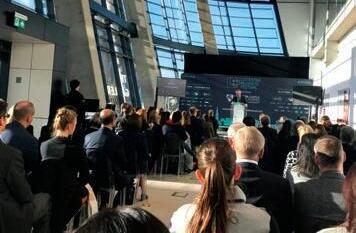
Leicester Business Festival (LBF) celebrates its 10th anniversary this year having attracted 938 events since its first year and the involvement of almost 50,000 people.
The annual two-week B2B festival is respected for its role in promoting business excellence through a line-up of events, speakers, programme launches as well as networking opportunities.
This year the community interest company behind it hopes it will be even bigger, better, and more collaborative than ever. The festival takes place from 4-15 November and the build-up is under way with applications open for event ideas.
An application form for ideas for the B2B events is now live on the festival website.
The line-up is already set to feature wellknown businesses who will open their doors to host topical and insightful events, local students plan to organise a unique event, as well as an interactive moment for businesses to show support to Leicester Hospitals Charity. Keynote speakers will also lead discussions during the opening event.
The festival will culminate in a celebratory event, honouring the standout moments and achievements from the fortnight and the last 10 years.
Richard Osborn, regional director at Excello Law and chair and director of the LBF Community Interest Company (CIC) said: “We invite you to join us on the journey of this milestone festival. You will get to elevate your business, make an impact, and enhance Leicester and Leicestershire's reputation as the premier destination for great business.
"Events can take any shape, from intimate workshops to grand conferences, providing businesses with a unique opportunity to connect with individuals they may not have encountered otherwise. Whether hosted in-house or at external venues, they are an invaluable platform for networking and engagement.
"From Winstanley House to Twycross Zoo, and across Leicester's vibrant city centre, our festivals have showcased an array of venues, demonstrating the diverse opportunities for meaningful interactions and new spaces to collaborate.”
Apply to host an event and subscribe to the official newsletter at www.leicesterbusinessfestival.com. Alternatively contact the festival team at hello@leicesterbusinessfestival.com or call 0116 464 5995 to find out how you can get involved.


The finalists for the 2024 Enterprising Women awards will be revealed on 13 June at an event taking place at Kilworth House Hotel in Leicestershire.
Ten categories will showcase women in the East Midlands who have excelled in business, while a newly introduced award for 2024 will recognise emerging leaders.
The announcement of finalists forms the centrepiece of the Chamber’s Enterprising Women’s annual summer networking event ahead of the award ceremony in September.
The event will be a chance to join co-chairs Jean Mountain and Eileen Perry MBE DL for afternoon tea, networking and a celebration of the success of the region’s businesswomen.
Enterprising Women co-chair Eileen Perry MBE DL said: “The breadth of skill and sheer business brilliance we have amongst East Midlands women is what we shine the light on in these awards and the nail-biting wait each year for the finalists to be revealed and find out who’s gone through is exciting.
“Each year the judging panel are bowled over by the strength of applications and the wide range of categories women can be nominated in, covers all kinds of ways to have positive impact in the business world.
“The moment the envelopes are opened is a thrill as we find out who the 2024 finalists are – and what better place than with an afternoon tea in the sunshine at our Summer Networking Event. This year we’re delighted to have the surroundings of Kilworth House Hotel, a great setting to network with business leaders across the East Midlands.”
To secure a place at the Finalist’s Announcement & Summer Networking Event on 13 June visit is.gd/8mskL5

The 2024 East Midlands People and Skills Summit is set to take place in Nottingham on 12 June.
The annual event – which this year runs from 9am to 1.30pm at Nottingham Trent University –is being organised to help businesses with their staff requirements
Last year’s event attracting circa 200 delegates heard from speakers including former education secretary Baroness Nicky Morgan, who now chairs The Careers and Enterprise Company, a national organisation that helps to bring employers closer together with educators in developing careers education.
‘It’s encouraging to see an increase in the number of economically active people over 16 in the East Midlands’
The Chamber plays a key role in helping firms navigate aspects of employment such as new technology, modern working practices, skills shortages and training and retaining workers.
The People and Skills Summit plays a big part in that work, offering insights to help it determine the practical business support tools it can offer.
It comes as the amount of economically active people – aged 16 and above – in the East Midlands has risen 0.8% over the last year, according to latest figures from the Office for National Statistics.
East Midlands Chamber director of policy and insight Chris Hobson said: “In a difficult employment climate it’s encouraging to see an increase in the number of economically active people over 16 in the East Midlands to 73.4% –this means more people are returning to the workforce, giving businesses that are recruiting a greater pool of candidates.
“Our Quarterly Economic Survey found 48% of respondents in the East Midlands had attempted to recruit in the last three months and 64% of those reported having difficulty in finding staff that suit the role, so the bigger the potential workforce the better.
“However, the data also shows the unemployment rate regionally to be 5.9%, a sign that overall, the labour market locally is cooling. Locally we need to see an increase not just in vacancies but also the number of people with skills that match requirements. This requires Government support for businesses to invest and grow. It also underlines the skill gap that needs to be addressed, which was one of the key asks in the Manifesto for Growth that we recently presented to the government.
“The uncertainty that accompanies an election year has added to the challenges and we really need consistency to build an environment conducive to growth.”
Exhibitor opportunities are still available for this event. The day is open to all businesses and free to attend – book at is.gd/q9VCNm
AI expert Katie King has been announced as the keynote speaker at East Midlands Chamber’s annual dinner for 2024.
A member of the All-Parliamentary Group Taskforce on Artificial Intelligence, CEO of AI in Business and bestselling author, Katie (pictured) will share insight on embracing the potential of AI when she joins the annual event.
The formal gala dinner, taking place on 20 June at Goosedale, Nottingham, is open to business people across the East Midlands and invites reflection on challenges faced over the last year and the opportunity to network.
Chamber head of commercial events and partnerships Trace Voss said: “It’s tremendously

exciting to have Katie King confirmed as our keynote speaker at the biggest and most prestigious event in the Chamber’s calendar.
“I’m sure Katie’s expertise in the field of AI and marketing will spark plenty of lively discussion amongst delegates. Coupled with such a stunning venue and a fantastic three course dinner, the stage is set for what I think will be an inspiring evening. The three counties of the East Midlands come together with a wide range of industries and the discussions over an elegant black tie dinner are a perfect way to network.”
Reservations for the annual dinner can be made at: is.gd/RbOVYO

East Midlands Chamber head of leadership and training programmes Vicki Thompson (pictured), highlights the training support on offer for businesses across the region.
As an employer, show your teams that you value them by encouraging them to develop practical skills and knowledge which they can take straight back into the workplace and use within your business.
The Chamber’s ever-evolving range of training courses cover a wide range of topic areas – this personal development not only allows for your team’s own development, but also gives them the skills needed to progress within their role and support the growth of your company.
Working with a team of quality assured, approved suppliers, the Chamber, alongside our experienced and dedicated trainers, have designed and developed courses that are business centric, ensuring that the development is practical and that the process begun during the sessions can be sustained when they return, to apply them in the business environment.

This level of care and commitment to the learning ensures that your teams will feel valued and supported.
As well as our significant open course programme, which covers topics like leadership, management, personal development, sales, marketing, international, digital, alongside accredited and more formal qualifications, we also offer bespoke/in-house training which will be designed and developed to directly relate to your people’s roles – this will help you engage your staff, ensuring everyone is aligned to your business goals.
If you are looking to grow and develop your company, make sure your teams come on this journey with you.
Working with the Chamber, you will be supported by a team, with a combined experience of over fifty years, we are here to listen, to support and to ensure you achieve the best outcome from your training investment.
Contact the team at business.training@emc-dnl.co.uk or internationaltraining@emc-dnl.co.uk or speak to us directly on 0333 320 0333
PROFESSIONAL COACHING SKILLS
25 May
Nottingham bit.ly/3JkW8pm
FOUNDATION EXCEL
4 June
Chesterfield bit.ly/3UtJqLD
PRESENTATION SKILLS
5 June
Nottingham bit.ly/3JgUbdI
CUSTOMER SERVICE EXCELLENCE
7 June
Nottingham bit.ly/3JkWo7O
ILM LEVEL 5 CERTIFICATE IN LEADERSHIP AND MANAGEMENT
13 June
Nottingham bit.ly/4aWhpS5
PROBLEM SOLVING IN THE WORKPLACE
14 June
Nottingham bit.ly/3VZHlYD
INFLUENCING AND PERSUADING OTHERS
20 June
Nottingham bit.ly/4d0obIa
EFFECTIVE TELEPHONE TECHNIQUES
21 June
Nottingham bit.ly/49FWOk3
EFFECTIVE TEAM LEADER
25 & 26 June
Nottingham bit.ly/3xKSJgV

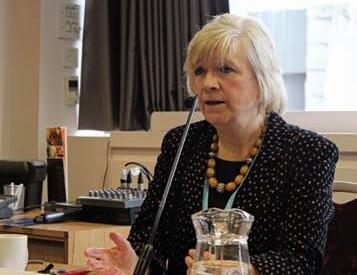
East Midlands Chamber is sponsoring the 2024 Derby Book festival, which this year runs from 30 May-5 June.
The ninth annual festival aims to bring people together through a love of books and inspire a new generation of readers to appreciate the joy that books and reading bring to their lives.
A broad programme of book-related events and activities for all ages and interests will be held in venues across the city.
Each year the organisers seek out an array of acclaimed authors with national and international recognition, as well as an abundance of debut and local authors who are just starting on their publishing journeys.
This year’s line-up includes journalists James O'Brien and Polly Toynbee, The Great British Sewing Bee's Patrick Grant, historians Alison Weir and Dan Cruickshank and authors Francis Spufford and Abigail Dean.
‘The festival celebrates the joy of books and reading for all ages and interests’
The organisers said they aim to provide programmes to inspire, entertain and provoke thought with events from poets, historians, broadcasters and musicians.
The festival will build on the success of previous years, which received local, regional and national media interest and reached around 12,000 school children through its schools’ programmes.
A spokeswoman for the event said: “The festival celebrates the joy of books and reading for all ages and interests, bringing people together in a love of books and inspiring new readers to enjoy what books and reading bring to our lives. Each programme features great writers, poets, historians, illustrators, storytellers and musicians.
“There’s something for everyone with topics including the environment, history, politics and fashion across fiction and non-fiction, plus events celebrating new writers and also some events celebrating what makes Derbyshire so special.
“Derby Book Festival has established itself as the largest literature festival in the East Midlands.
“The festival aims to bring local people together in a love of books and to inspire new readers to appreciate the pleasure and power of reading.”
Derby Book Festival is funded by Arts Council England and the University of Derby with sponsorship from local businesses and individuals.
Tickets are now on sale and for all the details and dates visit: www.derbybookfestival.co.uk


www.emc-dnl.co.uk/sustainability
Innovative and creative businesses are being invited to attend a Go Green business event in June.
The annual event, organised by Harborough District Council, is an opportunity for businesses and organisations to find out about cutting their carbon footprint. It is also a chance for businesses to find out about green grants available to them through the council.
The free event takes place at Foxton Village Hall on 12 June 2024 from 9.30am-2pm.
Cllr Darren Woodiwiss, environmental and climate change cabinet lead, said: “Climate change is a key issue across all sectors in our district and I am pleased we can support local enterprise and organisations in addressing this.
“This event will show businesses the pathway towards reducing their impact on the environment.”
Pre-booking for the event is required, and breakfast, lunch and refreshments will be provided. Book a place at: forms.office.com/e/CBMq3W0HiP
The project has received £5,000 from the UK Government through the UK Shared Prosperity Fund.

A huge solar farm with the potential to power around 13,500 homes has been given the goahead.
Harborough District Council has granted planning for the green energy site at Wistow Lodge Farm, off Fleckney Road, in south Leicestershire. The site will have 103,000 solar panels with the potential to power almost a third of the homes in the district.
The council said the solar farm will have a planned lifespan of around 40 years and a maximum capacity of 49.99 megawatts making a substantial contribution to renewable energy generation levels.
After 40 years, the site will be decommissioned and returned to its agricultural use. Landscape enhancements and ecological mitigation such as hedgerow and tree planting and grassland enhancement will be used on the site to minimise any impact of the development.

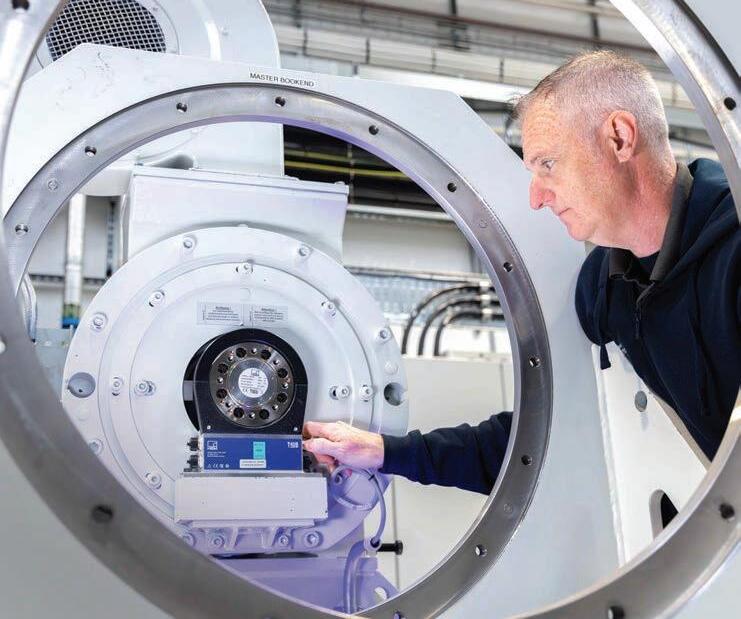

One of the region’s top universities has secured more than £70m to set up world-class, open-access research facilities and programmes to help develop new types of green transport.
The funding for the University of Nottingham stems from a £14m award from the UK Research Partnership Investment Fund (UKRPIF) and will be followed by both public and private sector investment so that the university can build on its existing expertise in electrification, hydrogen fuel and manufacturing.
‘This
is one of the largest funding injections the East Midlands has ever seen’
The facilities will enable scale-up of a number of manufacturing processes being developed in UKRI’s Driving the Electric Revolution Industrialisation Centre (DER-IC).
From March 2025, the university will start working closely with industry partners to demonstrate electrical machines, and it drives manufacturing for a range of propulsion, traction, and generator applications.
The manufacturing facilities will also be available for developers to relocate to in order to help them speed up bringing new technology to market.
The facilities and programmes will also enable testing of electrical machines which operate at very low temperatures and systems fuelled by liquid hydrogen and other green fuels – and help latest research shape new
products that can be used where battery electric power is not viable.
The university’s co-investment partners span a range of industries from areas including aerospace, power generation and marine.
The facilities will be primarily based at the university’s Jubilee Campus and build upon recent investments such as the Power Electronics and Machines Centre (PEMC), which is a zero carbon innovation centre funded by East Midlands Freeport, as well as previous investment.
Chris Gerada, Professor of Electrical Machines and lead for strategic research and innovation initiatives at the university, said: “This is one of the largest funding injections the East Midlands has ever seen, and the opportunities are clear for new research to enable the UK to take an international lead in powering transport.
“Today’s investment accelerates our shared vision to create world-class facilities, build strategic partnerships with industry, stimulate investments in the UK, and drive economic growth.
“We’re grateful to UKRPIF and our industry partners for the trust they have put in us.”
Professor Dame Jessica Corner, executive chair at Research England, said, “I am pleased to be able to award four more universities funding from our flagship UK Research Partnership Investment Fund to create four centres in a diverse range of topics, from net zero aviation to wound research, and disease therapies to future transport.
“I very much look forward to seeing how these new facilities deliver against a variety of diverse challenges over the coming years.”

The University of Nottingham has launched a national inquiry into the transition to net zero.
The university’s Institute for Policy and Engagement has launched a policy commission with former Deputy Leader of the Labour Party and Honorary Professor Lord Watson.
The Commission, chaired by Lord Watson alongside university Professor Lucelia Rodrigues, will call expert witnesses from a range of sectors to discuss who benefits from the transition to net zero, the role communities will play in the transition, and the best way to ensure the move to net zero is achieved.
‘Tackling climate change is an issue that is too important to delay’
The university is said to be among the top five institutions globally for translation of its “zero carbon-oriented research into highimpact commercial solutions” and is often called on by government and industry to help with areas such as electrification for transport, technologies for net zero aviation, developing green fuels, and low energy construction.
HyDEX, which aims to create a new hydrogen industrial economy in the Midlands working with eight universities associated with the Midlands-based Energy Research Accelerator, is also supporting the commission.
The commission intends to make a set of recommendations for policymakers into how to achieve a fair transition to net zero that is inclusive and maximises benefits at all levels.
In November last year, the Intergovernmental Panel on Climate Change (IPCC) warned that “postponing action and taking a slower route to net zero emissions by 2050 will worsen the climate crisis even if the goal is still reached by that date”.
Lord Watson said: “Tackling climate change is an issue that is too important to delay but too far-ranging in its potential impacts to proceed without the need for a just transition at the heart of the decisions made and the policies implemented. Regardless of the outcome of the General Election, this will be an issue for any new administration to wrestle with and one where substantive policy inputs from this Commission will be welcomed by politicians of all colours and policy makers of none.”

Colleagues at an East Midlands housing association helped clean the streets near its tenants’ homes as part of a nationwide litter picking campaign.
Staff from the repairs, ground maintenance and communities teams at Futures Housing Group were joined by charity volunteers, community groups and councillors on five litter picks in March, as part of Keep Britain Tidy’s, Great British Spring Clean.
More than 100 bags of rubbish were collected across Derbyshire and Northamptonshire, filled with crisp packets, cigarettes and cans, plus a toaster and car exhaust pipe.
As well as organising its own litter picks, Futures joined community group Horsley Woodhouse Community Association (HWCA) in
Derbyshire, and Daventry Town Council in Northamptonshire for their own Great British Spring Clean litter picks.
Tania Pells, chairman of HWCA said: “Our members, the local Labour group and colleagues from Futures took to the streets with litter pickers in hand, even enjoying it in the rain. Thank you so much to everyone who gave up their time to support the community of Horsley Woodhouse.”
Janene Haywood, community engagement project delivery officer at Futures, said: “It was lovely to hear such positive comments from people we chatted with across the week, many thanking us for being out on their street. It was a great team effort, both for our colleagues and local organisations, all with the same aim of helping the community.”
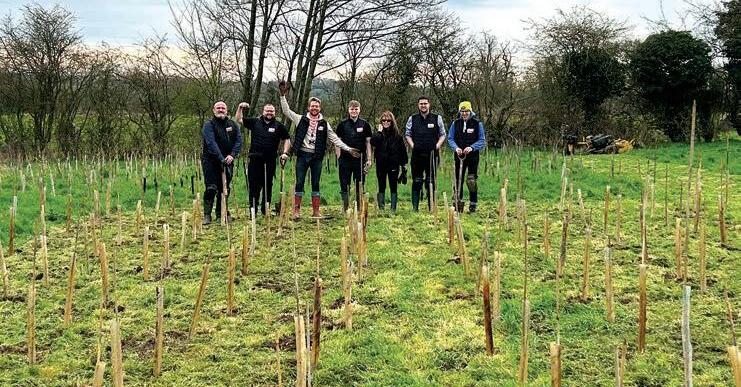

planted hundreds of trees to help offset their carbon footprint.
The workers at DNS in Derby armed themselves with wellies and spades to plant 200 trees in the countryside in two hours.
It comes after the business, which was formed in 1996, committed to become carbon neutral in 2022 with the help of Co-Treetment, an environmental charity that specialises in creating woodland areas in the East Midlands.
The projects serve a number of purposes – helping mitigate carbon emissions by absorbing CO2 from the atmosphere, helping manage water levels in flood plains, and creating new habitats for local wildlife.
The trees selected for planting are native to the UK, ensuring their suitability for the local environment and providing a welcoming environment for all future inhabitants.

A new funding stream is available which the Chamber could be able to use to help businesses with upskilling colleagues in international trade.
The Chamber has a comprehensive range of courses which focus on the compliance side of trading internationally – for example Incoterms® 2020, Customs Procedures and Documentation, Understanding Commodity Coding and IP/OPRInward/Outward Processing Relief.
A spokeswoman for the Chamber said: “Our most popular course is Export Documentation which covers what documents are required and how to complete them correctly.
“We also run our flagship qualification – ITOPS – International Trade Operations and Procedures.
“This is one of the most practical and relevant international qualifications designed to prove that candidates have the necessary skills to accurately operate the administration procedures in an international trade administration environment.
“Successful candidates also achieve the BCC Foundation Award in International Trade.”
The Chamber will be able to advise businesses on the best support they can get and any funding that could help cover the cost.
Contact Julie Whiting or Theresa Hewitt on internationaltraining@emc-dnl.co.uk for an eligibility check.

Get prepared for a customs audit with East Midlands Chamber’s free Audit Healthcheck.
HMRC is increasing its activity around customs audits for businesses and could be visiting businesses in the region to carry out checks to ensure that they are complying with customs regulations.
HMRC is putting full responsibility on businesses that import and/or export and expects full awareness and compliance with their responsibilities
The Chamber expert consultants can guide you through a personalised one-on-one session to ensure your documentation is verified and compliant with an HMRC audit.
This free service is ideal for early-stage exporters and businesses in international trade
For more details or to book a free audit healthcheck, visit: www.d2n2growthhub.co.uk/ grow/international-trade-help/customs-audithealthcheck/
This service is funded by the Accelerator project, which is funded by the UK Government through the UK Shared Prosperity Fund (UKSPF) and is delivered by East Midlands Chamber.



The British Chambers of Commerce has launched a Global Britain Challenge report to boost exports and channel overseas investment into the UK.
Among the 28 recommendations are:
• The creation of a ‘Team UK’ to champion an updated ‘Brand Britain’ and show the world the best of what we can offer.
• A change in mindset, so the UK takes a more vigorous approach to fighting for its future success.
• Finally stepping out of Brexit’s long shadow, so politicians take bold decisions to make it work better and grab the opportunities it offers.
• An injection of more investment into the UK by targeting the big, and growing economies, with the money and understanding to make the most of what we can do.
• A greater emphasis on services exports in the UK’s trade deals.
The ‘Global Britain’ report, launched at an event hosted by Heathrow Airport, is the fourth of five policy documents from the BCC’s new business council, as part of the ‘Future of Economy’ project.
It draws on expertise from businesses of all sizes, academia, Chambers and think-tanks and
‘Trade and inward investment are two vital pillars that hold up the UK economy’
its proposals have two aims; to raise the flow of foreign direct investment (FDI) into the United Kingdom and to increase the amount of goods and services we export.
The country has an embarrassment of riches – its universities, legal system, culture, creativity and can-do spirit are the envy of the world.
But none of this can be taken for granted. The UK is the only G7 country yet to regain its pre-pandemic level of trade intensity.
To keep its seat at the top table Government, business, higher education, and cultural and societal institutions must work together. Only then can Britain’s place in the world, and the world’s place in Britain be guaranteed.
Martha Lane Fox, president of the British Chambers of Commerce and chair of the Business Council, said: “Trade and inward investment are two vital pillars that hold up the UK economy. But despite new free trade agreements and a raft of other deals, the intensity of our exports and imports is lagging behind our main rivals.
“This is about much more than Brexit, it’s
The removal of an EU paperwork requirement for companies exporting iron or steel to the continent has been welcomed by East Midlands Chamber.
The change is the result of talks between the British Chambers of Commerce, UK and EU officials and means companies will no longer have to produce “mill certificates” to prove the country of origin was not Russia which can be a costly, time-consuming process.
Chamber international trade manager Lucy Granger said: “The paperwork needed for exporting goods to the EU and the expense of putting all that together is a frustrating burden to businesses in the East Midlands.
“For any part of the export process to be
alleviated is something I welcome and it’s great that the Chamber network’s talks were able to achieve the removal of the mill certificate requirement.
“International trade is far more complex than it needs to be and while reduction of paperwork for iron and steel helps, there are obstacles in so many elements of international trade to the EU and other parts of the world. That’s why
International Trade is one of the four I’s in East Midlands Chamber’s Manifesto for Growth 2024 that we took to Westminster in March.
“The manifesto highlights the areas that need government attention to get the uninhibited growth the East Midlands needs: Infrastructure, International Trade, Innovation and Investment.”

Asurvey by Chamber member PAB Group across South Yorkshire, Lincolnshire and the East Midlands has unveiled critical insights into how businesses are navigating the challenges posed by language and cultural barriers.

about the UK’s attractiveness as an investment location and our reputation as a trading nation in the world.
“But Brexit casts a long shadow. There is sometimes a reluctance among politicians to either recognise problems or suggest solutions, because of how they may be viewed either side of the Brexit divide.
“This must stop. Our politicians must be bolder in their decision making. They must set out a strategy on how we mange EU regulation and, where it makes sense, to diverge so that British business can benefit.
“The UK has so much going for it, and we need to make the most of the huge opportunities that presents. Rather than deciding strategy based on parochial political concerns, let’s decide on what’s best for the long-term future of the UK.
“That means taking stronger positions and negotiating better deals with the EU and the rest of the world, to champion our world leading services sector. We must also do more to improve the flows of investment into the UK, by going after the big fish – the nations with the biggest and deepest pockets.
“And it is crucial that we sell the UK’s unique offering and its many advantages to the world as loudly as we can.”
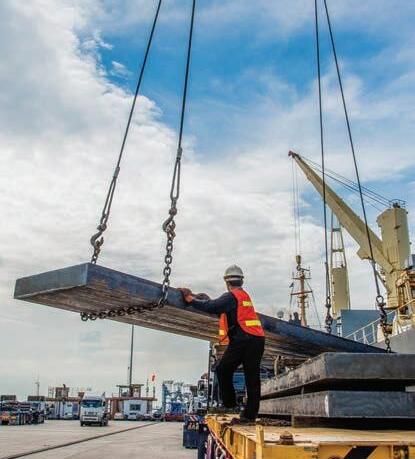
The findings reveal that a significant majority of businesses have encountered language barriers that adversely affected their operations and led to missed opportunities. Despite these challenges, businesses are actively seeking and utilising professional translation services and are unanimous in their recognition of the importance of language and cultural competencies.
The survey was undertaken by PAB SEMA4 – a dedicated division of the PAB Group, specialising in supporting international trade through targeted services and expertise.
A notable insight from the survey was the proactive approach businesses are taking towards multilingual communications and marketing materials, with many leveraging professional translation services and in-house resources.
The desire for comprehensive services, including intercultural communication training and language skill development workshops, highlights the broader recognition of the need to effectively navigate cultural complexities.
Iwona Lebiedowicz, founder of PAB Languages Centre, said: “We are committed to addressing these needs by offering a suite of services designed to empower businesses to overcome these barriers and succeed in the global market.”
The survey across diverse business sectors revealed consistent concerns and insights regarding language and cultural barriers in business operations. It showed:
• A significant majority of respondents have encountered language barriers in their business operations. 100% of participants from South Yorkshire and Lincolnshire, and 80% in the East Midlands survey indicated facing such barriers.
• There's a notable impact on business opportunities due to language barriers, with 100% in Doncaster, 67% in Lincolnshire, and 50% in the East Midlands survey reporting lost opportunities.

• Over 60% of respondents are actively exploring new tools and AI technology to overcome these barriers, with 100% expressing concerns regarding privacy, copyrights, accuracy, and the risk to reputation from translation discrepancies.
• All respondents engage in international trade, underscoring the importance of addressing language barriers for business growth and expansion.
• The majority of businesses have used professional translation services, indicating a proactive approach to overcoming language barriers.
The survey highlighted several aspects of cultural differences impacting business, including communication style, marketing strategies, and customer interactions, pointing to the complex nature of navigating global business environments.
More than 100 businesses responded to the survey, which was carried out between 20 January and 20 March 2024.
Iwona said: “This survey highlights the importance of how companies can miss out on business opportunities if they don’t address potential language and cultural barriers.
“Whether you're taking initial steps towards international expansion or looking to strengthen your presence in existing markets, PAB SEMA4 is your partner in achieving seamless and successful global engagement.”


The closure of Nottingham’s Ted Baker store in Bridlesmith Gate has reinforced the challenges faced by city centre retail and a need for investment.
The store is one of 11 across the country forced to close after the brand entered administration.
Shops in Birmingham, Bristol, Bromley, Cambridge, Exeter, Leeds, Liverpool, London Bridge, Milton Keynes and Oxford were also affected and around 250 jobs lost.
The company’s European retail and online arm brought in administrators in March after the retailer, which has 46 stores in the UK and Europe, was hit by tough trading conditions and the fallout from the 2019 ousting of founder Ray Kelvin.
It was later hit by news of an accounting error and profit warnings.
‘The announcement is a reminder of the challenges faced by the retail sector’
East Midlands Chamber director of policy and insight Chris Hobson said the Ted Baker store had been a familiar part of Bridlesmith Gate for years, so it was sad to hear about its closure – especially in a city centre with so much growth potential.
He said: “The announcement is a reminder of the challenges faced by the retail sector.
“However, new and fledgling businesses with their sights on a traditional high street presence shouldn’t be discouraged – where possible businesses should wholeheartedly embrace digital technology and the wide customer base it provides, so that huge online market can be complementary to their bricks and mortar offering.
“It’s also a timely reminder that the public and private sector must work together to support the development and modernisation needed to pull people into the city centre to work, study and live.
“Getting the city centre where it needs to be so that people enjoy leisure time alongside their work life is within reach, but continued investment and following through on plans is critical.”



The Secretary of State for Transport has thrown a lifeline to the threatened Alstom factory in Derby after saying the Government would like to fund enough new trains to secure its future.
Production at the Litchurch Lane train factory in Derby recently halted following a drop in orders, putting around 1,300 jobs in jeopardy. A further 15,000 jobs in supply chains across the country are also said to be in danger.
The factory is the country's biggest train manufacturing site and the only UK site where trains are designed, developed, built and tested. It has a history going back 185 years.
However, a gap in orders meant its French owners said they were planning to close it down –despite the UK Government confirming a future need for more rolling stock, including new Aventra trains which could be built in Derby.
If Litchurch Lane were to close it would be a significant loss for the region and put the country at risk of losing hard-earned rail manufacturing expertise.
The Chamber has supported a Marketing Derby campaign calling on Government to commit to the production of 10 Aventra trains at the site.
Now Transport Secretary Mark Harper has written to the leader of Derby City Council saying he has secured approval to go ahead with the fresh train deal which should keep the site operating.
He said: “I am pleased to say that my department has now secured approval in principle to support funding for five further Elizabeth Line trains, in addition to the five trains confirmed in March, making a total of 10 trains.
“This has been made possible by strong performance and high levels of demand on the Elizabeth Line since its opening in May 2022.
“Subject to securing the necessary commercial agreements between TfL [Transport for London] and Alstom and confirming a business case for the additional trains that represents value for money for the taxpayer, this would enable Alstom to maintain sufficient capacity at
‘The onus is now on Alstom to provide competitive pricing for the work and full transparency on its costings’
Litchurch Lane until the confirmed new HS2 work comes onstream and until it is able to compete for new orders in the market.”
Mr Harper has met Alstom chairman and chief executive Henri Poupart-Lafarge and its UK & Ireland director Nick Crossfield to discuss the plans. He said: “I made clear to them that the onus is now on Alstom to provide competitive pricing for the work and full transparency on its costings to enable this to progress to satisfactory and swift closure.
“I also asked them to confirm in writing their long-term commitment to invest in Derby, including confirmation that Alstom will host the design, development and manufacture of its Adessia platform at Litchurch Lane, as they had previously offered to do.
“While a considerable amount of work remains to conclude the negotiations and confirm the business case, I am confident that Alstom understands what now needs to be done and that a solution is now in sight.”
Chamber chief Executive Scott Knowles said: “We know that as a country we have new rolling stock needs that can be met by the highly skilled workforce we have in Derby and its wider regional supply chain – any inability to iron out the gaps in orders would represent a significant failure of national planning and have detrimental knock-on effects in Derby, Derbyshire and across the country.”
John Forkin, managing director of inward investment agency Marketing Derby, has written to its bondholders outlining the imminent threat posed to the future of train-making in the city. Hundreds of businesses have backed his campaign.
Mr Forkin said: “The closure of Litchurch Lane would be terrible news for our city – most especially for those who work at the site and

A new, post-Brexit charge on food imports could be a huge blow to SME importers and a big concern for retailers, cafés and restaurants, according to the regional and national chambers of commerce.
The Government’s “Common User Charge” on food imports adds a new cost burden to a sector already dealing with the long-term effects of inflation and energy price rises as well as the impact of the UK leaving the Common Market.
The fee, capped at £145 for a mixed consignment, applies to some animal and plant products arriving from the EU via Dover or Folkestone.

their families – as well as those who work for suppliers across the UK. It is not too late. A viable option for 10 new Aventra trains (as used on the Elizabeth Line) which Alstom and its supply chain can deliver immediately is available.”
Councillor Baggy Shanker, leader of Derby City Council said: “We are doing everything we can to save these jobs and the future of train manufacturing in Derby.”
Alstom needs to find work that can sustain the factory for the next 18 months to two years. An Alstom statement said: “We are now in a period of intense discussions with the Government and Transport for London about a potential train order for the Elizabeth line given the levels of passenger demand. This could help secure the future of the Litchurch Lane site.
“The parties have agreed to conclude discussions as soon as possible and no later than the end of May. We will be making no further comment at this time.”
East Midlands Chamber international trade manager Lucy Granger said: “Buying in a few yoghurts or sausages for a shop shelf or to serve in a café shouldn’t be an expensive procedure and when small quantities are involved that’s a kick no one needs.
“For small and medium importers this cost will have to be funded somehow, whether by the importer, retailer or ultimately the consumer.“
William Bain, head of trade policy at the British Chambers of Commerce said it was
“extremely disappointing” that Defra was implementing the charge.
He said: “The level of import charges shows scant regard to the interests of both businesses and consumers.
“A flat rate fee for bringing most animal and plant products into the UK is a hammer blow for small and medium sized importers. It’s also deeply concerning for retailers, cafes and restaurants.
“Importing a small consignment of goods with only five different meat, poultry, egg, milk or some fish products in the medium risk category will now face a bill of £145 per package under these proposals”



Work is under way to improve Fox Street and Portland Square, in Sutton in Ashfield town centre.
Ashfield District Council is creating a new outdoor space that will link the ASDA store with the town centre, and which will be able to accommodate markets and events.
Disused land behind Lloyds bank will be turned into a 41-space car park with new lighting, CCTV and native trees and hedging planted to enhance biodiversity.
The river Idle, which runs through the back of the site, will be cleaned, and restored as part of the work being funded by Ashfield District Council's £6.27m Future High Streets Fund.
Council leader Councillor Jason Zadrozny said: “The Fox Street site has been an eyesore for a long time and our renovation works will breathe life into it, creating a space that can be used for
events and markets – capitalising on the natural footfall in this part of Sutton.
“Ashfield District Council's plans for the entire district are revolutionary and will create a lasting impact on Ashfield – a great place to live, visit, work, and play.”
The next stage of the regeneration of Sutton town centre will start shortly after Fox Street, with ground being broken on Portland Square this month.
The new-look Portland Square will feature two raised lawns with inbuilt seating, ambient lighting, planting and semi-mature trees to bring greenery back into the urban setting. Alongside the planters will be CCTV cameras, streetlighting, a new level flooring and more room outside businesses for outdoor seating.
Both sites are expected to be completed by the end of the year.


Corporate hospitality is seen by many businesses as a vital way to gain and retain customers and improve their brand recognition. However, it’s becoming increasingly important for businesses to also demonstrate a commitment to sustainability – but how can you deliver an event that has an enormous impact on your audience but not on the environment?






There are always a number of factors to consider when planning a corporate event, and even more if you want to demonstrate your commitment to sustainability. Here are our tips to get you started.
When planning an eco-friendly event, your first action should be to consider past events and measure their environmental impact. This will give you a great starting point to work from and show you the exact areas that need improvement.
For your event to be as sustainable as possible, it’s imperative that you work with a venue that shares your eco-friendly values. Some venues, such as hotels, will be able to offer a Green Tourism certification, but you can also check their policies on recycling and energy use, too. Consider the fact that a larger event space will require more energy to light and heat, so make sure you choose a space that is appropriately sized for your guest list.
With the advance of digital technology, do you really need to clog printers with invitations, flyers, posters, welcome packs and brochures? Send out e-vites instead of printed invitations, and consider developing a website – or even an app – where your guests can find all of the information they need during the run-up to the big day. This will eliminate the need to print out hundreds or thousands of programmes and will also help your guests stay on top of any last-minute changes or additions to the day.
Other ways to reduce paper consumption include only promoting your event on social media and presenting information digitally on the day, by utilising interactive screens. Where you must use paper, opt for recycled products.
‘Make sure you choose a space that is appropriately sized for your guest list’
Plastic cutlery; delegate badges; drinks bottles; straws; goody bags; decorations – how many single-use plastics are usually used and discarded at your corporate events?
A simple way to make your event more eco-friendly is to see where you can minimise or ditch entirely the use of plastic. If your budget allows it, consider giving out reusable drinks bottles as a gift, and encourage your guests to practice being more sustainable once the event is over.
If you are planning on catering your event, there are a few steps you can take to provide sustainable refreshments. Where possible, choose organic, locallyproduced food and drink to cut emissions and to support local manufacturers. Avoid over-catering, to save both money and to reduce food waste – but if you do have any leftovers, consider donating them to a local homeless shelter or soup kitchen.
If you have large guest list, consider how they will travel to your event – and what you can do to make their journey a little more eco-friendly. Can you pick a venue that is close to a train, bus or coach station, allowing your guests to travel via public transport? Can you arrange coach travel (or even a car share system) for delegates to travel together and share their emissions?





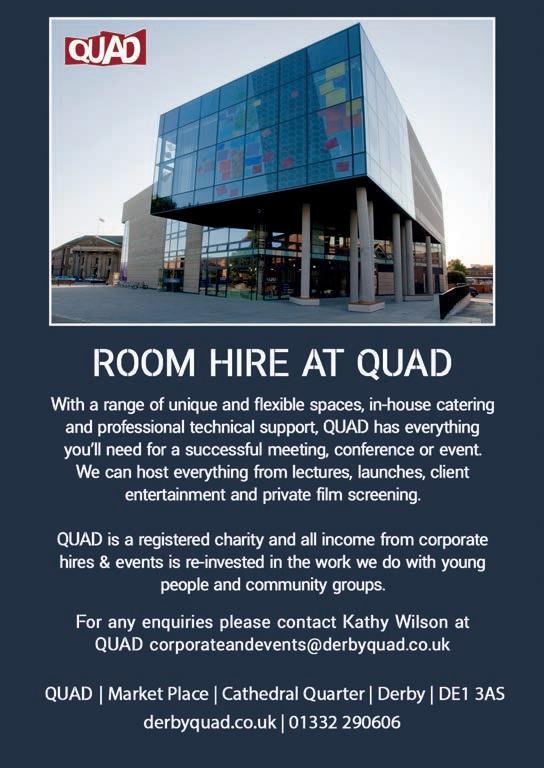
















Hotels and conference centres both offer dedicated venues for meetings and conferences, but they have distinct advantages and disadvantages. So which one is right for your next event? Business Network is here to help you decide.






THE CASE FOR HOTELS
Convenience: Firstly, a hotel is usually the most convenient choice. Larger hotels will have meeting rooms and event spaces just a few floors away from guest accommodations, meaning delegates can stay at the same location. This is especially beneficial if you’re hosting a multi-day conference or expecting out-of-town participants.
Amenities: Restaurant, spa, gym, bar – hotels typically offer a range of amenities that will enhance the overall experience for your guests. Delegates will appreciate being able to relax and unwind in between events, and catering services will mean they’re well fed, too.
Technology: Hotel event spaces are equipped with all of the audio-visual and presentation equipment you will need. They will typically also offer the services of an events team who will be on hand every step of the way to make sure you don’t run into any technical difficulties.
Networking spaces: Hotels offer many communal spaces, such as bars and comfortable lobby areas, which provide the perfect setting for informal networking.
THE CASE FOR CONFERENCE CENTRES
Specialisation: Conference centres are purpose-built for meetings and events, offering more customisable meeting spaces. The technology available will be top-notch, including enhanced audio-visual systems, high-speed internet and specialised support teams.
Flexibility and choice: Conference centres offer a higher degree of flexibility. You will have a choice of rooms, depending on your budget and needs, and be able to configure the room layout to meet your exact specificati on.

Exclusivity and privacy: A conference centre offers more privacy than the hotel. For one, you won’t have to share communal spaces, and your dedicated events spaces will only be able to be used by your delegates. This can create a more focused environment with fewer distractions.
Accessibility and parking: Conference centres are usually located near major transport hubs, such as railway stations and airports, to provide easy accessibility for those travelling by public transports. They also offer ample parking.
Event size and purpose: Consider the size and nature of your event. Hotels are suitable for smaller to medium sized events, while conference centres are better suited to accommodate larger guest lists. You don’t want to cram too many people into one room – but at the same time, you don’t want to hire a lavish banquet hall for just a handful of guests.
Budget: While conference centres usually cost more to rent than hotel meeting spaces, they do offer more value in terms of specialised services and equipment.
The needs of your guests: Consider the experience you wish to offer to your guests. Is overall comfort more important than accessibility, for example? Look to past events to guide the kind of experience you wish to build –do they enjoy having extra amenities on site or do they prefer the convenience a conference centre offers?
Atmosphere: Consider the atmosphere you want to create. Is your event going to be more informal and relaxed, or more professional and focused? A hotel will offer a more comfortable atmosphere, while a conference centre will look and feel more impressive and professional.
‘Consider the atmosphere you want to create. Is your event going to be more informal and relaxed, or more professional and focused?’






space industry. The region has dozens of companies involved in everything from making polishing machines for space telescopes, to designing systems that could help prevent damage caused by space debris. In Derby, Rolls-Royce is working on reactors that could one day power a human mission to Mars.
Central to much of it is the University of Leicester, which for 60 years has helped design and build components for satellites which orbit our world.
The university’s space research group, now the biggest in Europe, has been involved in more than 90 space missions and had at least one instrument operating in space in each year since 1967.
Meanwhile, the National Space Centre – the UK’s biggest attraction dedicated to space exploration and space science – has attracted tens of millions of visitors since opening its doors in 2001. The facilities there, and the academic heritage of the university, played a part in

Park Leicester – a new business complex opened by British astronaut Tim Peake two years ago.
In its first year it helped create 125 new jobs and the 20-plus companies with operations there now include Rolls Royce, Airbus, Northrop Grumman, Satellite Applications Catapult, CGI, EarthSense and Maxar. The National Centre for Earth Observation – monitoring the health of our planet through satellite instruments – also has its headquarters there.
The space park has become a cornerstone of Leicester’s Space City cluster – dedicated to space research, production, manufacture and development, and is helping make Leicester a key part of the UK’s “Space Spine”.
Further north, meanwhile, the University of Nottingham has a broad range of R&D incorporating space, with strengths in global navigation satellite systems, earth observation for human rights and space biology.
Over the coming pages Tom Pegden looks at the region’s role in the UK space sector.
This spring the UK Space Agency announced a new regional office in the East Midlands, in a move which it hopes will nurture even more collaboration with the thriving space sector here.
The agency – part of the Department for Science, Innovation and Technology – has a mission to support the national space strategy and includes scientists, engineers, commercial experts, project managers and policy officials.
It has chosen to have a base at Space Park Leicester, the University of Leicester’s £100m science and innovation park, which opened two years ago next to the National Space Centre.
It comes as the agency announces a new headquarters in Harwell, Oxfordshire, along with new offices in Cardiff and Edinburgh.
The UK Space Agency (UKSA) says the space sector is growing faster than the rest of the UK economy, valuing it at more than £17.5bn a year, and employing around 49,000 people.
Meanwhile, Space Park Leicester has established itself as the second largest campusbased cluster with a dedicated space focus in the UK, generating an estimated £89 million for the economy in its first year alone. Recent projects to get UKSA support in Leicester include work on carbon mapping sensors for monitoring greenhouse gas emissions in Bahrain.
At the start of the year, University of Leicester scientists received funding from UKSA’s Space Science and Exploration Bilateral Programme to deliver (with UK and Spanish collaborators) a scientific instrument for commercial lunar rover

and lander missions to investigate minerals on the moon. It could help determine what natural resources are available for longer term lunar exploration.
Professor Sarah Davies, pro vice-chancellor and head of the College of Science and Engineering at the University of Leicester, said she was delighted that the UK Space Agency was joining the “dynamic and collaborative” community in Leicester.
She said: “Space Park draws together colleagues from industry and academia who are working in space and the space-enabled sectors and whose activities and objectives are consistent with those outlined in the recentlypublished Space Industrial Plan.
“Given the value of the UK space sector to our economy, locating UKSA offices in places such as Space City Leicester will be crucial to realising the UK’s ambitions in space and the University of Leicester is committed to supporting that endeavour.”
Representing up to £233 million of investment, the Space City partnership includes Space Park Leicester, the University of Leicester, the National Space Centre and Leicester City Council and its DOCK workspaces.
Space City is also part of the Loughborough and Leicester Science and Innovation Enterprise Zone.
Space Park Leicester executive director Professor Richard Ambrosi said scientists at the




University of Leicester had a good working relationship with UKSA.
He said: “University of Leicester expertise has supported missions with UK Space Agency involvement such as the European Space Agency’s Bepi Colombo mission to Mercury, the Rosalind Franklin Mission to Mars, the Solar wind Magnetosphere Ionosphere Link Explorer mission to launch in 2025 and carbon monitoring mission MicroCarb just to name a few.”
The plan is for the four new UK Space Agency offices to create opportunities to build on highgrowth areas such as earth observation and satellite broadband.
They could also help the UK establish an early lead in new markets such as in orbit spacecraft servicing, active space debris removal, and the new “lunar economy”.
In the two years since it opened, Space Park Leicester has established itself as the home of UK space and earth observation. Here we look at two of them.


Meridian Space Command is a support organisation set up to help businesses in the space sector secure funding to demonstrate their technology and expand into commercial markets.
It also supports the space industry with mission management, operations, software, audits and education.
The business only recently moved into Space Park Leicester in order to collaborate with the University of Leicester and showcase its offering to businesses.
Potential clients range from industry giants to innovative start-ups based in and around the Space City Leicester cluster.
Launching the new office, director Dr Sam Richards said: “I am extremely proud to establish Meridian’s headquarters at Space Park Leicester, and look forward to cultivating our partnerships and expanding our capacity to offer collaborative opportunities for UK technologies.
‘We see Space Park Leicester as a key partner in Meridian’s vision to accelerate the global offerings of UK’s space tech’
“Space Park Leicester is a hub of expertise, innovation, education and partnerships and we’re excited to participate in all these things and to contribute to them.
“We see Space Park Leicester as a key partner in Meridian’s vision to accelerate the global offerings of UK’s space tech.
“It also means a great deal to be part of the Space City Leicester community. It’s rare to find somewhere with commercial enterprises located alongside space companies.
“This unique environment will help us to develop partnerships with services that could otherwise be overlooked.
“Space City is a bold development and its continual expansion provides great opportunities for collaboration.”
Vinay Patel, head of commercial and innovation at Space Park Leicester, described Meridian as a “fantastic organisation”. He said: “With their educational offering it also makes perfect sense for them to be here as they can benefit from fantastic links with the University of Leicester.”
ODIN Space is developing a way of mapping the tiny bits of debris whizzing around the earth’s orbit – so-called ‘space bullets’ which have the potential to cost the space industry billions each year by tearing satellites apart.
The business has developed a way to map space debris smaller than a centimetre in length, down to the size of a grain of sand. Despite their tiny size they have the energy of a bullet and could destroy a satellite instantly.
Until now no technology has been able to mitigate the threat from fragments of metal caused by satellite disintegration or collision.
ODIN’s network of sensors can be hosted on third-party satellites, constantly sampling space junk – counting how much debris is in orbit, and its size, speed and trajectory and ultimately enabling the bits to be dodged.
Debris collisions are forecast to cost the industry $2 billion annually by 2030. Pieces bigger than 10cm can already be tracked and can be avoided, and there are plans to track debris as small as 1cm.
But some 99 per cent of debris is so small that it is invisible to existing tracking technology, making sub-centimetre debris the single greatest threat to satellites.
ODIN Space – it stands for Orbital Debris Impact Network – was founded to fill that critical gap in the space debris ecosystem and last year became the latest organisation to join a programme run by the European Space Agency’s Business Incubation Centre for the United Kingdon (ESA BIC UK) at Space Park Leicester.
Space Park Leicester commercial manager Vinay Patel said: “With as many as 100,000 satellites and hundreds of billions of dollars’ worth of space-based infrastructure expected to be in orbit by 2030, understanding how debris is behaving is crucial for satellite operators, orbital service providers and insurance companies.”
Latest research suggests that the UK is the most attractive destination for private investment in space after the US, with a growing number of big UK venture capital firms investing in the area.
Some of the key areas of investment in the UK include earth observation, manufacturing and satellite connectivity, with growth of up to 11% forecast per year to 2030 across the global space ecosystem.
Analysis produced by PwC in association with the UK Space Agency, suggests space is already worth an estimated £17.5bn to the UK economy. Globally, the space sector is predicted to exceed $1 trillion by 2030 – which would be 186% up on where it was in 2020.
PwC’s ‘Expanding frontiers – The down to earth guide to investing in space’ report suggests the sector has potential to play a part in everything from tackling global climate change challenges to monitoring flood waters, decarbonising economies and increasing food security.
The government says UK space organisations have received investments from at least seven of the most active global investors, and nine of the biggest UK-based venture capital firms.
‘Space has taken on an increased significance as a deeply embedded part of the global economy’
Taking into account government, universities, research institutes and commercial organisations, it describes the UK space sector as a “hidden utility” that underpins our daily lives and supports an estimated £370 billion of the country’s economy, mostly through satellite-based services.
The data follows figures in the recent Size and Health of the UK Space Sector Report showing that £635 million was invested in UK-headquartered space companies through 34 identified deals in 2022, with acquisitions accounting for three-quarters of the total investment value.
Craig Brown, director of investment at the UK Space Agency, said: “This report shines a light on the breadth and depth of space investment opportunities. From today’s satellite communications to the future of orbital assembly, space has taken on an increased significance as a deeply embedded part of the global economy that is poised to grow at up to 11% per annum to 2030.
“As the number of satellites above us increases dramatically, there are even greater opportunities to capitalise on the wealth of data they collect and on the international efforts spearheaded by the UK to keep the space environment safe and sustainable for generations to come.”
Matt Alabaster, partner at PwC’s global consulting team Strategy&, said the space industry had the potential to make a “substantial contribution” to solving some of our biggest global challenges – from decarbonising economies to helping developing countries produce food and improving access to healthcare.

Engineers from the East Midlands are involved in a new project to develop systems that could power unmanned lunar rovers working at the southernmost point on the moon.
Experts from the University of Leicester and the £100m Space Park Leicester science and innovation facility have joined a consortium developing power systems for lunar rovers that combines solar panels, batteries and radioisotope thermoelectric generators – a type of lightweight nuclear battery.
‘Future missions will need an intelligent power management system capable of handling a hybrid ecosystem with multiple energy sources’
The tech is being designed to ensure that rovers can operate in the challenging conditions experienced at the Lunar South Pole – from subzero temperatures to extreme heat.
The Leicester experts are working with colleagues in Spain from the University of Oviedo and the Aerospace Technology Research Group, which is part of the University of Vigo.
A combination of the three energy sources is being used because each has its own advantages and disadvantages.
Radioisotope thermoelectric generators, for example, provide a source of constant but relatively low electrical power.
Batteries provide a fast energy supply but must be recharged periodically and while solar panels are the fastest energy sources, they need sunlight to operate.
A solution that only used radioisotope thermoelectric generators would be relatively heavy, while one that only used solar panels would be unviable.
The consortium's task is to find as small and light and efficient a solution as possible.
The Leicester team is the main developer of radioisotope thermoelectric generators in Europe.
The €340,000 project, called power management conditioning for hybrid radioisotope solar power systems, has been funded by the European Space Agency and will last until September 2025.
Space Park Leicester academic Dr Ramy Mesalam said: “The consortium is addressing some of the most challenging space power system requirements for exploring our Solar System.
“Future missions will need an intelligent power management system capable of handling a hybrid ecosystem with multiple energy sources from solar, chemical, and nuclear technologies.
“Enabled by radioisotope power technologies, the UK and Europe is transforming power systems for space exploration.”
The benefits of diversifying into high-value sectors such as space, defence and nuclear were among the topics explored at the recent 2024 Midlands Aerospace Alliance (MAA) Conference in Derby.
More than 220 professionals from 130 organisations came together to hear about the latest developments from aerospace industry experts and discuss the significance for companies across the supply chain.
The conference was held at the Rolls-Royce Learning and Development Centre, with delegates welcomed by Rolls-Royce strategy executive and MAA director Tony Allen.
The agenda included presentations from experts from leading organisations across three sessions covering topics that are critical to aerospace businesses right now.
‘TheMAAboardusedthis year's conference to create more opportunities to inspire young people in aerospace and aviation’
A space, nuclear and defence session considered the opportunities being created in those areas, with discussions around what the growth of the sectors mean for skills and the impact of companies working together.
Speakers included Matt Eagle, senior supply chain manager (fixed wing aircraft) Boeing Defence UK, Mark Dumville, chief executive of GMV – which is involved in areas such as earth observation, space debris tracking, mission planning, flight dynamics and navigation – Liz Griffiths, technology manager at the MAA, Robert Wilson, head of market development at defence and space manufacturer AWE, and
Professor Angela Dean, head of apprenticeships and quality at the College of Engineering and Technology, University of Derby.
Mark Dumville highlighted the opportunities for aerospace suppliers to transfer their expertise and capabilities to meet the space growth requirements.
He also addressed the issues of space sustainability, safety and security which need to be overcome, the increasingly commercial lunar economy and the power that is being unlocked through satellites to observe and better understand our planet.
Liz Griffiths presented information about the Pivot into Space programme, funded by the UK Space Agency, which is designed to support companies in the region to apply their technologies and capabilities into the UK's growing space markets.
The MAA board used this year's conference to create more opportunities to inspire young people in aerospace and aviation, and invited 10 guests in their early careers and interested in building their futures in related industries.
One was Bertie Bertolaso, who volunteers as the industry lead for the RAF Air Cadets National Air & Space Camp, and recently completed a degree apprenticeship.
An MAA spokesman said the conference was full of “stimulating presentations packed with insights and ideas to guide business strategies”.
He said: “We were also pleased to share details about how companies could get more involved and access support.
“We talked about up-and-coming MAA
activities like Farnborough
in July and the expert support available from the MAA’s technology managers to support companies to achieve their sustainability, productivity and space industry objectives.”



Computer scientists have shared their vision for the future of artificial intelligence – and said it will be a bit like Star Trek character ‘The Borg’.
Experts from institutions such as Loughborough University, MIT, and Yale said we are set to see the emergence of a ‘Collective AI’, where different AI – each acquiring new knowledge and skills – form a network to share information.
The researchers – who unveiled their vision in a paper in Nature Machine Intelligence – said there were striking similarities between Collective AI and some science fiction concepts.
One example they cited was The Borg, cybernetic organisms featured in the Star Trek universe, which operate and share knowledge through a linked “hive-mind”.
Unlike The Borg, the computer scientists hope Collective AI will lead to major positive breakthroughs.
Loughborough University’s research lead Dr Andrea Soltoggio said: “Instant knowledge sharing across a collective network of AI units capable of continuously learning and adapting to
new data will enable rapid responses to novel situations, challenges, or threats.
“For example, in a cybersecurity setting if one AI unit identifies a threat, it can quickly share knowledge and prompt a collective response –much like how the human immune system protects the body from outside invaders.
“It could also lead to the development of disaster response robots that can quickly adapt to the conditions they are dispatched in, or personalised medical agents that improve health outcomes by merging cutting-edge medical knowledge with patient-specific information. The potential applications are vast and exciting.”
The researchers acknowledge there are risks associated with Collective AI – such as the swift spread of potentially unethical or fake information – but highlight a crucial safety aspect of their vision, saying individual AI units maintain their own objectives and independence from the collective.
Dr Soltoggio said that would “result in a democracy of AI agents, significantly reducing the risks of an AI domination by few large systems.”

The team behind a shoebox-sized lab that enables experiments to be carried out in space have started working with Space Park Leicester.
Frontier Space Technologies’ SpaceLab is a hi-tech piece of kit designed to host experiments in microgravity. The firm hopes to launch its first on-orbit demonstrations next year.
It is hoped the technology will make space research and development more accessible and affordable and cut the time it takes businesses to get their research into space from around five years to as little as a month.
It could be used by customers in the pharmaceutical and manufacturing industries, meaning they won’t have to wait as long to see a potential return on their investment into space research.
Frontier Space Technologies has also become the latest company to be accepted on the European Space Agency-Business Incubation Centre for the United Kingdom (ESA-BIC UK) programme at Space Park Leicester.
‘If you want to manufacture semi-conductor crystal of an extremely high purity you can do that in microgravity to a better degree’
Frontier Space Technologies co-founder and chief technology officer Mateusz Zalasiewicz said carrying out experiments in space was attractive to business because of its microgravity.
He said: “If you want to research or manufacture new medicines you often use protein crystals during the process.
“On Earth, if you try to make large crystals they tend to be imperfect due to gravity
gradients causing sedimentation. The crystals you get in microgravity tend to be much larger and much purer, and that’s a major research benefit.
“It’s the same for other industries – if you want to manufacture semi-conductor crystal of an extremely high purity you can do that in microgravity to a better degree.
“It really depends on the industry, and what you’re trying to do, but in general the absence of gravity, and also access to space background radiation for certain things, is extremely useful and you can’t really replicate that on Earth.
“The market we’re targeting is rapidly growing – space has only recently turned commercial, and commercial space biotech has huge potential for human therapeutic innovation, so this is an exciting time for us.
“The advice and support we receive from ESABIC was one of the big draws of the programme; we’ve already attended very useful events and we’re keen to start using all the technical support available to us.
“We’re delighted to join the eco-system at Space Park Leicester. Leicester is the perfect place for us because it has a growing space economy and there are a lot of life sciences and pharmaceutical companies in the city.”
Co-founder and chief executive Dr Aqeel Shamsul said: “Lots of businesses aren’t aware you can do this in space or they think it’s going to be expensive. The paradigm shift is that this is all becoming much more accessible now and access to this unique environment can significantly improve products and processes here on Earth.”


Staff and students from Loughborough College and the National Space Academy attended Buckingham Palace to receive a Queen’s Anniversary Prize for the quality of their space engineering programme.
The award was presented by The Queen and The Duke and Duchess of Gloucester in recognition of the programme which offers a world-class qualification to aspiring engineers, physicists, and astronauts.
The course is the only one of its kind and blends A-Level maths and physics with a BTEC Level 3 National Diploma in Engineering – which is equivalent to four A-Levels. It includes masterclasses from space industry experts and insights from astronauts.
Heather Clarke, acting principal and chief executive of Loughborough College said: “This is a truly unique and innovative course, so it was fantastic to celebrate the achievements and successes of the programme with our staff and students during the ceremony at Buckingham Palace.
“As our most academically demanding course, the space engineering programme prepares our students for the rigours of studying and working

in the thriving aerospace industry, something which is evident in the destinations of work and study our learners go onto.
“We are so proud of all that we’ve achieved –there really is no higher award in education.”
Sophie Allan, NSA head of teaching and learning, said: “It has been such a privilege to help develop and teach this course.
“From the beginning, our aim was to provide experiences, insight and skills development which would make our students ready to excel in their next steps within the space, aerospace, and wider STEM sectors.
“The course was designed, and is continually adapted, with space and aerospace industry partners’ input, ensuring that our students are as equipped as possible to deal with the everchanging needs of the sector.
“We hugely value our partnership with Loughborough College, and together we have crafted something incredibly unique and special.”
Queen’s Anniversary Prizes are part of the UK’s national honours system, recognising outstanding work by UK colleges and universities.


Chamber members are being invited to sign up to a major space conference taking place this summer.
The four-day British Planetary Science Conference 2024 is taking place in Leicester this June.
The conference is held every two years and this year it will be staged at Space Park Leicester and the National Space Centre with support from the University of Leicester, Space City Leicester, UK Space Agency, Europlanet Society and the Royal Astronomical Society.
It will launch with a workshop on developing new space exploration instruments on Tuesday, 18 June, and will run until Friday, 21 June.
‘This year’s conference will feature an exciting mixture of workshops, talks, posters and world-class keynote speakers’
Professor of Planetary Science John Bridges, of the University of Leicester and Space Park Leicester, said: “This is the fourth occasion that the British Planetary Science Conference is being held and we’re very proud to host it in Leicester because it has become a significant event in the space sector’s calendar.
“This year’s conference will feature an exciting mixture of workshops, talks, posters and world-class keynote speakers.”
Libby Jackson, head of space exploration at the UK Space Agency, said: “It’s an exciting time for members of the planetary sciences community to convene in Leicester’s thriving

space hub as we look forward to increased UK involvement in major international exploration missions, such as Artemis, Rosalind Franklin, and NASA’s Lunar Trailblazer.
“The British Planetary Science Conference is a truly valuable platform, allowing professionals in the sector a chance to come together in person to learn, network and discover collaborative opportunities that can help to boost innovation, business growth and investment across the sector.”
Lecturer in Planetary Science, Dr Chrysa Avdellidou, from the University of Leicester and Space Park Leicester, said: “At the conference we’ll be discussing a wide range of fascinating themes, including Mars science and exploration, the latest space missions and the results from the Bennu and Ryugu asteroids.”
Students and professionals who want to find out more about submitting oral or poster presentations, or who want to register for the event, should visit: bpsc2024.le.ac.uk

Space engineers in the East Midlands are collaborating with colleagues around the world on technology that could power future space missions and monitor carbon dioxide levels on earth by satellite.
More than £2m funding has been awarded to two groups based at Space Park Leicester from the UK Space Agency’s International Bilateral Fund – which helps the UK space sector work with international partners.
The cash will enable both groups to establish new partnerships to further their work into radioactive power systems and earth observation technology.
The Space Nuclear Power group at the University of Leicester has been developing radioisotope power systems for over a decade. They could one day use the heat generated from the decay of radioisotopes to heat spacecraft or convert energy to electricity.
‘We will be working with a number of international partners to establish mission opportunities’
The work has been funded by the European Space Agency (ESA) European Devices Using Radioisotope Energy (ENDURE) program, which is supported by the UK Space Agency.
Americium has the potential to provide stable power outputs to spacecraft for many decades and can also perform better that material such as plutonium in cold environments such as icy moons or shadowed regions of planetary surfaces.
The £783,000 of support from the International Bilateral Fund will help the team work with colleagues in the US, Japan, and Europe.
Project lead Dr Hannah Sargeant from the university’s School of Physics and Astronomy said the technology was already performing well in tests. She said: “In this project, we will be working with a number of international partners to establish mission opportunities that would only be possible with the continuous and reliable power on offer.”
The second international project is being led by the School of Physics and Astronomy’s Earth Observation Science (EOS) Group and Space Projects and Instrumentation Group at Space Park Leicester, and is looking at using satellites to monitor CO2 on earth. They are working with Bahrain National Space Science Agency (NSSA), UK SME partner Geospatial Insight (GSI), and the Industry and Energy Division of YBA Kanoo Group (Bahrain) and have received £1.3m funding.
Dr Joshua Vande Hey, head of the EOS Group and overall project lead, said: “This exciting work to develop new technology for monitoring CO2 emissions from agile satellite platforms and realise deployment through new business models is an excellent example of the kind of collaborative work Space Park Leicester is enabling. We see this as the first step towards filling critical data gaps and improving understanding of progress towards net zero targets.”





 By Cassie Davison (pictured), founder of Kith & Kin Hospitality
By Cassie Davison (pictured), founder of Kith & Kin Hospitality
Hospitality, by its nature, is in a perpetual state of flux. Positioned at the crossroads of the economy and consumer demands, it grapples with constant change. Whether it's adapting to new regulations, economic shifts or cultural transformations, the industry is no stranger to upheaval.
In the wake of Brexit and the lingering effects of the Covid-19 pandemic, the challenges facing hospitality have become even more pronounced. Economic uncertainties and shifting social dynamics have placed unprecedented pressures on businesses, particularly small independents.
Surviving and thriving in such an environment requires either luck, very deep pockets or crucially, innovation and collaboration.
Innovation has always been a cornerstone of hospitality. From pioneering culinary techniques to reimagining guest experiences, the industry has a long history of creative problem-solving. The pandemic, despite its adversities, served as a catalyst for innovation, prompting businesses to

pivot their operations and explore new avenues for revenue generation.
Whether it was offering virtual experiences, launching community initiatives, or revamping service models, businesses demonstrated remarkable adaptability in the face of adversity.
However, while innovation has been embraced, collaboration has often been overlooked. The competitive nature of the industry has bred a culture of secrecy and guardedness, with businesses reluctant to share insights or resources. Yet, as the landscape evolves, collaboration emerges as a vital tool for navigating uncertainty.
Consider the rise of street food markets during the pandemic. What began as a necessity, with traditional dining spaces shuttered, evolved into a thriving community of food entrepreneurs. In the backdrop of bustling markets, there was a spirit of camaraderie, with businesses sharing suppliers, coordinating events, and exchanging ideas.


Consultus are a sleeping giant when it comes to sustainability. With clients including Hilton, Samworth Brothers and Weetabix, the 30-year-old firm, which started out as the Energy Brokers, has been supporting big names with their Net Zero Journey.
Natalie Dunbar (pictured) is the Head of Net Zero Development at Consultus, and a leader in striving for B-Corps accreditation. Here she shares her thoughts on the need for businesses to tackle Net Zero and how they can best achieve this aim.
How did you become involved in leading sustainability at Consultus?
Following the introduction of the Carbon Reduction Commitment scheme (CRC) in 2010, I went onto develop our Compliance team to deliver other compliance services such as ESOS (Energy Savings & Opportunities Scheme) and SECR (Streamlined Energy & Carbon Reporting).
We recognised that we wanted to provide an all-encompassing service for the clients to reach their net zero targets, rather than it being purely a ‘tick box’ exercise. That’s why we developed our Net Zero Pathway product to support our clients with assessing their current carbon impact, identifying what can be implemented to reduce their impact and providing them with a strategy report on how to get to Net Zero.
How important is your role to you on a personal level?
After I watched the film Interstellar, I was hit with a bit of an existential crisis! In the film, Earth is portrayed as a giant dust bowl, where we are only able to grow maize and people were suffering with respiratory illnesses.
I thought I can’t leave the planet like this for my kids and their kids. If this is where we’re heading, something needs to change.
What is Consultus doing as a business to practice what they preach?
We are utilising the same approach we have with our clients. We have been reporting on our carbon emissions since 2019, which has allowed us to identify our biggest environmental impacts.
Our main office is on a renewable electricity contract, we have no gas at site, all our company cars are either fully EV or hybrids, and we are proactively monitoring our waste to see where we can make reductions.

We are in the process of implementing a sustainable business travel policy to encourage our employees to make appropriate sustainable decisions before setting out on their journeys.
It is a continually developing process and we’re always looking at ways where we can reduce our emissions further.
You’ve recently launched a new cultural engagement tool – Discover. Tell us about the purpose of the tool and how its helping businesses focus on becoming greener?
One of the biggest challenges for businesses is to ensure that employees are engaged with their Net Zero commitments and goals. Discover is a tool that business can use to help support implementing energy and carbon reductions at site and a well implemented employee engagement scheme can lead to energy savings of approximately 5-10%.
Within Discover, employees can move around their site, learn about where you can reduce energy with the ultimate goal of making a ‘Carbon Promise’ where you commit to change how you use appliances in the building. This can be as simple as only filling the kettle with the water you need for one cup of tea. We’ve rolled it out internally and engagement with our staff has been really positive!
Do you think businesses are taking the journey to Net Zero seriously?
I think we’re definitely seeing an increase in the number of businesses now setting net zero sustainability targets, however many are struggling to put those targets into action. It’s key for businesses to develop a strategy that sets
out steps to achieve their goals, including interim milestones, that outlines changes to business models and identifies required investment to get there.
What do think the impact will be on our environment over the next 10 years?
During 2023, global warming exceeded 1.5 degrees across an entire year and has provided us with a glimpse of the climatic changes we could see in the future.
In the UK, it’s predicted that we could see warmer and wetter conditions during the winter and drier summers. As a result, flooding will become more frequent and heat waves that typically would have been one-two days would increase to three-four days, causing droughts and impacts to public health.
What advice would you give to businesses who haven’t started looking at becoming Net Zero yet?
The process of getting to Net Zero may sound daunting, but it doesn’t need to be.
Having a strategy of how to get there is key –understanding your company’s carbon footprint is the first step… you can’t reduce what you don’t know!
If you want to talk to someone about any aspect of your Net Zero journey, call our friendly team on: +44 (0)330 221 1000 Email us at: info@consultus.com Or visit: www.consultus.com


This collaborative ethos not only sustained individual enterprises but also fostered a sense of resilience within the broader community.
Moreover, collaboration extends beyond immediate competitors to encompass industry-wide partnerships. By pooling resources and expertise, businesses can tackle common challenges more effectively. Whether it’s advocating for regulatory changes, sharing market insights, or jointly developing innovative solutions, collaboration opens doors to new possibilities.
Building a collaborative network requires a shift in mindset – a willingness to view competitors as potential allies rather than adversaries. It's about recognising that in unity lies strength, and that by working together, businesses can achieve far more than they could alone.
As hospitality continues to navigate uncertain terrain, the imperative for innovation and collaboration remains clear. By embracing change and fostering a culture of openness and cooperation, businesses can not only weather the storm but emerge stronger on the other side. In the face of adversity, it is through collective action and creative thinking that the industry will chart a path towards resilience and prosperity.
So, as the hospitality industry confronts an array of challenges, from economic upheaval to shifting consumer preferences, innovation and collaboration emerge as indispensable strategies for navigating uncertainty. By harnessing the power of creative thinking and collective action, businesses can not only survive but thrive in an ever-evolving landscape.
Hospitality truly is a joyous industry to be a part of. From crafting unforgettable experiences at venues to orchestrating memorable events, we have the privilege of creating lasting memories for people to cherish. It’s a dynamic field where creativity knows no bounds and where every interaction holds the potential to delight and inspire

‘By pooling resources and expertise, businesses can tackle common challenges more effectively’









You have a great idea for a new business – but a great idea doesn’t always guarantee success. In order for your business to become viable and turn a profit, you need to know how you’re going to scale it up and make it grow. Business Network has put together a strategic checklist to help you grow your business effectively.
1. STRATEGY
Your strategy is key to starting off your business on the right foot. Identify your long-term goals and what strategy you need to put in place to achieve these goals.
Examine your cash flow projections for the year ahead and highlight any potential issues that may be an unnecessary cost or worse, threaten the survival of your business. Are you able to put funds aside for unforeseen emergencies, such as machine repair? Are there any superfluous outgoings that you can eliminate?
3.
Put in place systems that will help your business run much more smoothly. By taking the time to evaluate your systems and procedures you will also be able to identify the key issues that have been preventing the growth of your business. Customer data can be managed with specific software that can help improve customer retention, maximise business performance, improve internal communication and optimise your marketing efforts.
Research will help you identify if there is a market for your product or service, but this shouldn’t just be done once. Consistent market research will ensure your business is keeping up with rapidly changing customer demands. Market research doesn’t need to be expensive, either; you can gather valuable information simply by chatting to your current customers about how you can best meet their needs or by researching your competitors.
5.
You can’t sell to customers if they don’t know who you are. Word of mouth, social media, paid advertising – there are many different marketing methods ranging from completely free to extremely costly, but it’s important to remember that not every method will be viable or suited to your business. Again, your marketing strategy will need to be reviewed regularly to ensure you’re seeing a return.

A website will often be the ‘face’ of your business, so it’s important to make the right impression. A good website is easy to navigate, with all of the key information – including your contact details – easily visible. If you wish to hire a professional website designer make sure this is factored into your budget. Alternatively, there are many options that will allow you to create your own website for free or for a small fee.
Having the right people around you is essential for your business to grow. Consider the following:
• What skills you need your team to have
• How you can retain staff
• How you can prepare your team for growth.
A cash boost from an outside source can make a huge difference in your scalability, and is worth researching. Options include government grants, angel investments, venture capital small business loans and crowdfunding. Consider all your options and the pros and cons of each –are you, for example, willing to give up a percentage of your company in exchange for an investment?

‘Consistent market research will ensure your business is keeping up with rapidly changing customer demands’





A global business software company has expanded the services it provides after getting the green light to acquire a US counterpart.
Management at Nottinghambased Ideagen said they can accelerate their plans to support more businesses with their health, safety and software needs after the Committee on Foreign Investment in the United States formally gave the go-ahead for it to buy by DevonWay.
The US company, which has been renamed Ideagen DevonWay, has offices in San Francisco, Salt Lake City, Portland and Charlotte as well as Munich, in Germany. It provides business software to large organisations in high-risk industries worldwide – including businesses involved in energy, oil & gas, nuclear, and renewables, engineering and construction, government, biotechnology and pharmaceutical and manufacturing.
‘I am delighted that this final legal stage is complete’
Ideagen chief executive Ben Dorks said: “I am delighted that this final legal stage is complete and we can move forward with our ambitions for Ideagen DevonWay. This includes introducing the Ideagen DevonWay platform to an even wider range of industries supporting them to address the evolving needs and challenges of regulation and compliance worldwide.”
Chris Moustakas, senior vice president of Ideagen DevonWay, said: “Joining forces with Ideagen is a thrilling next step for DevonWay.
“Given the increasingly complex regulatory landscapes, our shared mission is to help organisations to transform their approach to health, safety, quality, risk and compliance management. This acquisition paves the way for us to provide enhanced support to our customers, partners and employees.”
Ideagen was taken into private equity ownership in 2022 for £1.1bn, and has more than 11,500 customers who are supported with their health, safety, risk, quality, audit and collaboration software needs.




Ais working with the University of Derby on using artificial intelligence to create 3D images to check aerospace parts.
Bloc Digital is partnering with the university on the project which is being funded by the Aerospace Technology Institute (ATI) and the National Aerospace Technology Exploitation Programme (NATEP).
They hope to find a practical way for aerospace inspections to be carried out using a 3D imaging technology called NeRF – Neural Radiance Fields – which is a way of generating complex 3D images from partial 2D details.
The research collaboration will explore the use of NeRFs to semiautomatically transform imagery and videos of advanced aerospace parts into high-quality 3D digital representations.
used to track the condition and degradation of aircraft parts over time in order to make it easier to carry out safety checks.
Bloc Digital is a 3D digital design specialist which works with clients ranging from engine manufacturers to exhibition organisers, housebuilders and visitor attractions.
The company has supported the aerospace sector for more than 20 years and its new “Inspector” product is already helping turn manual visual inspections into intelligent data.
The tool enables users to capture, track and manage the current and historical states of components through images, video or voice notes.
It can then collate and analyse results across an entire fleet to give a complete understanding of
faults.
The study will make high-quality 3D content quicker, easier and more intuitive, enabling aerospace inspectors to create their own 3D digital representations of parts without the need for CAD models –instead using only a smart device's camera.
Frank McQuade, director of products at Bloc Digital, said: “Bloc’s Inspector is currently enabling aerospace companies to revolutionise quality checks and how they utilise such data to both avoid expensive repairs and improve asset lifespan, safety, and performance.
“The enhanced ability to create and visualise the history of parts in 3D will provide an additional layer of intelligence that will further bolster preventative maintenance, and NeRFs will be key.”
Pupils at a Derby school have been given a sneakpeek inside a leading tech company.
The Year 8 students from West Park School were given a taste of the world of work at Barron McCann, in Mansfield Road, Derby, after designing posters promoting sustainability in the workplace.
The competition was organised by Barron McCann’s head of marketing and communications Chloé Farmer and Lucy Laughton and the winning posters have been displayed across the company’s communal areas to encourage employees to think and act more sustainably.
Barron McCann provides tech services ranging from point-of-sale maintenance, to IT engineering, networking support, advanced repairs and infrastructure support.
The initiative was part of an industry event at the Spondon school that also included experts from West Midlands Trains, Harsco Rail, and construction firm Stepnell.
West Park careers lead Daniel Pikett said: “Collaboration between West Park School and Barron McCann is crucial in shaping the future of our
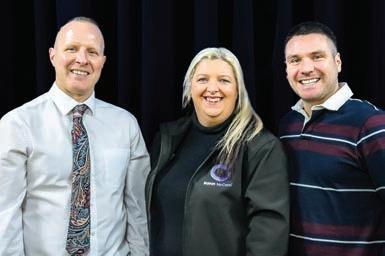
students by providing them with invaluable exposure to the world of work.
“This collaboration is a bridge between academia and the professional realm, ensuring that students acquire academic knowledge and develop essential skills, industry awareness and a sense of purpose.”



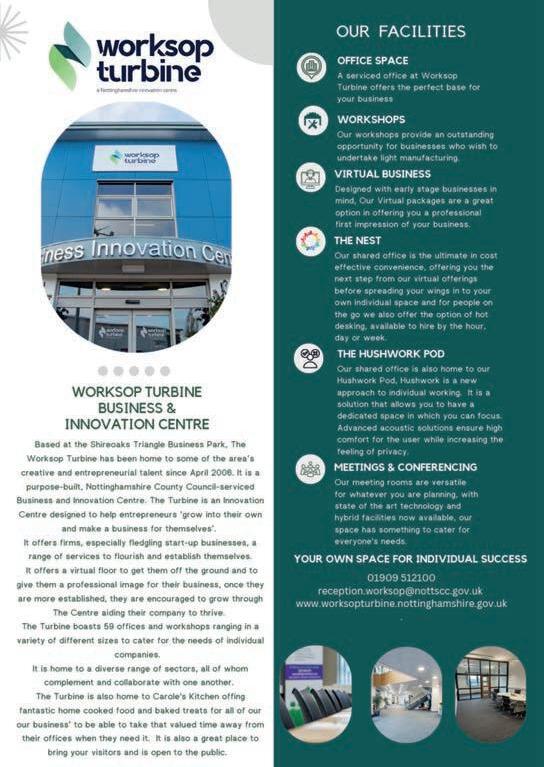


A Derby law firm has added two awards to its trophy cabinet after two of its staff were named among the best lawyers in the city.
Partner Russell Davies and trainee solicitor Amelia Sutcliffe, from Smith Partnership, earned plaudits from their peers when they won their categories at the recent Derby and District Law Society awards.
Russell was named commercial lawyer of the year while Amelia was announced as trainee lawyer of the year at the awards, which took place at the society’s annual dinner and attracted entries from leading firms across the city.
Russell said: “It’s very nice to be recognised by your peers and there are a lot of very good commercial solicitors in Derby, so winning an award like this feels like a real feather in my cap.
“My department has had an extremely busy year and we have completed some good quality work on behalf of some good quality clients.”
The finalists in the 2024 Leicestershire Law Society Awards were announced at a shortlisting event at the Porsche Centre, in Leicester.
Society president Bhumika Parmar, founder and director of BP Legal, gathered judges, sponsors and nominees for the evening where she announced the shortlist across each of the 10 categories.
The eight judges for 2024 are Bhavin Gandhi of Paradigm Wills and Legal Services; Dr Glynis Wright MBE of The Alternative Divorce Company; District Judge Dewinder Birk; Linda Lee of Weightmans; Alan East of De Montfort Law School; District Judge Nahied Asjad; Mehmooda Duke MBE of Moosa Duke; and Steven Evans of University of Leicester.
Bhumika said: “Narrowing down and selecting the finalists for each category is always a challenge, and our judge’s dedication to fairness and excellence is truly commendable.
“We are honoured to have had the privilege of having such esteemed individuals as judges for this year’s Leicestershire Law Society Awards. We are thrilled to celebrate the exceptional achievements of the Leicestershire legal industry and honour those who have made significant contributions to the field.”
The Cirque Du Soleil-themed Leicestershire Law Society Annual Awards 2024 will be held at 7pm on Friday, 17 May at the Athena.
Buy tickets for the Leicestershire Law Society Awards 2024 at leicestershirelawsociety.org.uk
Small Law Firm of the Year
Sponsored by KCH Garden Square
• Fishers Solicitors
• Hollingsworths
• Johnson Astills
• Thaliwal & Veja
• Welland Valley Legal
Trainee / Paralegal of the Year
Sponsored by De Montfort University
• Dionne Willis of Affinity Law
• Lauren Garner of Weightmans
• Sophie Wilson of Smith Partnership
• Tereza Fotiadi of Moosa-Duke Solicitors
• Zainab Girach of Crystal Law Solicitors
Chambers of the Year
Sponsored by Kazzoo IT Solutions
• 2 New Street Chambers
• KCH Garden Square
• New Walk Chambers
• St Mary’s Chambers
• The 36 Group
Large Law Firm of the Year
Sponsored by OWNZ Group
• Excello Law
• Josiah Hincks Solicitors
• Nelsons
• Smith Partnership
• Weightmans
Junior Solicitor of the Year
Sponsored by Holistic Family Mediation and Coaching
• Harpreet Kashb of Parity Legal
• Laurie McAulay of Josiah Hincks Solicitors
• Naomi Bond of Nelsons
• Nathan Mee of Lawson West
• Zainab Zaeem of Runnymede Law
Support Staff of the Year
Sponsored by Bev Sankey Healthy Living Coach
• Apeksha Chohan of Weightmans
• Jack Wood of 2 new Street Chambers
• Mandy Bradbury of Hollingsworths
• Rosemary Craig of Weightmans
• Shabana Abdulla of Smith Partnership
Solicitor of the Year
Sponsored by Trident
• Asema Natha of Weightmans
• Danielle Chetwynd of Duncan Toplis Legal services
• Gina Samuel-Richards of AGR Law
• Rahma Kasim of Weightmans
• Sean Moran of Shakespeare Martineau
Legal Executive of the Year
Sponsored byUniversity of Leicester
• Lisa Franklin of Smith Partnership
• Sue Roberts of Affinity Law
Barrister of the Year
Sponsored by The One Clinic
• Alexandra Scott of 2 New Street Chambers
• Lisa Hardy of 36 Crime at The 36 Group
• Kye Herbert of Leicestershire County Council
• Rhianna Manani of No5 Chambers
• Stephen Taylor of KCH Garden Square
A well-known name on the regional family law scene has launched a new divorce coaching company.
Since leaving the legal profession a year ago
Dr Glynis Wright MBE (pictured) has been putting together plans for a new business called The Alternative Divorce Company (ADC).
The new umbrella company covers a range of independent expert services aimed at helping people who are going through break-ups – from legal and financial support right through to therapeutic help.
She said the overall aim was to help individuals and couples reach consensual, wellinformed agreements during splits which minimised the emotional and financial impact and laid the ground for swift resolution.
Dr Wright has undergone training as a specialist divorce coach since leaving the legal profession which she hopes will help individuals


and couples at every stage of their breakup –equipping them with the means to de-escalate hostile confrontations, manage emotional triggers, stay grounded and to keep communication channels open –as well as protecting any children involved and cutting the costs of lawyers’ fees.
She said ADC also has affiliates with expertise in child and family therapy, marriage guidance counselling and grief and trauma management.
She said the “forward-thinking, collaborative, ethical” business was in line with policy developments such as the new Midlands Private Law Strategy launched in February 2024, which stresses the benefits of out-ofcourt resolution for private child cases wherever possible.
Dr Wright said: “Couples strengthen the likelihood of a civilised break-up if they have access to all of the facts and information they need to make critical decisions in areas such as finance and legals.”


Accessing finance is becoming more difficult for a large number of SMEs, according to new data from the British Chambers of Commerce Insights Unit.
Around half of businesses surveyed who accessed finance said they felt that getting funding had become more challenging over the past three years. Only 13% said it was getting easier.
The BCC’s latest survey of business conditions also suggests that 70% of the 553 firms surveyed – mainly SMEs – have not accessed finance from an external provider in the past 12 months.
Firms with more than 50 employees were more likely to have accessed finance (72%) compared to smaller ones (58%).
BCC policy manager Jonny Haseldine said: “As small and medium sized firms across the UK continue to deal with ongoing economic pressures –accessing crucial finance is really tough. For many SMEs it’s a hurdle too large to even try and tackle.
“In evidence to the Treasury Select Committee last September, we called for urgent action to help SMEs seeking finance. We need to see measures to improve accessibility to finance, better awareness of alternative funding options, and greater competition in banking options.”

An East Midlands business set up to provide “accessible, affordable, efficient and quality assured” healthcare around the world, has secured a £1.3m trade finance package.
Unimed Procurement Services in Leicester has gained the funding from UK Export Finance (UKEF) and Barclays to help it fulfil a delivery of more than 350 ultrasound machines to Latin America and grow its international reach.
Unimed was established by Shameet Thakkar in 2018 to help drive equity in global health and in 2022 won the Queen’s Award for Enterprise.
It helps to improve healthcare around the world by distributing medical supplies to international development agencies, governments, NGOs and research institutions.
To date, it has supplied pharmaceuticals, medical equipment and laboratory supplies to clients in more than 58 countries.
‘These are businesses whose exports support economic growth around the UK’
Managing director Shameet Thakkar said: “I take great pride in Unimed's pivotal role in advancing healthcare worldwide, exemplifying the substantial global influence that Midlands-based enterprises can wield.
“Through our endeavours, we not only foster health equity but also showcase the transformative power of businesses in shaping global health landscapes.
“The indispensable support from UKEF and Barclays has enabled us to seize a significant export opportunity, underscoring their vital contribution to our mission of driving equitable healthcare access on a global scale.
A financing guarantee from UKEF, the government export credit agency, helped Unimed to
secure the Barclays financing package and export to the new market.
UKEF has partnerships in place with Barclays and other lenders so that it can issue government guarantees for up to £10m in a matter of days.
The financing has supported Unimed during a period of strong growth – it now has offices in Shanghai, Cape Town, Mumbai, and Dubai, building a global client base and establishing a diverse supplier and manufacturing network.
UK Export Finance chief executive Tim Reid said: “UKEF’s work supported 450 small and medium-sized businesses last year.
“These are businesses whose exports support economic growth around the UK and help to improve – or in the case of Unimed, even save – lives around the world. Our partnerships with lenders across the UK mean that we can extend a financing lifeline to small businesses looking to trade around the world.”


An academic at Nottingham University Business School has been named on the Innovate Finance Women in Fintech Powerlist for the third time.
Professor Meryem Duygun was previously named on the list in 2022 and 2020, for her significant contributions to the fintech industry.
The list, compiled by Innovate Finance, celebrates senior leaders, marketers and investors, all leading the way in finance and technology innovation.
This year, Professor Duygun has been recognised in the policymakers and regulatory experts category, alongside nine other women, underscoring her commitment to advancing financial inclusion through policy initiatives.
The category highlights women who work in regulation and government affairs and who strive to encourage innovation in their sectors.
Professor Duygun said: “I am deeply honoured to once again be recognised on the Fintech Powerlist, alongside such distinguished individuals.
“This acknowledgment not only celebrates my ongoing dedication to innovation and advancement in
the fintech sector but also underscores the importance of collaborative efforts and diversity in driving meaningful change.
“I am particularly proud of the significant role that INFINITY, the University of Nottingham Inclusive Financial Technology Hub, has played in shaping our collective impact.
“Through INFINITY, we are fostering a culture of inclusivity and pioneering research that is shaping the future of fintech.
“I remain committed to empowering more women and underrepresented groups in FinTech and look forward to continuing our journey towards a more inclusive future together.”
Professor Duygun established the first fintech research network in 2018 and is an endowed chaired professor in risk and insurance, funded by Aviva.
In September 2021 she was conferred the Fellowship of the Academy of Social Sciences, in recognition for the excellence and impact of her work and her wider contributions to the social sciences for public benefit.



4S Business Support aims to empower businesses through strategic outsourcing. We aim to transform your business objectives by utilising our expertise to enhance your operational capabilities and strategic outcomes. Our founding director, Suja Shyamsundar (pictured) comes with more than 17 years of experience in financial services. Her track record speaks for itself, with businesses consistently achieving desired outcomes under her guidance.
First, let’s delve into the need for outsourcing. Does a need even exist?
The answer is yes! Outsourcing – specifically, enabling certain processes/functions of your business to be handled by other specialists –frees you from routine tasks, allowing you to focus on core strategies and client interactions for improved outcomes. Your business will benefit from scalability, reduced overheads, and the access to globally specialised skills and industry knowledge, surpassing the limitations of local hiring. Furthermore, you can utilise global timeframes to operate seamlessly around the clock!
EFFECTIVE OUTSOURCING WITH 4S BUSINESS SUPPORT: OUR TOP FIVE TIPS
1: Define your objectives: Start by clearly defining your goals. This clarity is essential for aligning outsourcing efforts with your business strategy and desired outcomes.
2. Choose the right partner: Partner with a provider that has a proven track record in the financial sector and understands its complexities.
3. Communicate clearly: Maintain open lines of communication with your outsourcing partner. Clear, transparent communication prevents misunderstandings and aligns expectations, workflows, and timelines.
4. Embrace technology: Utilise advanced technologies to enhance efficiency and facilitate smooth collaboration. Our solutions optimise your business processes and integrate effortlessly with your existing systems.
5. Monitor and evaluate: Regularly review and assess the performance of your outsourcing strategy. Continuous monitoring and feedback allow for timely adjustments and improvements, ensuring the outsourcing relationship evolves to meet your changing business needs.
4S Business Support stands out in the outsourcing industry with a unique service offer of fully-managed, exclusive, high-skilled outsourced resources. We provide your organisation with a dedicated team that operates remotely and integrates into your operations. This team is exclusively yours, ensuring no dilution of focus or quality due to sharing resources with other clients.
Our expertise spans a broad spectrum, including IT, financial administration, mortgages, insurance, investment administration support, database management, and client servicing support. This diverse skill set allows us to offer comprehensive solutions tailored to our clients’ multifaceted needs.
Enhanced security: We understand the importance of data security and confidentiality, and we ensure it is maintained for the integrity of your financial operations.
Cost efficiency: Our model provides access to global resources at costs approximately 60% lower than hiring locally. This significant cost reduction is achieved without the burdens of HR expenses, which allows you to reallocate those funds to core business growth areas.
4S Business Support offers a strategic edge through fully-managed outsourcing solutions tailored to your organisation’s needs. We provide a detailed consultation free of charge where we do an in-depth analysis of your processes to see where we can support your growth.
Get in touch for more information: T: 07771 638842
E: suja@4sbusiness-support.co.uk
W: 4sbusiness-support.co.uk

ADerby heart health screening company has secured £25,000 funding from First Enterprise – Enterprise Loans under the British Business Bank’s Start Up Loans programme.
Your Heart Scan will use the funding to buy a specialised machine to launch a new screening service for its clients.
Your Heart Scan provides private diagnostic heart screening for adults six days a week and patients can choose a clinic-based face-toface fitting service for remote ECG monitoring.
Founder Claire Nieuwoudt has more than 25 years’ experience working in NHS cardiology and said she saw a need for people to be able to book private screenings to detect and prevent heart disease.
The funding from First Enterprise – Enterprise Loans is being used to buy a second ultrasound system, which will allow Claire to operate clinics simultaneously and introduce a new stroke screening service.
First Enterprise – Enterprise Loans provides business loans ranging from £500 to £150,000 – funded through regional funds – for start-ups and SMEs that are unable to borrow from traditional high-street lenders.
Claire Nieuwoudt, founder of Your Heart Scan
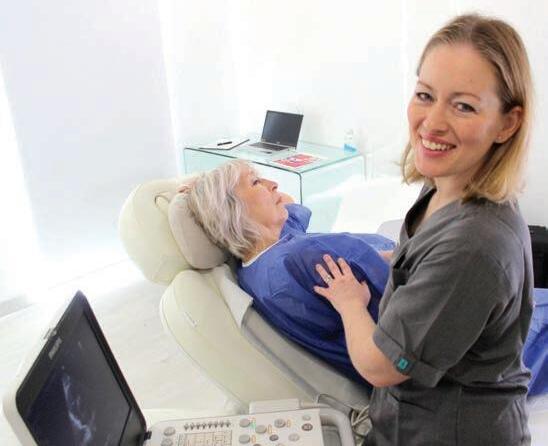
‘The loan was a game-changer, enabling us to acquire a second ultrasound machine’
The not-for-profit organisation reinvests surplus money into loan funds to further support economic growth and job creation in the local communities.
Claire Nieuwoudt said: “The loan was a game-changer, enabling us to acquire a second ultrasound machine


positive opinions about our company.”
Simon Mitchell, investment manager at First Enterprise –Enterprise Loans, said: “We take great pride in being able to support experienced and knowledgeable individuals grow their business and I’m confident that Claire will be able to take her business to new heights with this funding.
“Her business will be a valuable asset for the residents of Derbyshire ensuring they can visit advanced physiologists, with no waiting list, in an exclusive and private setting.”
The loans company is an official business support partner for the British Business Bank’s Start Up Loan Scheme within a network of business support partners, delivering Start Up Loans across the East Midlands, South East Midlands and West Midlands.
for our stroke screening service and simultaneous cardiac clinics. The support was excellent – guidance through every step, prompt answers to questions, and positive feedback during regular calls.
“It’s reassuring to not only have the financial support but also hear
Richard Bearman, managing director of Small Business Lending, British Business Bank said: “We’re delighted that Start Up Loans can support a business such as Your Heart Scan.
“It’s a great business providing an important service and I’m excited to see it’s expanding and getting a new ultrasound system.”



East Midlands Chamber and De Montfort University (DMU) have picked up an award for a new website to highlight skills gaps in the region.
Insight Unlocked uses AI and open-access data to help FE colleges plug skills gaps by identifying supply and demand for different types of roles.
The work is a collaboration between the university and Chamber, through a Knowledge Transfer Partnership (KTP) and supports the Department for Education funded Local Skills Improvement Plan for Leicester and Leicestershire.
Professor David Rae of DMU worked with Chamber data analytics manager Harsh Shah to build the software which won the innovation in education and community category at the 2024 Leicestershire Innovation Awards.
Harsh said: “It was fantastic to
be part of this collaboration and help plug the skills gap in the East Midlands.
‘The technology that’s been created here has tremendous scope for the education sector’
“With this technology we’re able to map skills supply with skills demand and re-align the data with primary input from local businesses to provide collective intelligence on the trends in the economy, taking into account things like qualification levels, job adverts and projections on occupations.
“I feel privileged to have worked alongside the expertise of Professor Rae and DMU to create this product.”
East Midlands Chamber director of policy and insight Chris Hobson
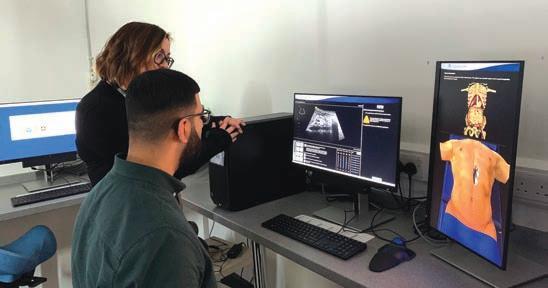
New imaging equipment at the University of Derby is helping future health professionals build their skills and help the NHS grow its workforce and reduce waiting times.
The university has been helped by the Midlands Imaging Training Academy (MITA) NHS England and Intelligent Ultrasound to install some of the most advanced ultrasound teaching resources in the country.
The equipment has been put into the Immersive Simulation Suite at its Kedleston Road site, and will be used by students on the MSc medical ultrasound, BSc diagnostic radiography and undergraduate and postgraduate midwifery courses.
The scanning equipment provides real-time feedback to the students and two realistic patient manikins can replicate a range of conditions and diseases.
Dr Denise Baker, pro vice-chancellor and dean of the university’s College of Health and Social Care, said: “The upgraded facilities will bring significant benefits to our students and existing practitioners, enabling them to develop and refine their imaging skills.”

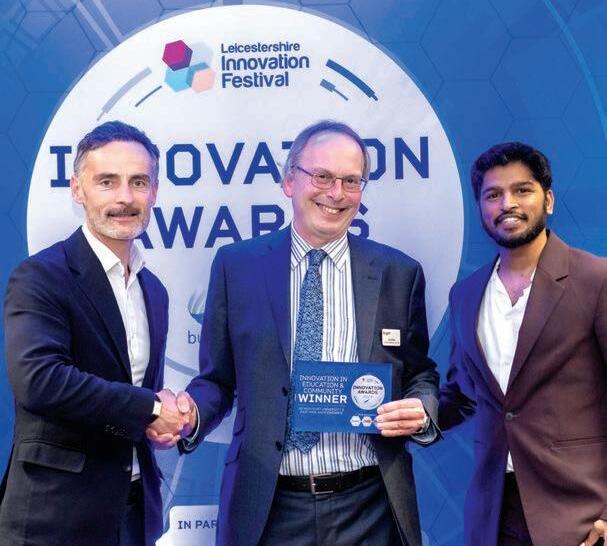
said: “We know that skill shortages are a barrier to business growth in the East Midlands, so I’m delighted to see Insight Unlocked receive this recognition.
“The technology that’s been created here has tremendous scope for the education sector supporting institutions to tailor their syllabus to the needs of local businesses.
“We need to get people into skilled work in the East Midlands, which in turn drives the economy,
and this new product, enabled by DMU and East Midlands Chamber working together through a Knowledge Transfer Partnership, we’ve taken a great step forward.”
The other winners were: Tobias Gould; Camira Fabrics and De Montfort University; The Bug Factory; Bioxhale; Rolls-Royce; Moti Me; Loughborough University; Abacus Flooring Solutions Ltd; Snowball Community; Julian Bowrey and Sue Tilley.
A University of Nottingham student has been recognised for developing a way of helping healthcare workers use Makaton to communicate with patients with learning or communication difficulties.
Third-year learning disability nursing student Ellie Sims, 26, won a national competition – run by Positive Choices and the Makaton Charity – for the work which will now be rolled out across the country to healthcare professionals.
More than 100,000 children and adults use Makaton symbols and signs and the competition was run to promote it within UK healthcare.
Ellie has developed a document containing simple signs and symbols that can be used by anyone to communicate directly with patients using the language programme.
It includes phrases such as “Hello my name is…”, “Do you feel pain?”, and “Are you taking medication?”.
The Makaton Charity has now invested thousands of pounds bringing Ellie’s resource to fruition and it will be launched at the Positive Choices conference in April.

Ellie has used Makaton in daily life since her 10-year-old sister was born with Down’s syndrome. She has also worked in special needs schools and currently coaches a football team in Mansfield for children with learning difficulties.
Ellie said: “As Makaton isn’t taught as a standard to people in healthcare settings, most people don’t know how to use it, and people don’t really have the time to do extra training to combat that issue.
“I hope this quick and easy document will lift the communication barrier that often exists between patients with communication difficulties and healthcare professionals at appointments.”
The first cohort of students at a new Construction Skills Hub have been sharing their experiences with members of the Staveley Town Deal Board.
The students, who started last September, have initially been based at Chesterfield College, but will be moving to the new training hub funded through the Staveley Town Deal.
The Construction Skills Hub is being built on a live construction site in Mastin Moor that is managed by the Devonshire Group and is a key part of Chesterfield Borough Council’s skills action plan.
Chesterfield College and the University of Derby have been appointed to deliver the education programme.
Council leader Councillor Tricia Gilby said: “The hub is a fantastic way of ensuring young people can develop the skills and experience they need to secure a great career here in Staveley.
“It’s a unique way of approaching skills development and I’m pleased that we are working with so many fantastic
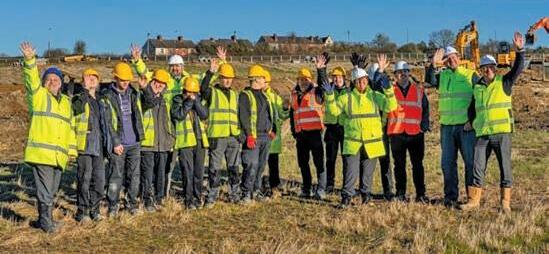
partners to deliver this project, which will help ensure that young people in Staveley get the training and skills they need to have a great career in our borough.”
Gavin Varley, assistant principal for advanced manufacturing and building technologies at Chesterfield Colleges, said: “Experiencing a live site is invaluable experience for our students taking their first steps into working in the construction industry.
“As a college we pride ourselves on serving the needs of our community and unique projects such as this one achieve that on so
many levels.
“Students will experience every single aspect of what goes into a site of this scale meaning they enter this wonderful industry with their eyes wide open to the possibilities and opportunities it can offer them.”
Andrew Byrne, property development director at Devonshire Group, said: “We’re committed to working with local communities and we believe that one of the best ways we can do this is by providing somewhere to train and upskill local people to create long term value for the area.”
Higher education engineering students at a regional college travelled out to Morocco to visit the country’s biggest solar power complex.
The Loughborough College students had a first-hand look at four sites within the solar power complex, offering them a valuable perspective on the future of sustainable energy.
The participants included students doing sustainable engineering higher apprenticeships as well as students taking HNC and HND qualifications.
The trip provided them with exclusive real-world insights into the vast renewable energy infrastructures.
A college spokeswoman said: “Engaging with industry professionals and witnessing the latest technological advancements has enhanced the academic journeys of our learners and equipped them with practical skills for their future careers.
“Beyond the academic aspects, the trip also fostered cultural exchange and sense of personal growth.”
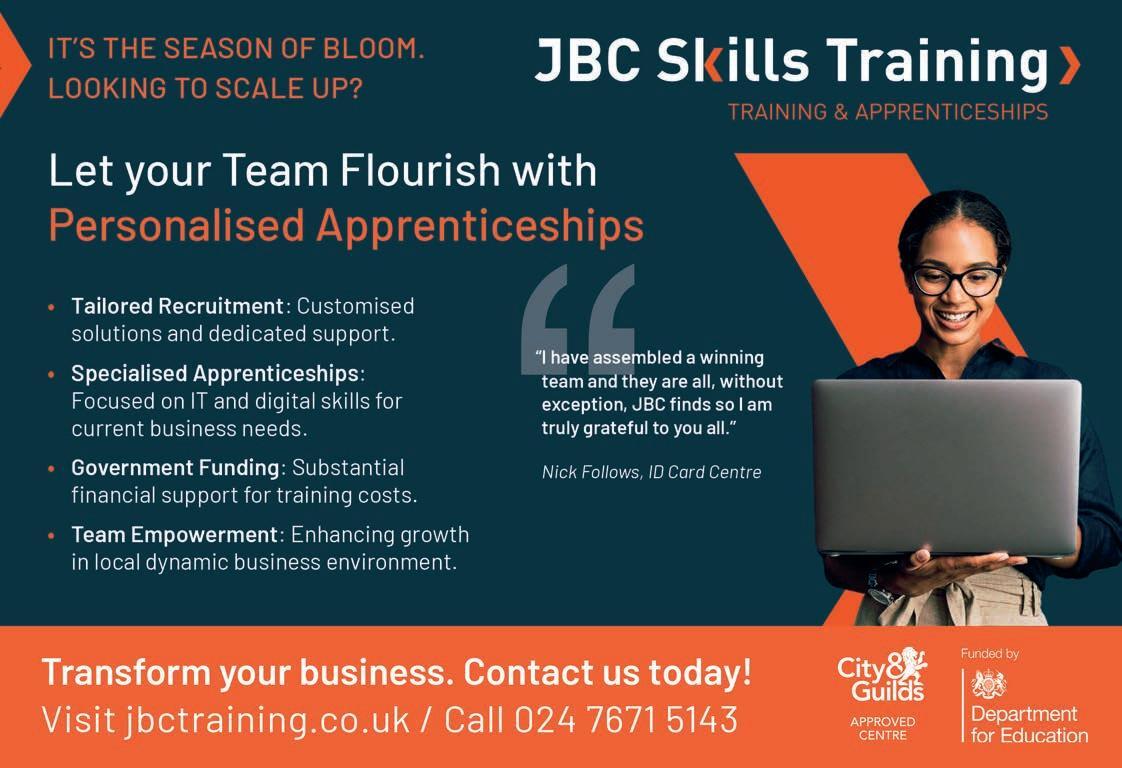

Acommercial property agent has relocated to new offices close to the site of one of the firm’s most memorable deals.
Salloway Property Consultants, which specialises in the sale, letting and management of commercial and industrial property and development land advice, has bought the premises in Royal Scot Road, on Pride Park.
The company was founded by lifelong Derby County fan Stephen Salloway, and was responsible for the sale of the Baseball Ground in the 1990s, paving the way for Pride Park Stadium and the 100,000 sq ft Soccer Dome which it pre-let to JJB Sports.
The new office will allow Salloway to grow the property management side of the business and expand its land development division with both areas becoming increasingly popular with clients.
‘We can sense the resurgence – people want the experience of going out to work’
Managing director Stephen Salloway said: “We have been based on Pride Park since 2005 when we were the very first commercial property agent to move here.
“But of course, our association with Pride Park goes back in further than that with our links to the stadium and soccer dome.
“With such strong links to the area, it seems very fitting that the future of our company is being shaped so close to the site of a deal that was really significant in our history.
“Since then, Pride Park has gone from strength to strength and is
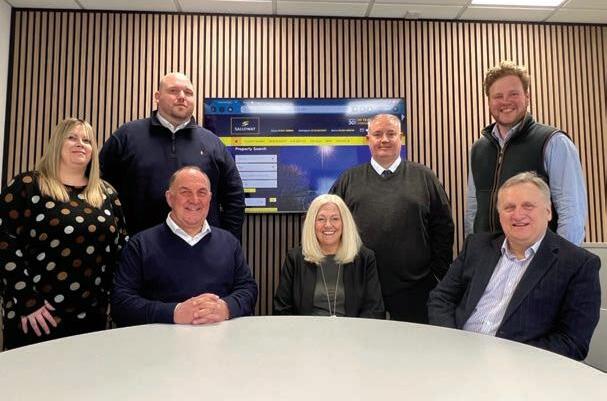
now seen as one of the region’s most successful business parks with a variety business, leisure and residential users sharing the same address in a fully integrated manner. Many of the property enquiries we receive have already determined that Pride Park is their favoured location.
“Obviously Covid was a shock to the market giving rise to the workfrom-home and hybrid-working concepts, but we can sense the resurgence – people want the experience of going out to work.
We feel that with our own staff too which is why we have invested in a new office.”
The new office houses seven members of staff, with four qualified chartered surveyors.
The firm, which also has an office in Burton, is involved in the property sectors across Derbyshire, Staffordshire, Nottinghamshire and Leicestershire.
Stephen was recently shortlisted for an East Midlands Leadership Award organised by The Business Desk.

GCA Consulting Engineers has moved into new offices in a historic Derby city centre building.


Logistics developer GLP has completed work on Magna Park South in Lutterworth, south Leicestershire.
The three final units have gone up covering 388,000, 136,000, and 119,000 sq ft, and bringing to the market a combined footprint of almost 645,000 sq ft.
GLP said it was a key moment for the southern side of Magna Park as it ends a five-year period of construction, which has seen it speculatively develop 11 buildings covering 2.9m sq ft over three phases.
The first phase units were leased to Amazon, Whistl, Movianto and JD.com, while energy supplier Centrica acquired two units on the second phase of the site, for a new national training centre and logistics hub.
Unipart, already a wellestablished business in the park,

took further space to expand its business operations there.
GLP managing director Bruce Topley said: “The completion of Magna Park South is a major milestone for us.
“The park contains some of the most environmentally-responsible warehouses in the country, affirming our commitment to maintaining the highest sustainability credentials.
“The combination of state-ofthe-art facilities, a prime location, and an enviable list of existing and prospective tenants positions Magna Park South for continued long-term success.”
Magna Park covers more than 1,400 acres – including 200 acres of country park – and is recognised as the UK and Europe’s biggest dedicated logistics and distribution park. It has 32 tenants, occupying more than 13m sq ft of space across 49 buildings.
The firm, which offers civil and structural engineering design services for commercial, industrial and residential schemes, has relocated its headquarters to St Helen’s House, in King Street.
The move follows a period of strong growth and development.
Designed by Joseph Pickford, St Helen’s House is a Grade I listed, Georgian building, which was previously home to PKF Smith Cooper, before it relocated to Pride Park in 2022.
It has since been renovated to provide bespoke corporate offices.
GCA has been operating in Derby for almost 50 years, and also has offices in Warwick and Leicester.
The firm has won a series of national awards for landmark projects, including Derby Museum’s multi-award-winning Museum of Making.
James Thomson, managing director at GCA, said “As well as our innovative new-build and commercial work, we have a fantastic portfolio of heritage projects.
“After working on so many Grade I, II and II* Listed projects, moving to such a prestigious building feels absolutely right for the practice. The move mirrors our confidence in the future of the firm.”



Motoring journalist Nick Jones tests
the latest offering from Dacia


Iwas always taught you get what you pay for and in the latest version of Dacia’s small SUV, the Duster, that’s a terrific deal.
If we’re talking value-for-money, you’ll struggle to do any better with a comprehensive package of equipment, not often found in this price range.
There are four versions to be had, mine here is the mid-range ‘Journey’ but the entry-level ‘Essential’ costs just over £17,000 and you get lots of goodies to boot. Spend another £2,500 and the list of features grows considerably.
There are no electric or hybrid versions yet, but both petrol and diesel outputs are to be had, plus an automatic gearbox is an option with the larger engine.
Here then, the one-litre unit stirs 90 horsepower and is just about adequate. It gives you good economy and the classic raised SUV ride-height provides increased visibility.
It projects a robust and almost rugged image, but that’s where it

Dacia Duster TCe 90 4x2 PRICE OTR From £19,895
PERFORMANCE
Top speed: 103 miles per hour
0-60 mph: 13.4 seconds


‘You may have to get the fourwheel-drive version should you wish to go off-road and do some real mud-plugging’


stops as you may have to get the four-wheel-drive version should you wish to go off-road and do some real mud-plugging.
Several tweaks have been engineered in the styling, lighting and aerodynamics plus the emissions are lower now than ever before and the economy has been improved.
Inside, the fit and finish is durable if not luxurious but the seats are surprisingly comfortable, wrapped as they are in new material.
Two new multimedia systems accessed through the centrallymounted 8-inch touchscreen on the dashboard are now available.
Boot space is impressive and the interior has plenty of legroom for passengers and thanks to the high roof, headroom is extended also.
The Dacia gives a good ride, albeit a tad soft, but this is not a car to be driven aggressively.
It’s quiet with little engine noise so overall the experience is more than acceptable, even on longer journeys. Real good value for money here.


Space and man’s quest for space exploration inspire not only awe and wonder but our own efforts to make a difference, says Chamber president Stuart Dawkins
Space – the final frontier… Admit it, if you are above a certain age, could you have resisted the chance to start an article in a space-themed magazine with that phrase? I know I couldn’t.
As luck would have it, I am drafting this the day after a solar-eclipse captivated the attention of a broad sweep of the world. And it got me thinking about the role of space and the sky in our lives.
Let us start with a facet of the topic which is well-explored elsewhere in this magazine. Space as a focus for research and for economic endeavour.
Other than the defence industry, it’s hard to think of a sector that has been the catalyst for so many new developments in human history.
The East Midlands is blessed with positives in this respect, including the National Space Centre in Leicester and the adjacent, economically important, Space Park.
There are other good examples in our three counties too, including much work at our universities and research centres. Indeed, it can be argued that space was the starting point for the whole concept of human economic endeavour.
The earliest surviving examples of mankind pooling resources and labour to productive ends are mostly bound up with astronomy and the astral calendar. Space has made us want to build things and to develop new technologies for many, many thousands of years.
And that focus and effort has often been maintained over long periods. Who knows how long it took to build Stonehenge?
More recently, John F Kennedy’s spoken commitment to putting a man on the moon drove research, manufacturing and science for the decade that was the 1960s.
Business schools still quote the anecdote about the power of NASA’s mission statement back then. You know the one: reporter asks the guy cleaning the floor at NASA what he is doing;


guy replies “I’m helping to put a man on the moon”.
There is a resilience about mankind’s quest to explore space – it captures people’s imagination and keeps it captured.
Space has the ability to inspire. Indeed, more than almost anything else, it has the ability to inspire awe and wonder.
I still remember looking up at the moon, with my late father, one evening as the Apollo XI astronauts were walking on it.
I was not quite seven at the time. More importantly, I still also remember the awe in my father’s voice as we both talked about it.
Living in the middle of Leicester, I only rarely have the opportunity to look up and see the broad sweep of stars in a cloudless night sky.
Those of you nearer to Dark Skies locations, in the Peak District for example, have an advantage over me in that respect.
Wherever you are, the feeling of looking up and seeing stars and stars and stars is – there is no other phrase for it – awe inspiring.
In last month’s magazine I wrote about the
increasing trend in society and politics towards emphasising differences.
Space has the ability to emphasise the opposite, it stresses the togetherness and connectedness of us all.
The many millions who saw the solar eclipse across the world all experienced the same thing from the same, human, perspective.
There has been much written about the impact on human thinking of seeing the first pictures published of the earth as seen from space. The visual representation that we are altogether on this rather small spinning globe. When set against the expanse of space, mankind’s local difficulties can seem small.
Space has also always been a driver of ambition. From Icarus to HG Wells, to Wallace & Gromit, to NASA, to the new privately-owned space businesses, to my two-year-old granddaughter with her toy rocket ship: aiming for the sun, or the moon or the stars has always driven aspiration as well as progress.
What, I hear you thinking, is Stuart going on about this time in a supposedly businessfocused magazine?
Well, for obvious and understandable reasons, we all spend a lot of our time doing the things that we need to do to support our careers, our families, our health, our communities – the commonplace, day-to-day stuff of life.
That is the human condition. But I think, too, that most of us have a bias towards wanting to make a change; to make a difference.
When we are building and steering our businesses, conducting our endeavours, planning and living our lives.
Wouldn’t it be nice to think that we can also each do something that creates a focus, that drives economic endeavour, that inspires, that touches people in a positive way, that brings people together, that shows ambition and resilience? Space does all of that.
Call me a day-dreamer – or a stargazer maybe – but doesn’t that seem not a bad thing to aim for, at least once in a while?

